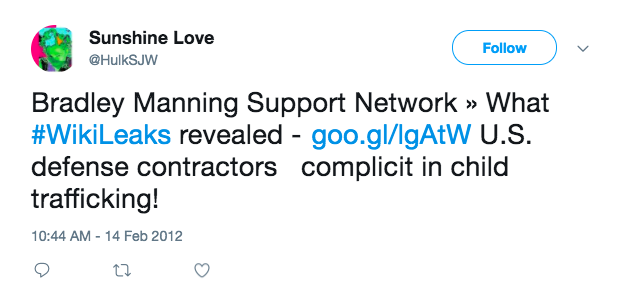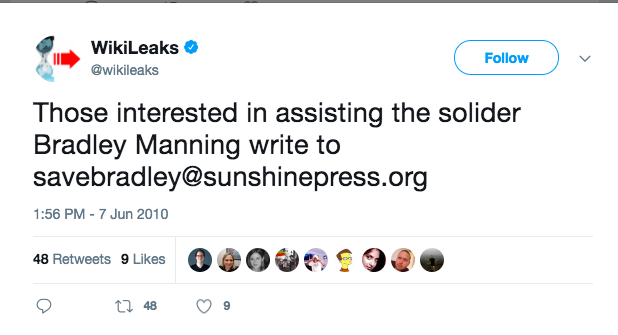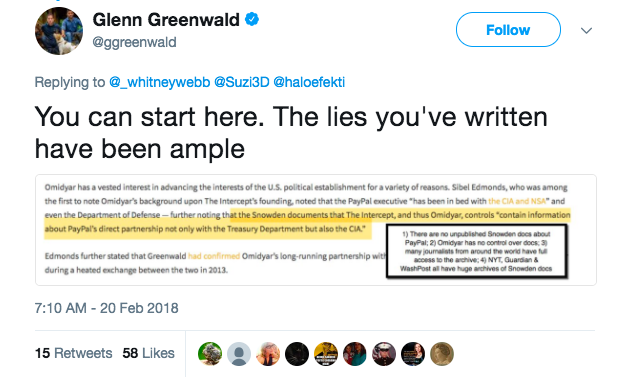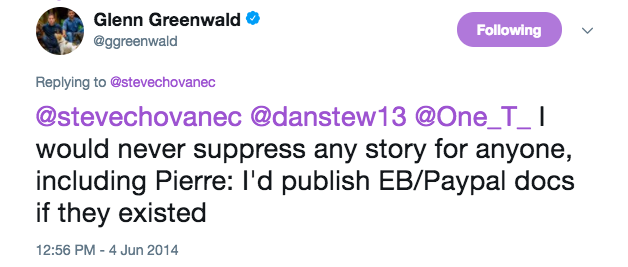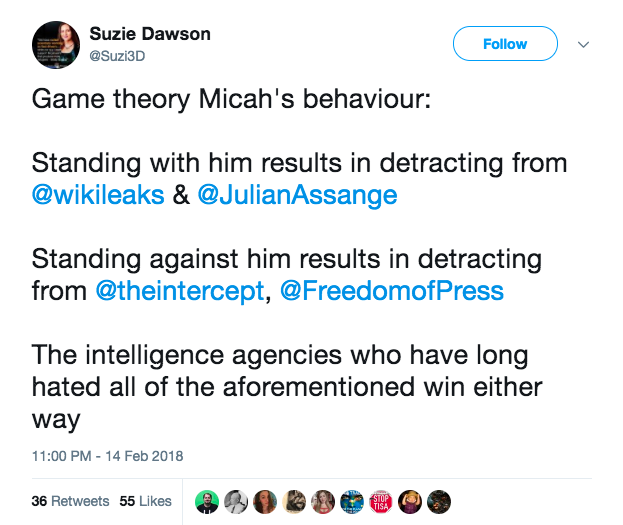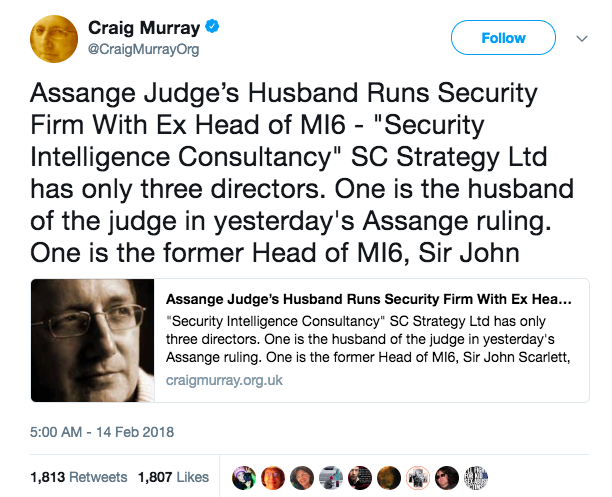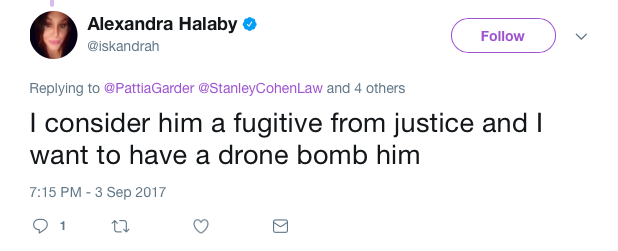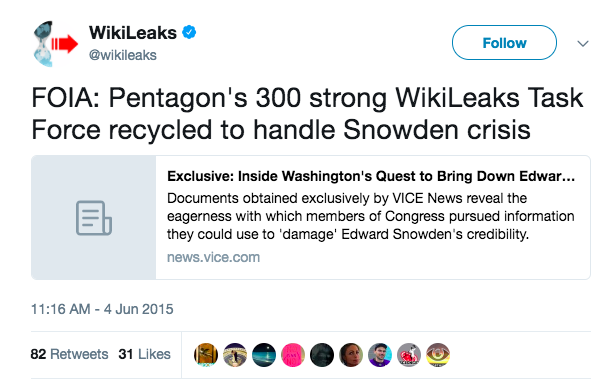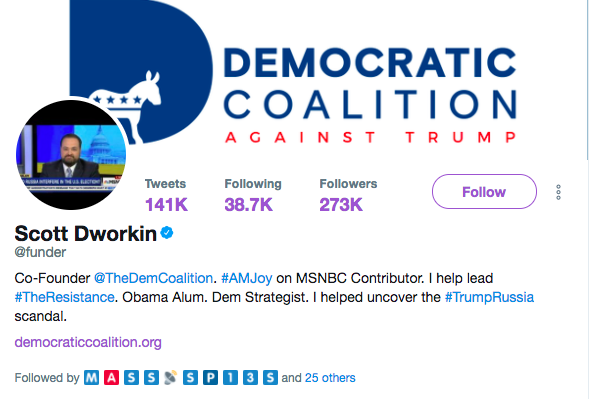Above Photo: annejanethomas/Flickr
Certain journalists would consult an almanac for Washington DC on the night of the 2016 election, and begin this article with a few picturesque, scene-setting words about the chill winds whipping the capital as it lay poised, awaiting the results with bated breath.
But I have more respect for my readers than that.
So I’ll cut to the chase.
That Election
In 2016 an accused serial sexual predator ran for the US presidency against the notoriously corrupt wife of a previously impeached President – who is also an accused serial sexual predator.
That these facts alone were insufficient to invalidate the entire race is testament to the audacity with which corrupt power operates in the West, and how conditioned the public is to consuming the warped byproducts of its naked machinations.
Arguably the most contentious election in recent history, the accused serial sexual predator won.
During the race, WikiLeaks Editor-in-Chief Julian Assange aptly described the two candidates as “cholera vs gonorrhoea.” Edward Snowden ran a Twitter poll asking his followers whether they would rather vote for a “calculating villain”, an “unthinking monster” or “literally anyone else”. 67% chose the latter. Yet those who didn’t want to be forced into a false choice between Clinton or Trump became the forgotten voices, the silent majority; largely excluded from the endless, vapid mainstream media debates about the outcome.
Julian and Edward’s descriptors were flawless metaphors for the Presidential contestants; cartoon-like characters that when paired together and portrayed as a legitimate democratic choice, made a mockery of the entire concept of political representation.
Unfortunately, this sham wasn’t as anomalous as it may appear when viewed in such a simplistic light. The moral failings were business as usual in a modern “democracy”. No matter who had won, the global public was going to be subjected to a continuation of Barack Obama’s blatant lies and populist betrayals of his ‘Hope and Change’ platform.
The contenders for leadership are the reality TV stars (now, quite literally) of an intergenerational revolving political theatre: A four-yearly exercise in mass re-enfranchisement of the public, where two-dimensional aspiring figureheads promise to fulfil the dreams of their populace. You are told that with your vote, your candidate of choice will begin ending wars and bringing transparency to government, investing in infrastructure or asserting human rights and equality for all – yet once elected, the victor turns to the camera, sotto voce, like Kevin Spacey in House of Cards, and says “You didn’t really think I’d do that, did you?”
Meanwhile, the media and the money-power that pull their strings ignore the blatantly obvious and work feverishly to emboss the proceedings with a veneer of credibility. In tandem, government-aligned big data and social media companies are employing ever more loathsome technologies to remodel human history in real time.
This industrialized historical revisionism requires the excoriating of the public reputation of the virtuous, the sanitizing of the compromised, and the constant manipulation of the living memory of both.
These are the core tenets of manufacturing consent. They aren’t just lying to us; they are already preparing the lies they will tell our unborn great-grandchildren.
It is some of those layers of contrived, mainstream bullshit that this article intends to peel back.
At the crux of the issue is a battle of authenticity versus falsehood, on a spectrum. With most of us sandwiched somewhere in between and WikiLeaks front and centre. Because WikiLeaks is the last available vestige of verifiable, unadulterated public truth.
That is why they are hated by those who fear the revelations WikiLeaks facilitates and why WikiLeaks’ public reputation is desecrated every day. It is why their every pillar of support is systematically undermined and why Julian Assange is being ever so slowly murdered in front of our eyes.
We, the people, are the last line of their defenze. Part of protecting WikiLeaks – and ultimately ourselves – is to understand the relentless nature of the psyops employed against them; that the hardships inflicted upon them by the enemies of human progress are not just reputational or financial but physical; that for those waging this thankless war of truth on our behalf, this is a matter of life or death.
And that is why we must push back.
That is why we must tell the truth about them.
Talking A Man To Death
There is something morbidly voyeuristic about the vast majority of the conversations about Julian Assange that are occurring in the activism and journalism worlds of late.
While many of their harshest critics hypocritically profess ideological support for the world’s foremost publisher, too few of us are meaningfully acting to free him. More are tricked, provoked or incentivized into endlessly debating among our social circles what I can only describe as relative frivolities – what Assange said about such and such, or to who; what Assange thinks about this or that, what Assange did or didn’t do – while his body slowly decays in front of the entire world.
By design, these debates create social fissures and fracture points. They amount to both a distraction from the obvious urgency of addressing the larger circumstance of his seemingly inevitable decline and a delaying tactic, creating a pretext that prevents us from acting, and serves to justify our inaction.
Because doing nothing is a tantalizingly easy option. Taking action, requires guts. Blood, sweat and tears.
The lack of cohesive effort to pressure the great powers persecuting Julian coalesce with the absence of meaningful movement-building to achieve it. The lack of unity of purpose to save the life of someone who has himself saved the lives of many others, including some we hold most dear, has us all staring into the abyss of the greatest moral failure of this generation.
What we are collectively playing out is the personification of Bob Marley’s “how long shall they kill our prophets while we stand aside and look?” Except even more perversely, we aren’t just looking. We are, as a community and a society, already dissecting Assange like a cadaver. We are picking over his bones like vultures, while he is still clinging to life.
It is despicable and disgusting to witness.
Stripping The Target
Assange’s story has gone beyond the stuff of books, movies or legend: one man altering the course of media, politics, technology, society, forever.
As if being the target of a Pentagon manhunt in 2010 didn’t put Assange far enough up the deep state shit list, in 2017 WikiLeaks was declared a priority target for the CIA.
Yes, the agency infamous for destroying the lives of millions of people by engaging in every kind of malignant behavior evidenced in human history, including countless assassinations and the active destabilization of dozens of countries, now uses its press conferences to announce that the target they are after is not a despot, not an arms dealer, a war criminal or a drug trafficker – but a publisher.
A journalist.
While the sanctity of the Embassy in which Julian resides remains intact, this is only due to the thin hanging threads of the few remaining respected international laws that govern its existence. In a geopolitical climate in which almost every international covenant has been violated, even this sanctuary provided by the Vienna Convention on Consular Relations and the Ecuadorian people, cannot be taken for granted.
Unable to directly abscond with his physical body in the near term, the powers that have been, for years, overtly threatening Assange’s life have instead turned their attentions to undermining other aspects of his existence: his relationships, his finances, his organizational affiliations, his achievements, his reputation, his ability to communicate and even the internal affairs of the country which has granted him refuge.
Part of the Divide and Conquer playbook is to fracture natural allies. We see this in the determination to sever the relationships between our most significant whistleblowers so that they can never become a united force.
Manning, encouraged to distance herself from Snowden because Snowden didn’t stick around to face charges and/or torture and/or death. Brown, egged on to hate on Assange. On and on it goes.
Bleaching The Record
Part of undermining Assange and WikiLeaks (and indeed, any target) is to deny them any achievement. Narratives are developed and circulated to retrospectively strip them of their accomplishments, to reduce their significance.
We can see this in consistent attempts to diminish WikiLeaks’ efforts to defend and organize in support of Chelsea Manning and other whistleblowers.
But there are some smart exceptions who do not hesitate to give props where it is due.
Alleged UK hacker Lauri Love, who in a historic victory has defeated an attempt to extradite him to the United States, was swift to credit Julian Assange and the Courage Foundation:
Lauri’s homage to those who dedicated years of their life to supporting him is laudable and the effort to emancipate him from the extradition threat has established an important legal precedent.
By contrast, much of the digital history detailing the genesis of the campaign to free Chelsea Manning has vanished. Many of the key contributions of her original supporters have been bleached from the record.
The Twitter accounts @freebradley & @savebradley have been suspended.
The original support campaign websites, standwithbrad.org & bradleymanning.org are both down. Freebradley.org looks like this:
Privatemanning.org looks like this:
Chelsea Manning’s current official support network website has news archives only dating back to 2016. All prior updates have either disappeared or were never copied over to this new site in the first place. A loss of six years of supporter activities, bulletins, actions and updates.
And that’s not all that has vanished. Short links to critically important information like the below, have also been broken. (Some are available through archive services; many are not)
The true story is on WikiLeaks’ Twitter timeline. Starting from the very day that Manning, having been mercilessly betrayed by FBI-snitch Adrian Lamo, was arrested:
Sunshine Press is WikiLeaks’ publishing organization. Proof that from the very moment Manning was detained, WikiLeaks was already mobilizing in support of her.
The Bradley Manning Support Network was soon established:
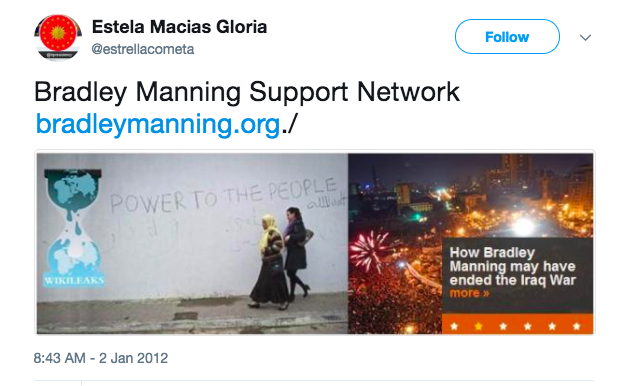
Within days of her arrest, WikiLeaks had launched the first letter-writing campaign in support of Manning – while she was still in a cagein Kuwait:
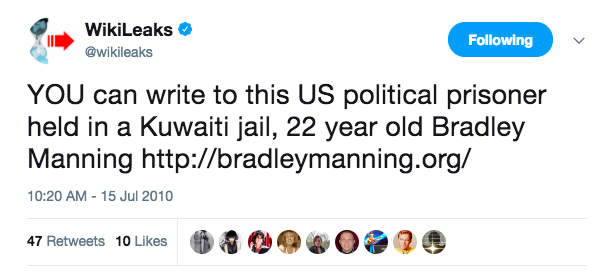
Within less than a week of her arrest, WikiLeaks was already debunking mainstream smears of Manning:
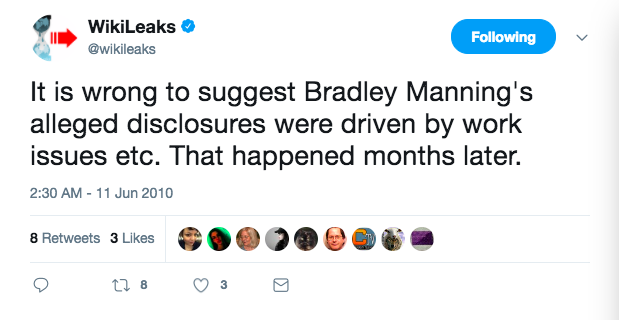
WikiLeaks exceeded what could be expected of any publisher, in its support for its beleaguered alleged source:
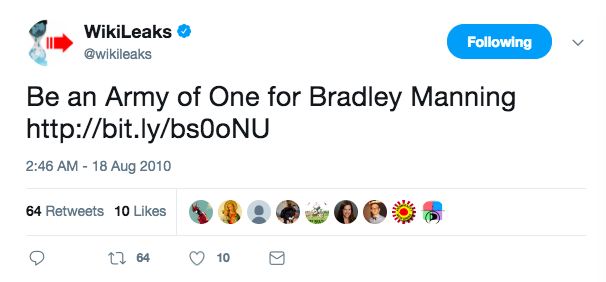
Something I’ve yet to see anyone else piece together: even in the same week in late August 2010 that Julian Assange was in the midst of enduring his own law-fare attacks and ensuing public vilification, WikiLeaks was still relentlessly tweeting out support announcements for Manning:
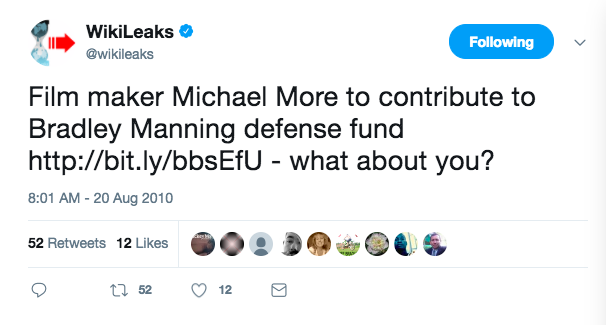
Corporate censorship of the Support Network kicked off early with WikiLeaks reporting in September of 2010 that the 10,300-strong Facebook group for Manning supporters had been blocked by the social media company.
Despite this, a mere three months after WikiLeaks’ establishment of the Support Network, 20 cities were marching in solidarity with the whistleblower:
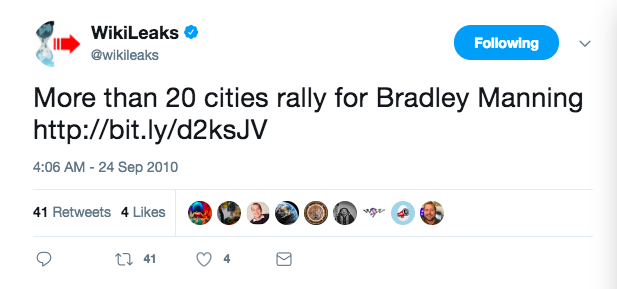
WikiLeaks’ exemplary legal team spoke publicly in defense of Manning:
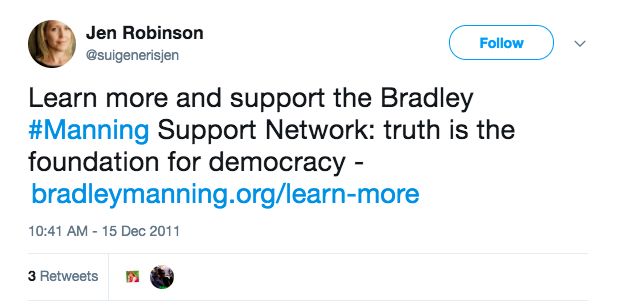
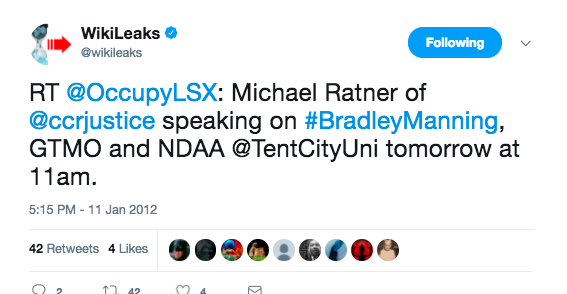
If you thought Paypal and/or Pierre Omidyar were evil for cutting off WikiLeaks’ funding, you will likely be even more enraged to discover that they also subsequently cut funding to Manning’s Support Network:
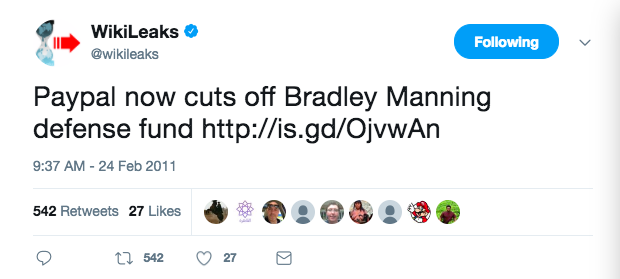
…three weeks after WikiLeaks had been coordinating calls to the White House to free Manning:
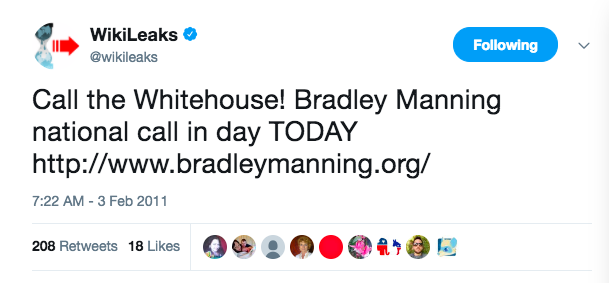
Manning’s lawyer complained that she was not being treated like other prisoners.
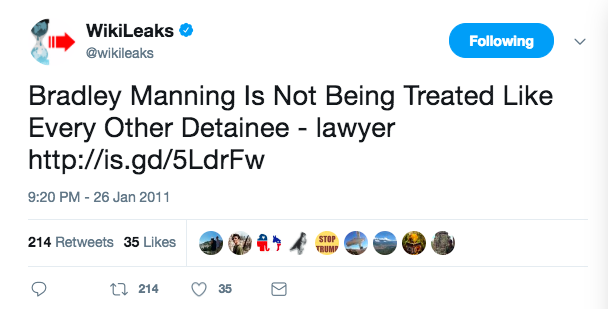
The “special treatment” of Manning by the authorities, eerily foreshadows the case of Julian Assange. Years later, it would be revealed in emails of UK prosecutors obtained by the FOIA requests of Italian journalist Stefania Maurizi, that they told their Swedish counterparts “please do not think that the case is being dealt with as just another extradition request.“
Meanwhile, the Guardian was busy incriminating Manning, long before the trial. Their justification for doing so was the prior betrayal of Manning’s confidence by FBI-informant Adrian Lamo.
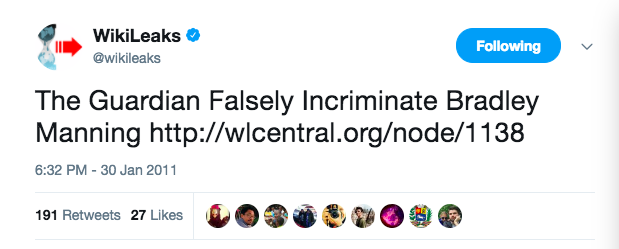
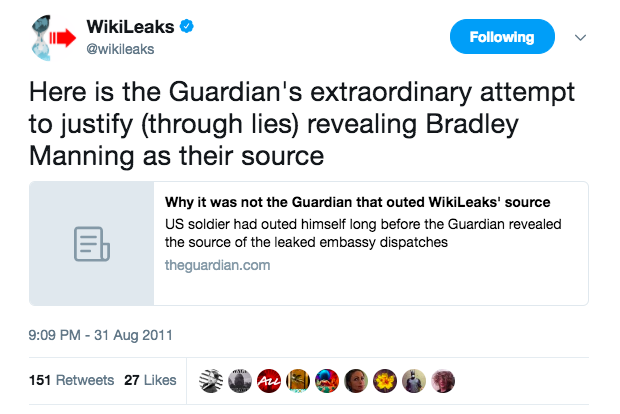
Once WikiLeaks began pushing the #freebrad hashtag, it soon spiraled into countless thousands of tweets. It took me several hours just to read through the 2011-2013 history of the hashtag. The sheer volume of content is overwhelming.
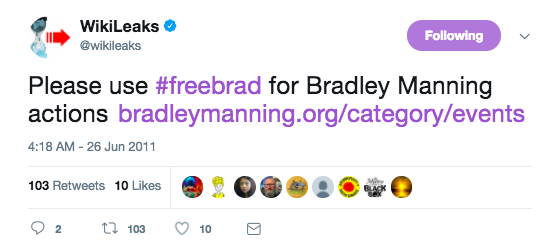
Shortly thereafter, Manning was nominated for the Nobel Peace Prize. WikiLeaks ingeniously kept her in the public consciousness by tallying every single day that she was spending in pre-trial detention.
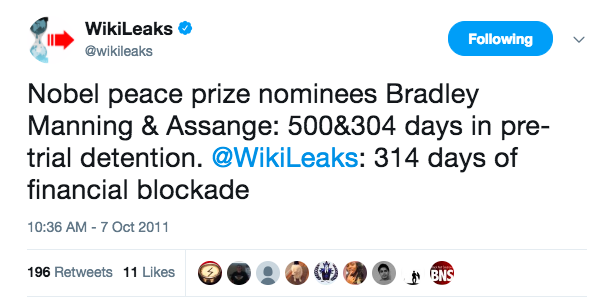
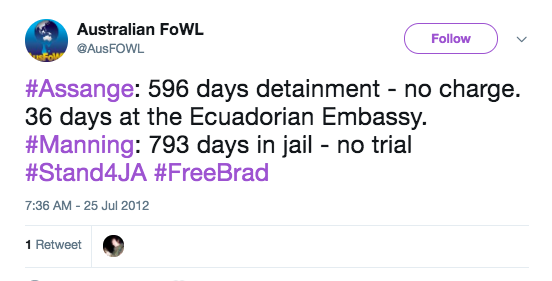
WikiLeaks never misses a chance to achieve an ironic victory: by the end of 2012, they were encouraging people to vote for Manning to become the Guardian’s Person of the Year. Sure enough, they were able to raise enough support for her, and she won:
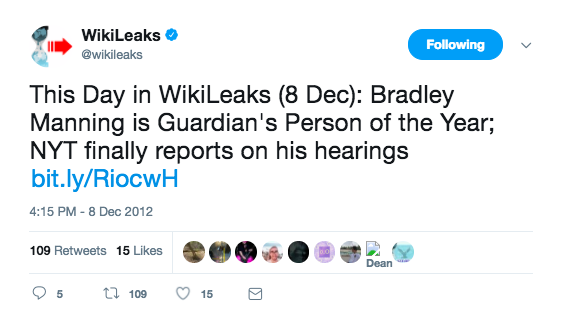
By mid 2012, the Support Network was petitioning Obama directly:
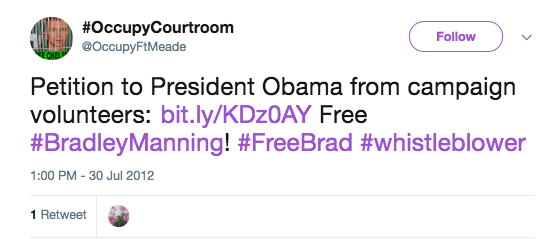
Many of the citizen heroes, journalists, and NGO’s who provided critical support to Manning in these early days have been conveniently forgotten. But in particular, the Twitter history shows that FireDogLake editor Jane Hamsher, reporter Kevin Gozstola, and a host of WikiLeaks satellite volunteers and supporters went above and beyond year in and year out in support of Manning.
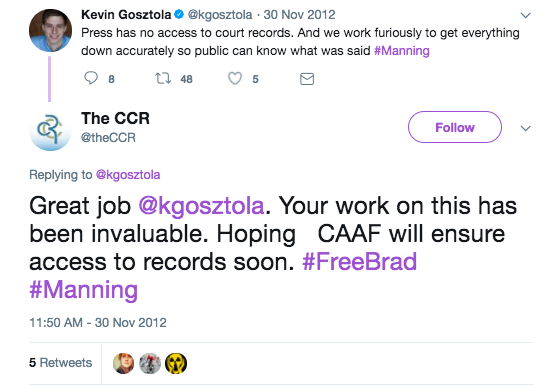
Additionally of note was a continual flow of slick infographics and memes from pro-WikiLeaks designer SomersetBean, right up to the present day.
By January 2013, things were taking a sinister turn. While the Support Network was collectively investing themselves in this noble cause, the FBI were predictably undermining them at every opportunity:
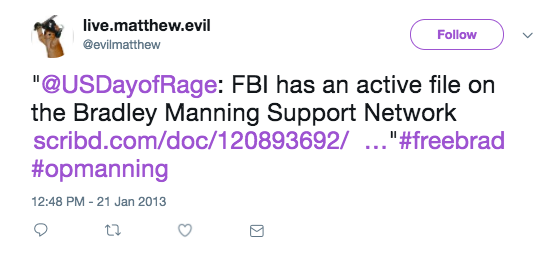
However by February, the rising cacophony of support for Manning, directly attributable to the efforts of the network originally coordinated by WikiLeaks, had grown too loud to be ignored:
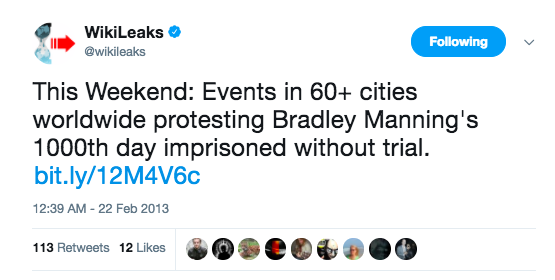
In April of the same year, Manning was again up for the Nobel Peace Prize, this time nominated by 36,000 supporters:
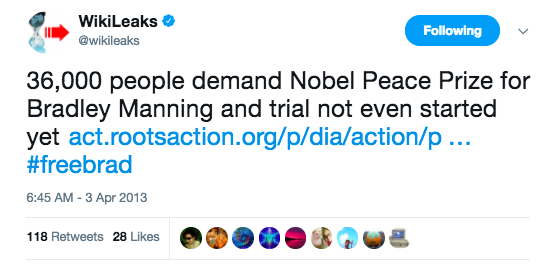
Devastatingly, on July 30th, 2013 Manning was convicted on 20 counts, regardless.
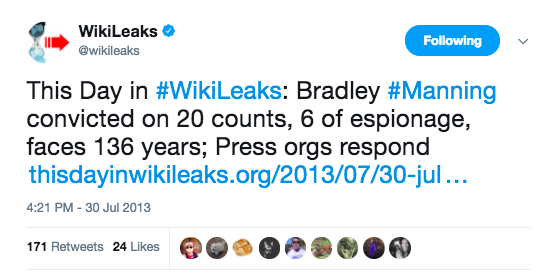
In total, the WikiLeaks main Twitter account sent over 800 tweets in support of Chelsea Manning between the date of her arrest in 2010 and the date of her conviction in 2013. The count only includes tweets containing the search term of the name by which she was known at that time, and only until the conclusion of her trial. References to her as Pfc, or similar, were not included in the search, and thus the calculation of the total. There have been countless hundreds of further supportive tweets by WikiLeaks since.
From what mainstream publication could we expect such a level of dedicated and consistent support for its sources? WikiLeaks’ efforts to free Manning – a source it had not burned – are unprecedented in modern media history, yet this is seldom, if ever, recognized.
In the quasi conclusion to his recent hit piece on WikiLeaks, The Intercept’s Micah Lee (ex-Electronic Frontier Foundation, currently with the Freedom of the Press Foundation) endeavored to further distance Manning from WikiLeaks’ by hammering home the oft-touted quote that Manning had preferred to leak to the New York Times or the Washington Post, rather than to WikiLeaks. Neither mainstream outlet had responded to her attempts to make contact with them.
However, it is highly dubious as to whether either of those organizations, even had they replied, would have achieved the level of reach and global impact for Manning’s leaks that WikiLeaks did. It is equally doubtful that they would have gone out on such a limb to try to limit the damage wreaked upon Manning by the traitorous Lamo. Nor is it likely mainstream media outlets would have committed themselves and their financial resources to a multi-year campaign to build public support for the whistleblower. Likely as not, she would have been left to rot in that cage in Kuwait.
But WikiLeaks’ relationship with Manning and her supporters is not the only legacy to be actively suppressed by Lee, and affiliates.
The Mic Drop
The attempts to posthumously divorce the highly-skilled developer Aaron Swartz and his (now known as) SecureDrop project from Assange, has been an extremely public one.
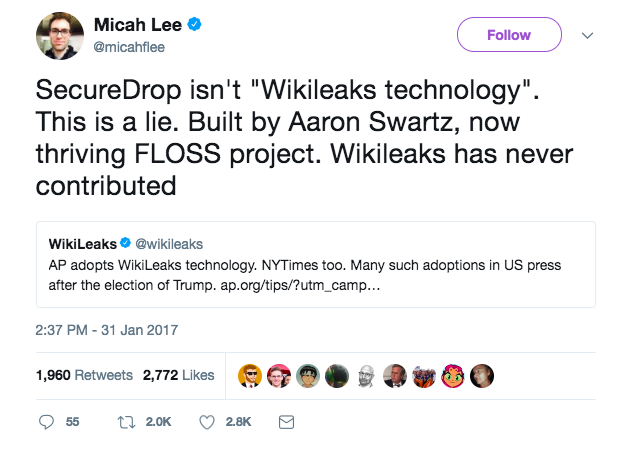
Backtrack a few years before Micah Lee’s above assertion, and you’ll find Freedom of the Press Foundation’s own marketing materials promoted SecureDrop as – wait for it – “A WikiLeaks In Every Newsroom” – titling the launch video for the technology as precisely that.
The opening salvo from the host at their launch event reiterated the point: “This is SecureDrop – a Wikileaks in every newsroom… Freedom of the Press Foundation is a non-profit that was founded in December of 2012. It was originally created as a fancy way of laundering money for WikiLeaks but now it has expanded its scope…”
There was originally no bone of contention about it: WikiLeaks was the inspiration behind the invention of SecureDrop and was the primary beneficiary of the Foundation.
Right up until December 2016, the default tweet generated when donating to the Freedom of the Press Foundation read “I’m supporting uncompromising journalism like @WikiLeaks. Join me and @FreedomofPress in changing the world! Freedom.press”
Even the surviving beneficiaries of SecureDrop, namely Lamo-confidante Kevin Poulsen, and by association, developer Micah Lee (now so keen to sever the concept from its WikiLeaks roots) were originally candid about its genesis.
Micah Lee openly stated that SecureDrop – who acquired the Github repository of Swartz’s pre-existing project known as DeadDrop, then rebranded it – was a way of making WikiLeaks-like tech available to everyone:
“When I first heard about DeadDrop, it seemed like a really fine, exciting project. WikiLeaks was really big in the news then and it seemed like it was kind of democratizing that.” Micah Lee
This is consistent with Kevin Poulsen’s statement that he wanted to standardise the secure drop box technology across all newsrooms:
“There was no standard way for sources to contribute securely tips and documents to a reporter so I wanted to develop a solution and I went to approach Aaron…” Kevin Poulsen
In the wake of the Wall Street Journal’s 2011 attempt to create a secure dropbox, Aaron Swartz was asked on live television “Do you think that WikiLeaks has really changed the playing field over the last year, now we’re seeing this journalism arms race as to who can set up their own leaking site, or I guess alternative, faster?”
He answered: “Oh, clearly, I mean this is a huge vindication for WikiLeaks. We’ve gone from everybody saying that they should be locked up in prison, to the point where every newspaper and news outlet wants to have their own WikiLeaks site.” (emphasis added)
The facts of the matter couldn’t be any more clear: just as Aaron says, WikiLeaks was the reason that news rooms wanted access to the same technology. Just as Micah said, SecureDrop would bring WikiLeaks technology to the world. Just as Kevin Poulsen described in the New Yorker, he needed Aaron to do it, and accessed him via James Dolan.
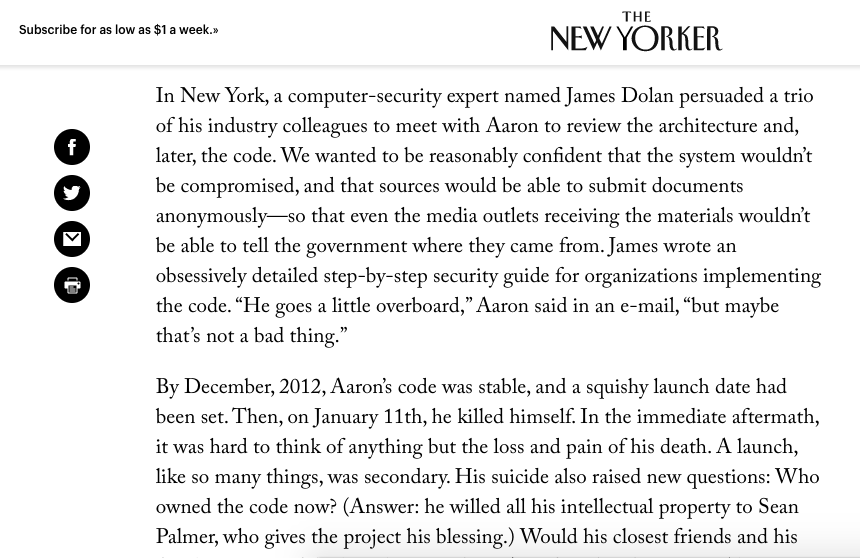
Unfortunately, the two main developers of SecureDrop, Aaron Swartz and James Dolan, are no longer with us. Both are said to have committed suicide. Aaron Swartz was memorialized in an obituary by Kevin Poulsen.
Poulsen is also an ex-Wired reporter and one-time Freedom of the Press Foundation technologist. The circumstances of his brief tenure at the organization, or the reasons for his departure are unknown. His participation is memorialized only by a now-defunct Freedom of the Press staff listing.
More significantly, Poulsen is also the very reporter to whom FBI-snitch Adrian Lamo leaked the private chat logs of Chelsea Manning, leading to her capture and torture.
Lamo had presented himself to Manning as being both a journalist and of all things, a priest, and stated that Manning could therefore be doubly assured of the confidentiality of their communications. An unconscionable betrayal of trust.

Poulsen’s partial reporting of the logs was lambasted by WikiLeaks, by Glenn Greenwald, and also by FireDogLake who analyzed several different versions that found their way into the public sphere, and discovered major discrepancies.
Given these circumstances, one must marvel at the way Poulsen became a self-appointed gatekeeper of Aaron Swartz’s legacy. Especially when he fails to acknowledge the most basic of facts about him: that Aaron was a very public advocate for WikiLeaks up until his death, and a WikiLeaks volunteer.
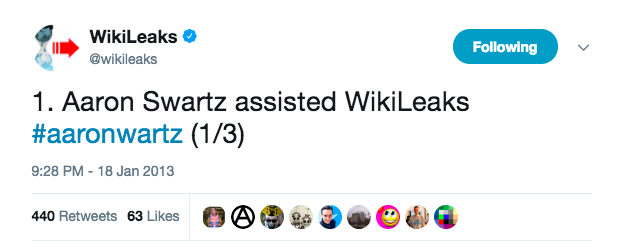
Rewriting History
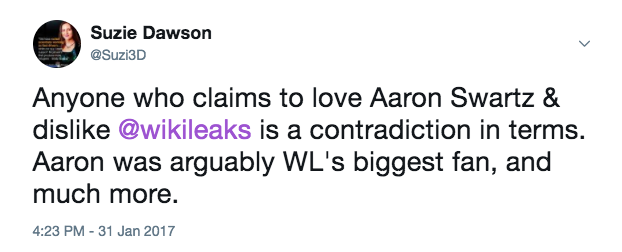
Like Poulsen, others who have survived Aaron Swartz make zero mention of WikiLeaks in their tributes to him.
Some actively deny the affiliation had any impact on Aaron’s work at all: for example, Anil Dash.
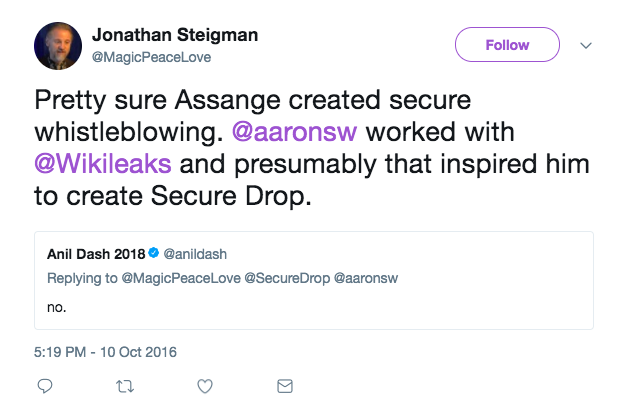
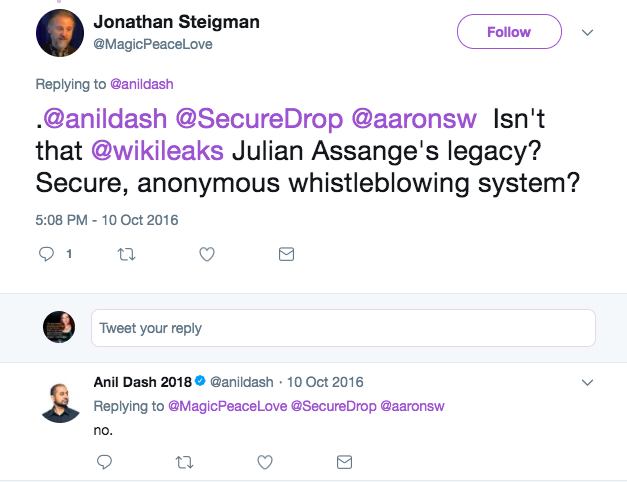
Those who put two and two together are swiftly directed towards Poulsen’s “beautiful” obituary on Aaron, which irregardless of merit has come to serve as an official history.
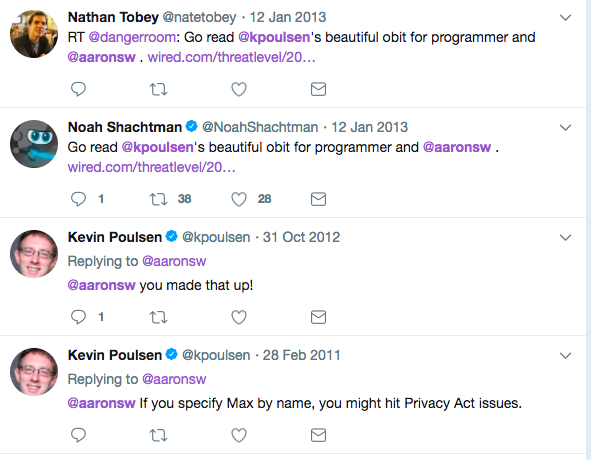
Conveniently, Poulsen’s obituary of Swartz contains zero references to the whistleblowing organisation. (Poulsen has a long and acrimonious history with WikiLeaks, as the latter believes his tailoring of the Lamo-Manning chat log narratives involved a direct attempt to incriminate WikiLeaks by association.) Nor is there any mention of WikiLeaks in Cory Doctorow’s Boing Boing obituary of Swartz.
The Guardian’s obituary also omits the WikiLeaks connection. Likewise does Time Magazine’s. Ditto, the LA Times, The Boston Globe, The Economist, The Telegraph and the New York Times.
All of the aforementioned placed the blame for Aaron’s death solely on the stress arising from the DOJ investigation into Swartz’s penetration of the JSTOR database at MIT. There is no mention whatsoever of any preceding status as a person of interest to the intelligence agencies targeting WikiLeaks.
Aaron appeared 13 times on RT, often engaging in outspoken public praise for WikiLeaks. Throughout the time period that the publisher was the subject of a worldwide manhunt and an “all of Government” investigation of “unprecedented scale and nature.” This continually goes unmentioned.
Only Rolling Stone names WikiLeaks at all – and very briefly. “WikiLeaks claimed him as an ally”, they wrote of Swartz. Yet it was Swartz who had repeatedly and profusely pronounced himself to be an ally of WikiLeaks, long prior to the JSTOR penetration that became the official reasoning for the relentless persecution of him by law enforcement authorities.
The net effect is not merely to render WikiLeaks irrelevant to the narrative retelling of Aaron’s life – but to divert the spotlight from being shone upon the intelligence agencies that were hunting WikiLeaks staff and supporters around the world. The public is instead schooled to believe that the FBI’s interest in him was all about the MIT case.
Public rage at Aaron Swartz’s untimely passing was therefore directed at the university and the Department of Justice prosecutors, rather than the US intelligence community as a whole. The mainstream obliteration of Swartz’s WikiLeaks connections conceals an important contributing factor in the circumstances leading up to his death.
I have confirmed with WikiLeaks that Aaron wasn’t just a fan, a supporter, or a public advocate.
He was working directly with them.
But I already knew this, because of insights gained from yet another WikiLeaks volunteer, the significance of whose work and legacy is also being expunged from the public record. In this instance, while he is still alive.
Jacob Appelbaum.
The Forgotten History
At the Aaron Swartz Day Hackathon in 2015, Jacob Applebaum gave vital testimony about his contact with Aaron, and their relationship with WikiLeaks. He spoke of a history that has been all but erased; the real reasons Aaron Swartz was an enemy of the State. Sure enough, it wasn’t because he downloaded documents from JSTOR.
“Aaron and I worked on a few different overlapping projects and I very much respected him. Some of the topics that came up were light but some were very heavy and very serious. The topic of WikiLeaks was important to both of us. In November of 2009, long before I was public about my work with WikiLeaks, I introduced Aaron to someone at WikiLeaks who shall remain unnamed. If we had a secure, easy way to communicate, if some sort of communication system had existed that reduced or eliminated metadata, I probably could have done so without a trace. But we didn’t. You’re not the first to know – the FBI and the NSA already know. Less than a year later, Aaron sent me an email that made it clear how he felt. That email in its entirety is straightforward and his lack of encryption was intentional. On July 10th, 2010, he wrote “Just FYI – let me know if there’s anything ever that I can do for WikiLeaks.” Did that email cast Aaron as an enemy of the state? Did Aaron worry? 2010 was an extremely rough year. The US government against everyone – the investigation of everyone associated with WikiLeaks – stepped up. So many people in Boston were targeted that it was effectively impossible to find a lawyer without a conflict. Everyone was scared. A cold wave passed over everything and it was followed by hardened hearts for many… the sense of paranoia was overwhelming but prudent. The overbearing feeling of coming oppression was crushing… all of us felt that our days were numbered in some sense. Grand juries, looming indictments, threats, political blacklisting. None of us felt free to speak to one another about anything…
Shortly after Aaron was found WikiLeaks disclosed three facts: Aaron assisted WikiLeaks. Aaron communicated with Julian and others during 2010 and 2011. And Aaron may have even been a source. I do not believe that these issues are unrelated to Aaron’s persecution and it is clear that the heavy-handed US prosecution pushed Aaron to take his own life. How sad that he was abandoned by so many in his time of need. Is it really the case that there was no link? Is it really the case that the US prosecutors went after Aaron so harshly because of a couple of Python scripts and some PDFs? No, clearly not…
When we learned more details about the US prosecutors, we learned that they considered Aaron a dangerous radical for unspecified reasons…” – Jacob Applebaum
As well as the key revelation that Aaron offered his services to WikiLeaks, a mere one month prior to the commencement of the DoD manhunt, Jacob makes some other very important points.
Firstly: When considering all of this forgotten history, be it the Manning support, Aaron’s work for WikiLeaks, WikiLeaks being the inspiration for SecureDrop, Julian Assange having been involved in founding the Freedom of the Press Foundation, (another fact denied by Micah Lee) or other related factors, one must understand that the FBI, the CIA and the NSA know full well the significance of WikiLeaks, their true legacy and their very real accomplishments.
That’s why WikiLeaks and anyone associated with them are targeted. That is why the truth is obscured or outright expunged.
The public are subjected to this whitewashed historical record, to prevent them from discovering the full extent to which WikiLeaks deserves our praise and support. The true historical record exists within the databases of the intelligence agencies and is hoarded by the elite, who then seek to manufacture a new public reality.
Fast forward to the same Aaron Swartz Day event in 2017 and confirmed NSA XKeyscore and FBI target Jacob Appelbaum does not appear. He is now persona non grata, excommunicated from the activism community after being the subject of a sexual assault scandal that is eerily reminiscent of the accusations made against Julian Assange.
Subverting The Legacy
It is only once the target is neutralized, be it via institutionalization, capitulation, character assassination or death (whichever comes soonest) that their legacy may be allowed to be partly acknowledged and restored. Albeit only so it can be co-opted and massaged to suit the agenda of the neutralizing force.
The revolutionary rock-rap act Rage Against The Machine voiced fragments of FBI texts from the Cointelpro files in their hit song ‘Wake Up’ in 1991. This later became the theme track to the Matrix movies.
The recording features a looped voice mimicking an FBI agent stating: “Through counter-intelligence, it should be possible to pinpoint potential troublemakers and neutralize them.”
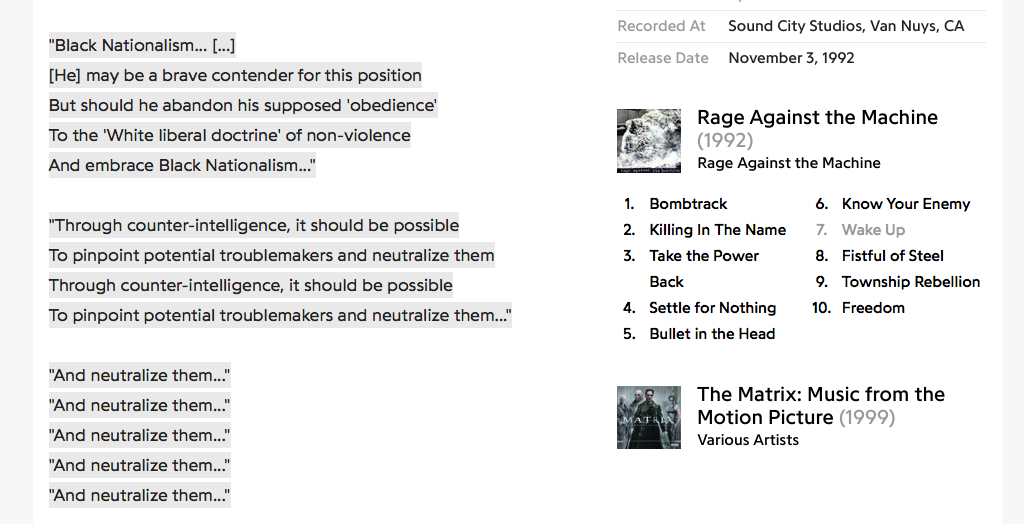
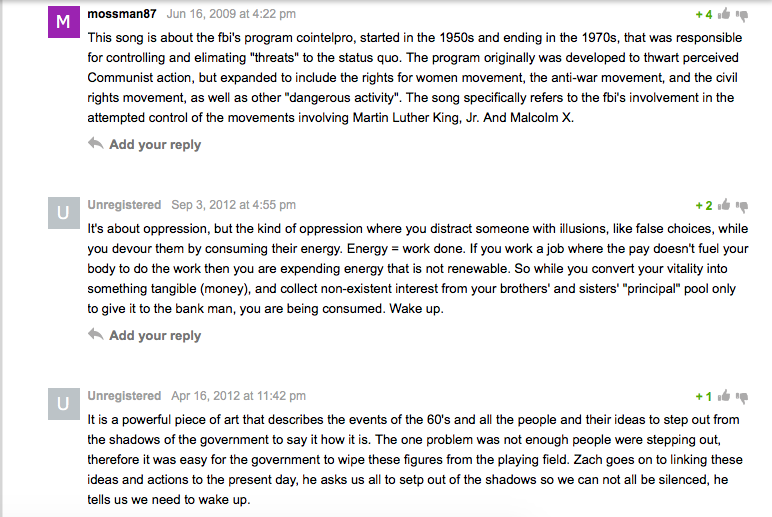

This was the doctrine employed against Dr. Martin Luther King Jr, Malcolm X and Nelson Mandela, among countless others.
As Nobel Peace Prize nominee David Swanson pointed out during an #AntiSpyBill episode in 2017, and as was later ratified by Cynthia McKinney in that same series, Dr. King was not merely the civil rights activist and organizer that we are encouraged to remember him as. He was in fact an ardent anti-war, anti-militarism, anti-imperialism and anti-capitalist activist.
By acknowledging only one component of his work and instituting a national holiday to “celebrate” that limited aspect, his memory has been both sanitized and co-opted by the establishment.
Rather than recognize that King stood against absolutely everything that the status quo is, they are able to pretend he just took issue with one facet of society and argue that the US has progressed as a direct result. In reality, the overwhelming majority of the problems King dedicated his life to addressing have not been bettered, but in fact worsened in the passage of time since the State who now celebrates his memory, killed him. Such as systemic economic inequality, mass incarceration, the rise of the military-industrial complex, and Washington’s bull-in-a-china-shop foreign policy.
If we do not recognize these tactics, this is what we can expect to see play out again, and again, with the memories of our present day heroes. We have already seen this with Swartz; if we do not identify the process of sanitization as it is occurring and intervene accordingly, the day will come when we will see it with Snowden, and with Julian Assange.
The Black Widow
It didn’t take much digging to find the connections between the self-appointed gatekeepers of Aaron Swartz’s legacy and the agenda to divorce it from WikiLeaks.
That agenda aligns with their priority task of denying WikiLeaks was the inspiration for SecureDrop.
Meet Quinn Norton, Aaron’s long-time ex-partner. Quinn is a journalist and also authored her own take on Aaron’s death.
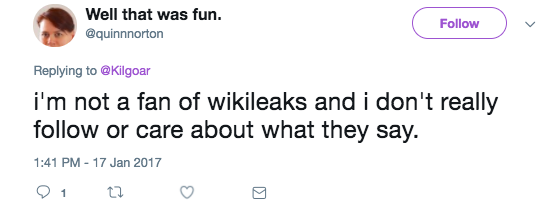
Quinn has tweeted about WikiLeaks approximately 140 times, about 65 of which were derogatory in nature. She has named Julian Assange 40 times in her tweets, about 22 of which were also derogatory.
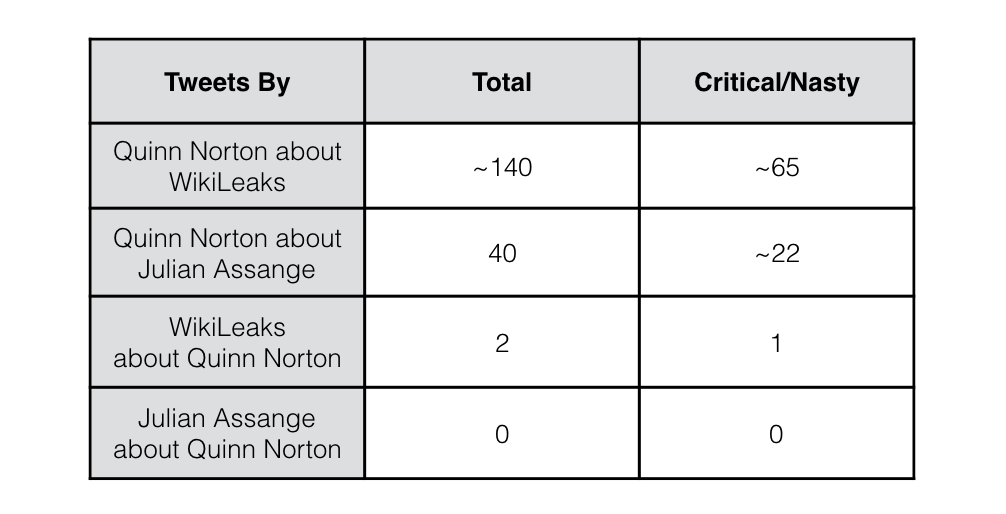
Despite the secretive nature of Aaron and WikiLeaks work, Quinn has long postured herself as an eye-witness due to her proximity to Aaron.
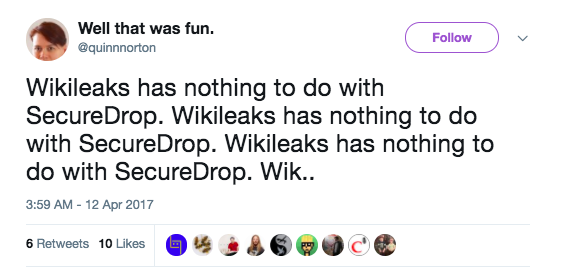
Even when directly called on the obvious, Norton was insistent that the mainstream media’s adoption of secure whistleblowing platforms was not derived from WikiLeaks’ famously having implemented their own secure whistleblowing platform first.
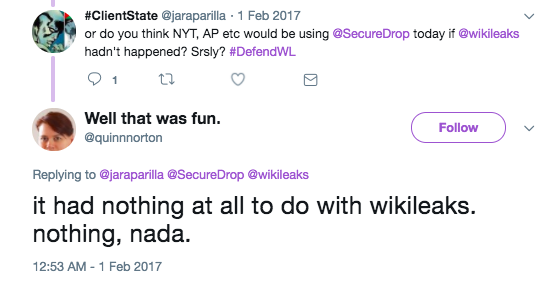
One might assume that she was simply guarding the legacy of Swartz, not wanting to detract from his memory or deny him full credit for his work on SecureDrop.
But to the contrary, she has frequently described the posthumous coverage of Swartz as unduly favorable.
It is not often that you see a loved one of the dearly departed complain that the public memory of them makes them look too good.
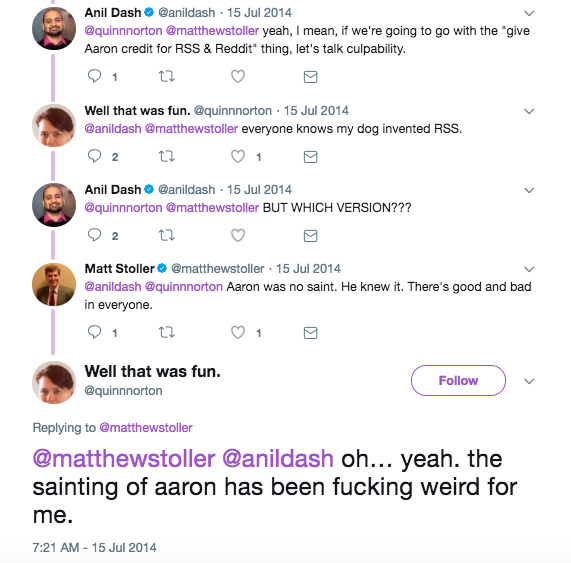
She complained bitterly of Aaron having been raised up as an icon by the infosec community.
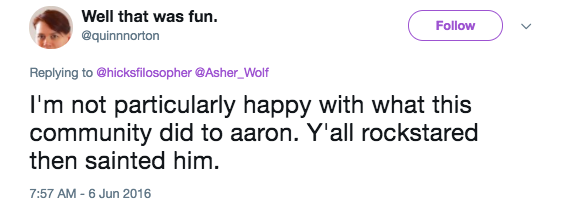
As quoted earlier in this article, Jacob Appelbaum suggested that Aaron Swartz was not only a WikiLeaks volunteer and advocate, but a source. Others have also suggested this in the past, and the possibility has been acknowledged by WikiLeaks themselves: that his submissions were done in such a way that he could not be identified as the source, but given the nature of what was leaked and his closeness to the organization, it cannot be ruled out.
Quinn, however, is adamant that despite Aaron’s life work being in support of the public’s right to know, that he was not a whistleblower.
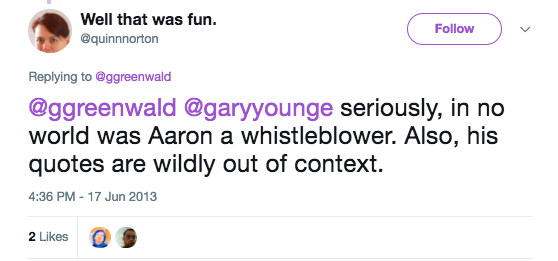
In the heat of WikiLeaks’ organizing efforts for the Manning Support Network, Quinn was being utilized in the effort to rehabilitate FBI-snitch Adrian Lamo’s image within the activism community.
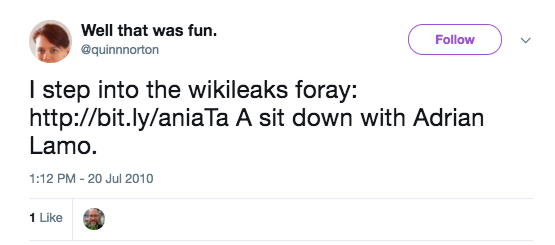
The core of her interview with the informant Adrian Lamo contained a claim by Lamo that Poulsen cherry-picked the Manning chat logs in order to protect Manning. Ironically, the interview was conducted while Manning was being tortured in a cage in Kuwait as a direct result of Lamo’s actions.
Lamo additionally claims to have supplied WikiLeaks with a portion of the chat logs which then showed up at Aaron Swartz’s friend Cory Doctorow’s publication Boing Boing, in an article published by Boing Boing co-Founder and ex-board member of the Freedom of the Press Foundation, Xeni Jardin. Norton writes that Jardin would not confirm her source, but I have confirmed with WikiLeaks that this never happened: Lamo did not, as he claims, submit WikiLeaks the logs, and they did not pass any to Jardin or Boing Boing.
While Norton became a conduit for circulation of Lamo’s disinformation, by contrast Aaron Swartz’s activism organization Demand Progress was running a campaign to support WikiLeaks in the same year.
This is another incredible reference point in the excision of Swartz’s devotion to WikiLeaks from his public image.
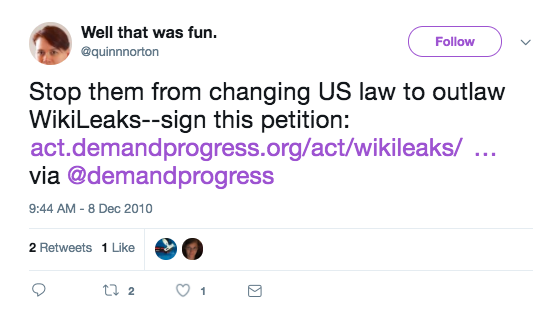
Norton’s acidic commentary about Swartz, Assange and Manning, in the direct wake of Aaron’s passing, was raising eyebrows in the community.
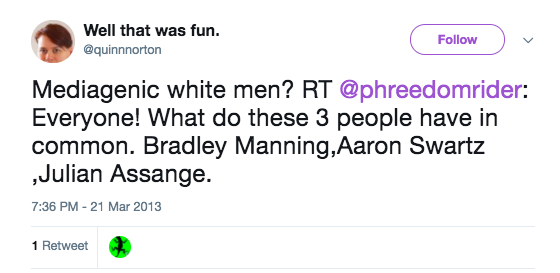
But the real reason for the widespread scorn of Norton had been the revelation that she had cooperated with authorities and signed an immunity deal to inform on her then-partner Aaron Swartz.
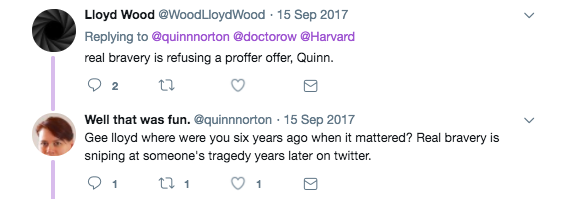
Aaron’s family, who “never liked [Norton]“, were livid.
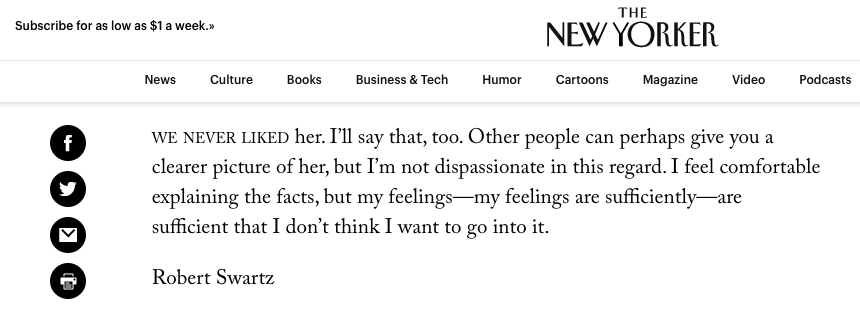
Aaron’s father, Robert Swartz told Larissa MacFarquhar from the New Yorker that Quinn’s betrayal had been devastating for Aaron, who tried to defend her to his family, regardless.
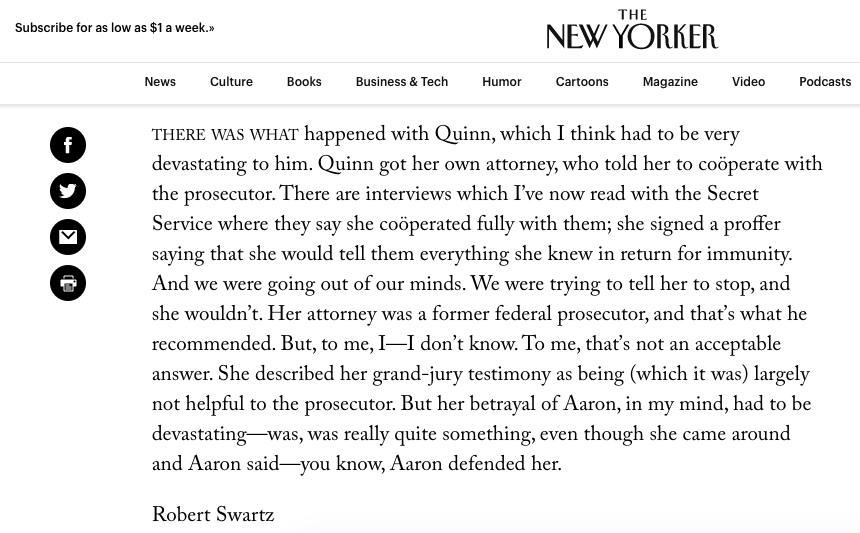
While Swartz’s family were told that Norton’s grand jury testimony hadn’t been of help to the prosecution, and Norton recounts that part of the story in great detail in this article, she also admits how damaging her prior cooperation with the prosecutor had been to Swartz.
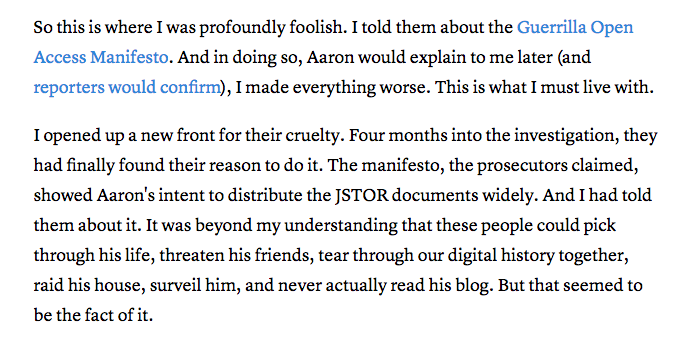

Quinn, for her part, blames her lawyer for her caving to the pressure from authorities. Despite the fact that she was never charged with anything, and cooperated voluntarily.
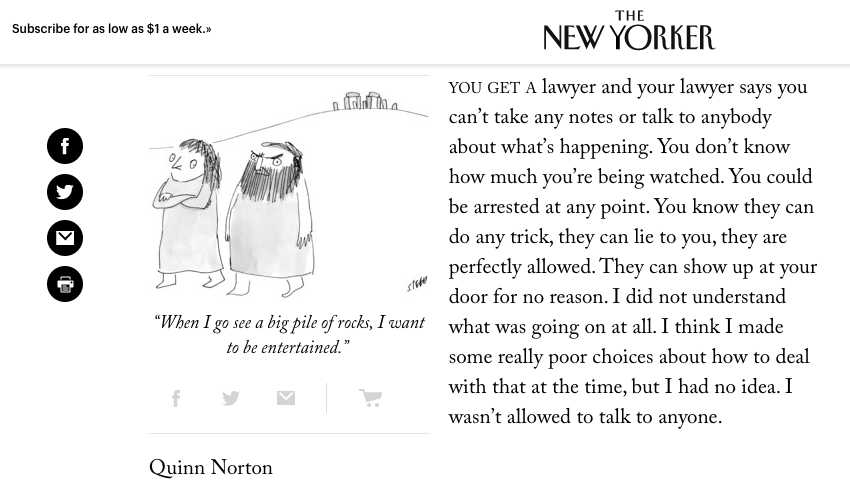
Norton repeatedly describes herself as a technology journalist guarding sensitive sources that she was eager to protect.

Norton doesn’t adequately explain why if that were the case, she did not know to never ever talk to the authorities without lawyers present, let alone allow them in to her apartment for an informal chat, as she did with the Secret Service. Despite claiming to have already come to “expect raids, surveillance, and threats from powerful men who couldn’t tell the good guys from the bad in my world”she states only that she was “shocked and unsure”:

Ultimately, her relationship with Swartz didn’t survive the egregious breaches of trust and the two parted ways.
After Aaron’s death, Norton shared this statement by Aaron’s subsequent partner, Taren Stinebrickner-Kauffman.
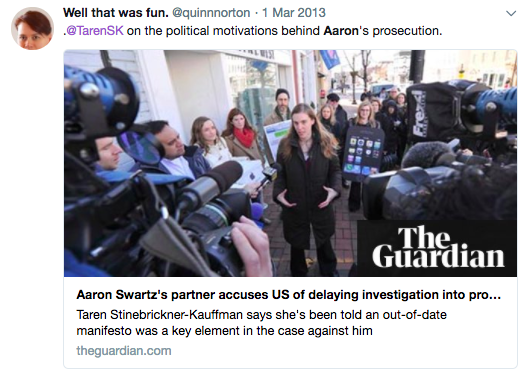
Where self-interest and lack of empathy converge, ignorance abounds. Aaron is not the only truth-teller that Norton views unsympathetically:
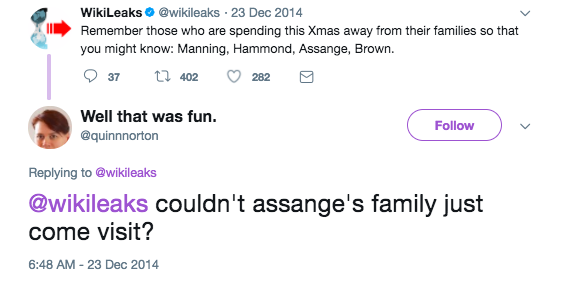
Norton clearly made a positive impression on Lamo, whose Medium account shows him “clapping” on her work as recently as October 2017. Indeed, to this day, Norton still advocates on behalf of Kevin Poulsen over his Lamo collaboration. In a recent, bizarre Twitter diatribe Norton states her belief that Glenn Greenwald should apologize to Poulsen. Glenn had publicly sought to hold Wired to account over the filleted Manning chat logs.
But why would Poulsen be owed an apology? Greenwald’s sleuthing had long since confirmed that “substantial portions” of the logs withheld by Poulsen and Wired contained “vital context and information about what actually happened.“
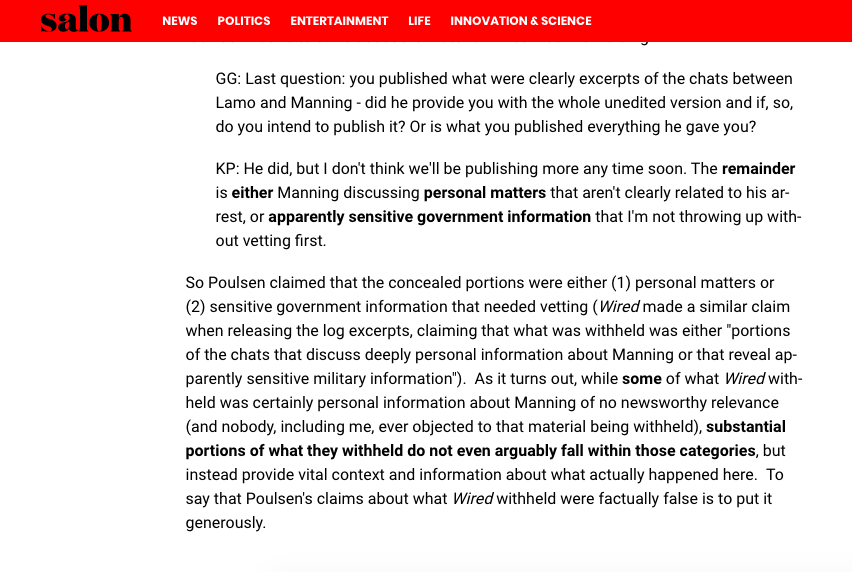
The long-winded premise for Norton’s ire is beyond strange: she accuses Greenwald of being like a “respectable gay from the 80s and 90s…” who she claims were biased against bisexual and transgender people.
This despite Greenwald having in reality, been salubrious in print over Manning’s epic display of courage in coming out as a transgender woman the day after her sentencing in 2013.
Since the day it was announced, Greenwald has displayed unwavering support of Manning’s transition. Norton’s attacks on him are illogical and unsound.
This type of hysteria is common amongst WikiLeaks’ most high-profile detractors. The thread that binds them is a combination of betrayal and benefit.
A period of initial ideological support is required in order to make the betrayal effective. The benefit can be measured both economically, and in the ultimate currency of the energy vampire: attention.
A Beginners Guide To E-Drama
More than ever before we are not only schooled but actively incentivised to loathe Julian Assange. To mock him, malign him, judge him. In certain circles, you can gain significant amounts of social credit simply by being willing to engage in a giant circle jerk of anti-Assange mud-slinging.
The lack of empathy for the seriousness of Julian’s condition is jarring, but particularly when it comes from other known targets who have also suffered immensely.
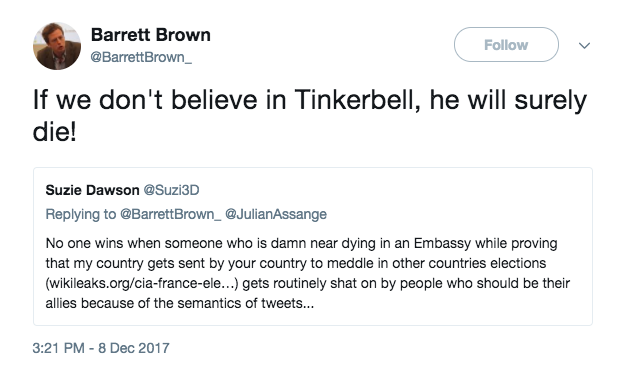
In December 2017, I had a rather public stoush with Barrett Brown on Twitter. This resulted in him plus cohorts utilizing their Pursuance Project platform to generate a small amount of negative media about me, specifically several You Tube & Facebook videos, a blogpost and a radio show appearance to pitch their side of the story.
I made a point of choosing to keep my own organizations and publishing platforms out of the fray, on principle and in the hope that doing so might encourage some self-reflection on Barrett’s part.
I refused media requests, didn’t discuss the issue on other social media platforms outside of Twitter, and to this day have not even watched Barrett’s You Tube or Facebook video diatribes about me or read the Pursuance Project blogpost.
The titles and descriptions contained so many inaccuracies that I felt no need to subject myself to the content and didn’t believe any good could come from doing so.
I decided to wait to address it in my own time and in the larger context which had led to the disagreement in the first place: Barrett’s constant attacks on Julian Assange. That is why I am now finally broaching the topic.
Courage Foundation beneficiary Barrett Brown’s obsession with skewering Julian at every opportunity is self-evident: In the period September 18th, 2017 to February 2018, there are 81 tweets by Brown referencing Assange. 80 of them are critical of him. (Tweets that do not directly reference Assange’s name are not included in the total.)
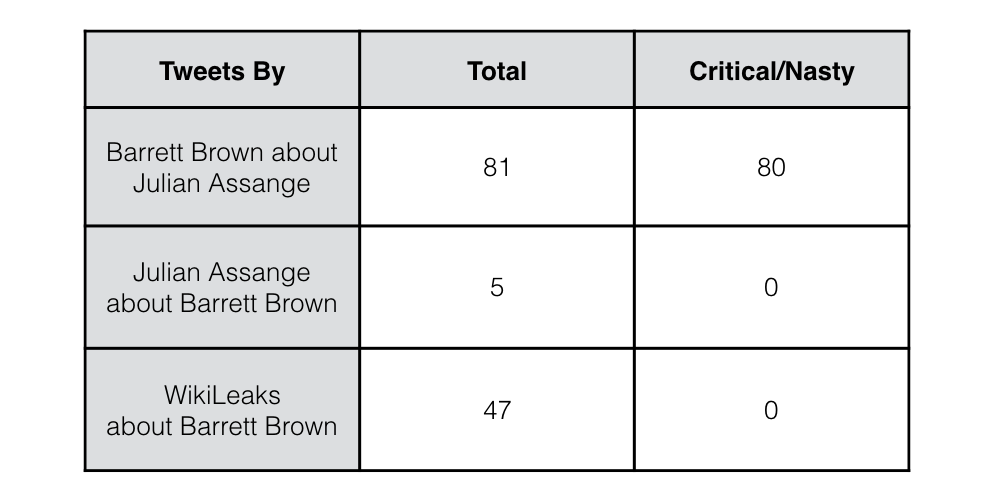
The first tweet of the 80 is this:
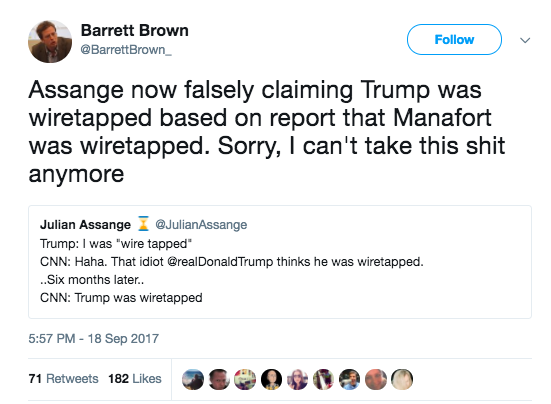
By contrast, WikiLeaks has 47 tweets about Barrett, all of which are promoting his work and urging support for him.
In many cases, including the above, Brown’s criticisms of Assange are provably without merit.
As I pointed out to Barrett at the time, the long-known practice of “two-hops” surveillance makes it impossible for a member of Trump’s administration to be targeted without Trump being caught in the dragnet by default.
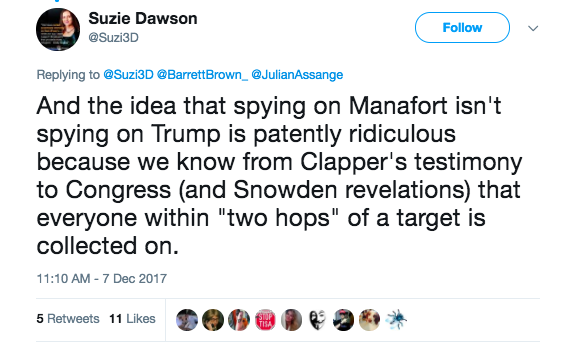
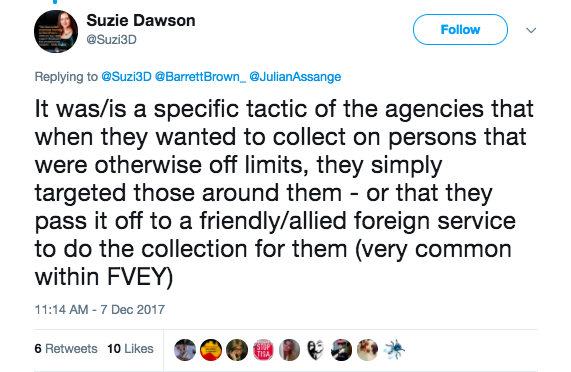
It is genuinely bemusing to see Barrett, who I’ve always considered to be at the very least an advanced student in the field of surveillance practices, being unable to acknowledge the obviousness of the two-hops implication.
The two-hops rule has been public for many years (there are videos of me covering it as far back as 2014) and I’m certainly not the only one who has raised the point. Here it is being explained by the ex Technical Director of the NSA, William Binney:
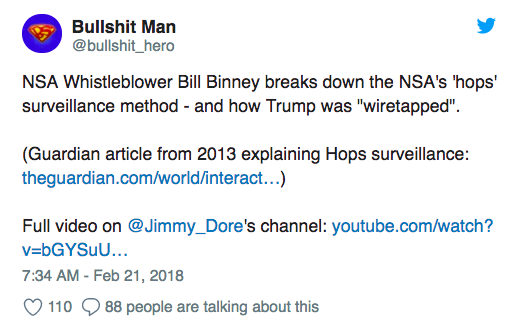
This was far from the only example of Barrett making completely misguided assertions about Assange.
Brown fell for this giant piece of fake news from Julia Ioffe of The Atlantic, hook, line and sinker:
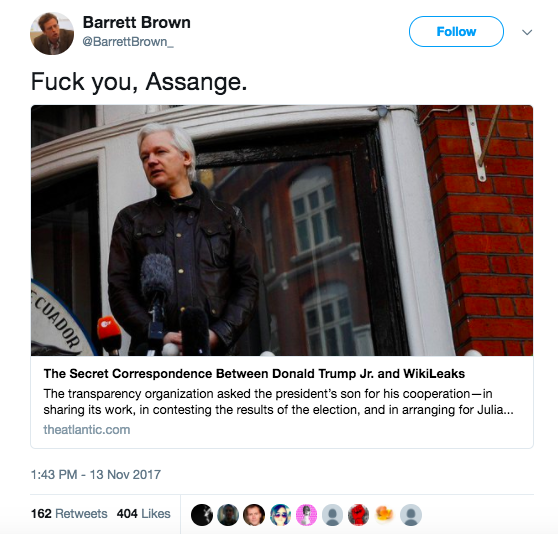
The alternative media sphere debunked the piece within minutes. In doing so, Caitlin Johnstone sourced some of my own observations about the hatchet job:
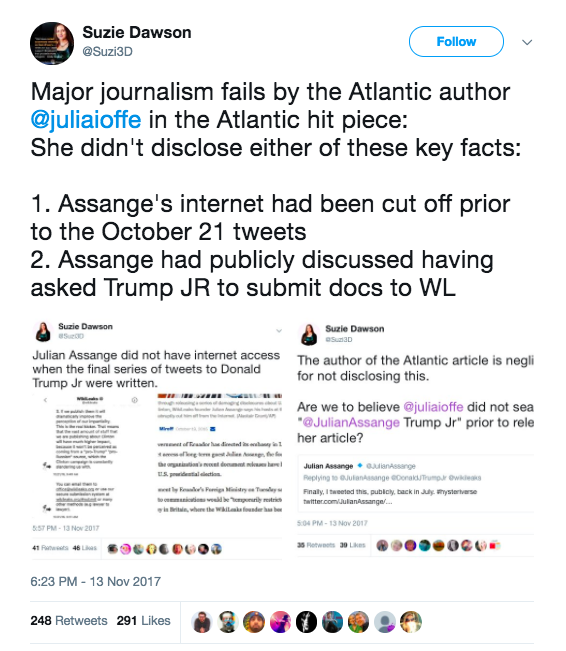
Caitlin and I weren’t the only journalists pointing out the lack of efficacy of The Atlantic piece. Glenn Greenwald was too, and Barrett Brown was “livid” about this, according to a recent profile of Greenwald by the New York Post:
In November, The Atlantic published Twitter correspondence from 2016 in which a WikiLeaks representative gave Donald Trump Jr. campaign advice. Greenwald pooh-poohed the coordination, implying that Julian Assange was just playing his usual 4-D chess. Barrett Brown — a pro-transparency autodidact who served more than four years in federal prison for spreading hacked data and won a National Magazine Award for Intercept essays he wrote while incarcerated — was livid. “He doesn’t seem to be engaging on the actual revelations that keep coming out on Russia and Trump’s people,” Brown says. “My best guess is he’s just ignoring these things in favor of the less difficult argument that some people who are backing the Trump-Russia narrative are full of shit.”
It doesn’t seem to occur to Brown that he inadvertently may be one of them.
Brown has joined the chorus of the aforementioned by making the false allegation that Assange had tried to claim credit for Aaron Swartz’s work – a claim that I have already debunked in this article.
Significantly, Brown had earlier asserted the belief that his own targeting by the authorities was not due to his activities around the Stratfor hack, but were a result of his “active defense of WikiLeaks..”
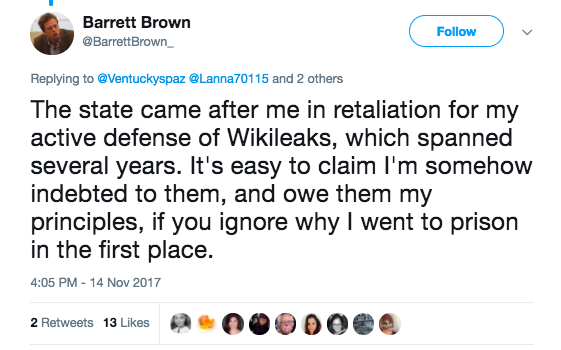
Brown’s description of being targeted for supporting WikiLeaks strengthens our prior argument that Swartz’s involvement with WikiLeaks (rather than the JSTOR hack) was the true cause of his persecution by authorities.
Unfortunately, Assange wasn’t the only target of Brown’s ire.
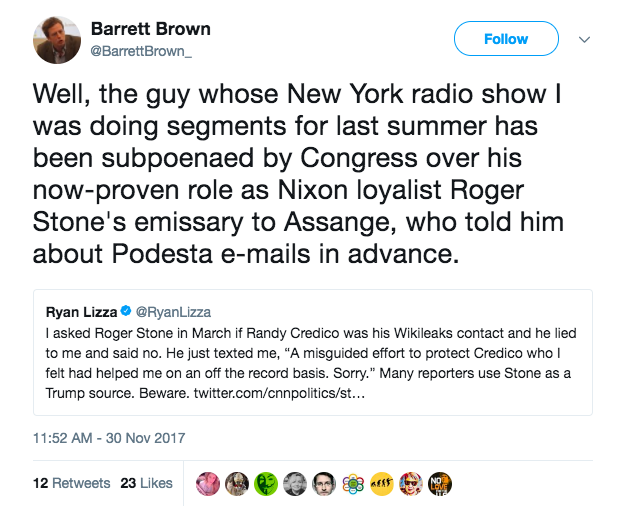
The radio show host in question was of course, Randy Credico, and the platform was Randy’s ‘Countdown to Freedom’ series interviewing key WikiLeaks supporters (including myself and Barrett) for his “Live on the Fly” show at WBAI.
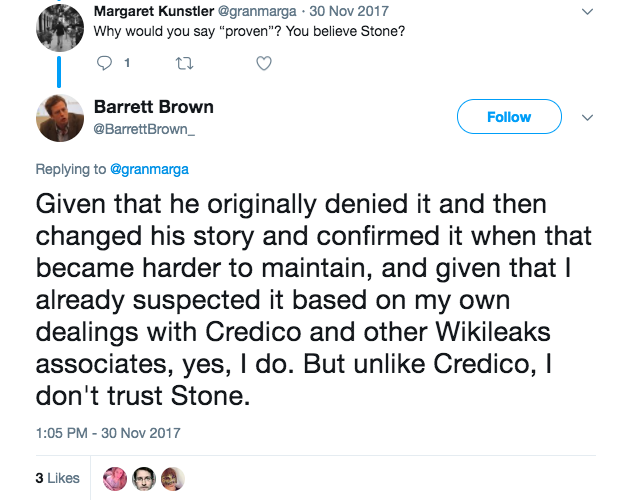
However, that too was soon debunked, and the same day, Barrett retracted his statement.
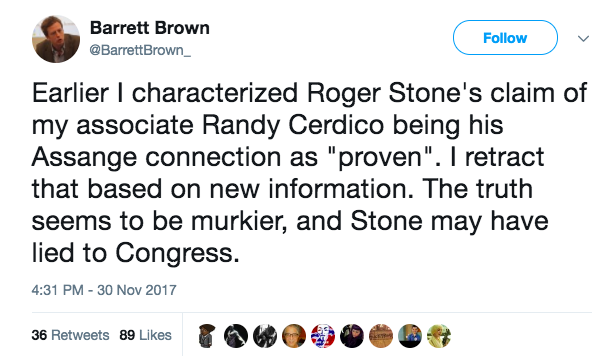
Amusingly, Roger Stone had originally made the claims on, of all places, InfoWars.
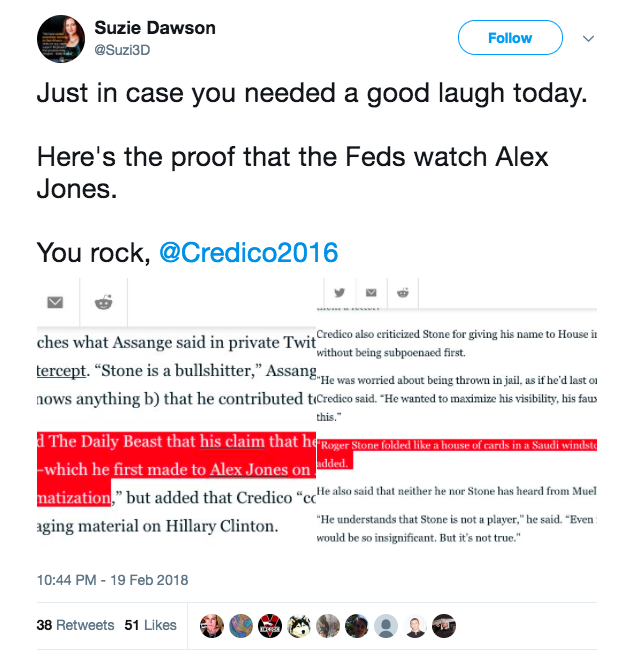
Barrett’s tweets were accompanied by multiple video monologues about Assange (a pattern that he would later follow in his derision of me) posted to Barrett’s Facebook account. It is notable that Assange never replied in kind to Brown on either platform, or returned his hostility.
The only instance of Assange mentioning anything even vaguely critical of Barrett at all, was the below tweet about my unceremonious exclusion from the Pursuance project for defending Julian.
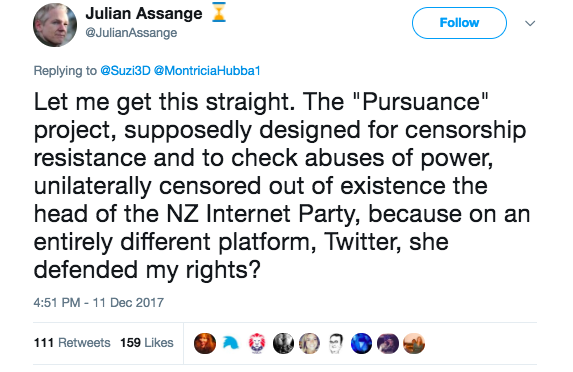
For this single tweeted question about the situation, Julian was pronounced by Brown to have “libeled” the Pursuance Project. A further Facebook video rant by Barrett ensued, and some more angry tweets.
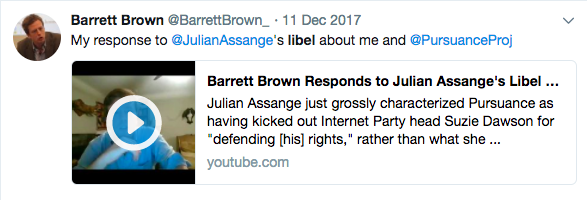
Ironically, in the video description, Brown claims the root of the issue was me “calling our lead developer ‘menacing’ for having asked her a question on Twitter.”
What was left out by Brown in his diminutive description of the scenario was that the “question” (falsely implied as a singular occurrence) was asked at the tail end of a slew of tweets from said developer, Steve Phillips. In reality, the berating of me came on the back of months worth of character assassination of Assange, stemming from both Brown and Phillips, and seeded within the embryonic Pursuance Project.
Julian’s inquiry about the e-drama was restrained and moderate: a single question on Twitter.
But it set others a-flurry, as the Pursuance coordinator, Raymond Johansen, appealed to me to calm things down.
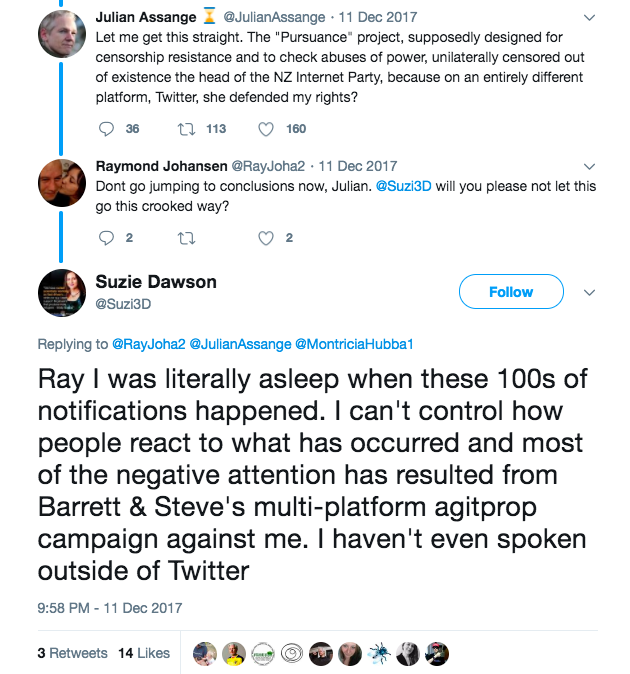
Intellectual Honesty
To unravel the full story, we must go behind the scenes of Barrett’s 80 negative tweets about Assange.
The degrading and discrediting of Julian, the systematic stripping of his achievements and the undermining of his legacy was being promoted by Barrett’s offsider Phillips, under the guise of a new catchphrase: “intellectual honesty.“
Eventually this Newspeak bled through into the public realm.
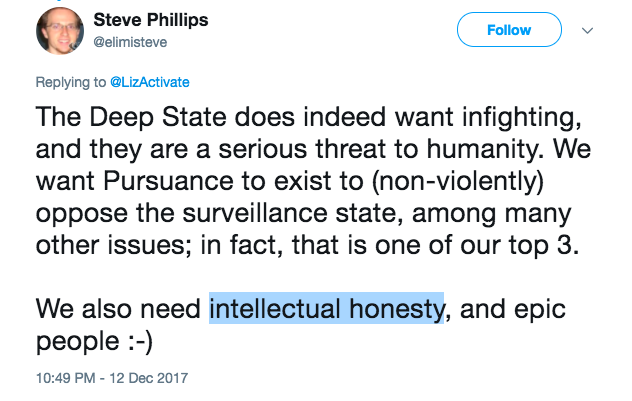
For months, this specific phrase was repeatedly slung about in the back-channels of the organising platform for Barrett Brown’s Pursuance Project: an unencrypted MatterMost instance where a who’s-who of seasoned activists from around the world were assembled.
The space was supposed to be for coordinating the sharing of our work and the building of Pursuance (and initially was). However, the conversation was soon diluted by periodic, malignant pile-ons critiquing Julian (a political refugee) to death.
The lines were quickly drawn between the few actors intent on diverting the space to indulge in derision of WikiLeaks, and the few staunch and vocal supporters unwilling to sit by quietly while the back-stabbing was playing out.
The majority of the members – experienced and accomplished activists, all – just rolled their eyes at the drama and kept out of it until it snowballed into the public spectacle that it inevitably became.
The server administrator, lead Pursuance developer Steve Phillips, was one of the key antagonists. Proximity to Barrett, or the desire to cement standing with him, appeared to be a motivating factor for participation in the anti-WikiLeaks “intellectual honesty” rituals.
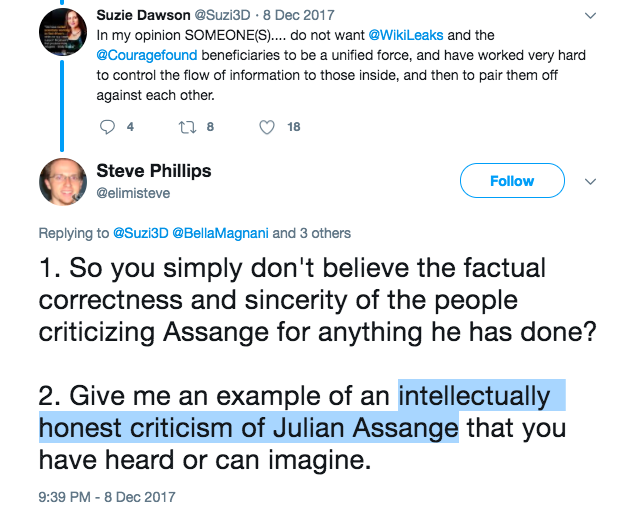
Those of us who were reluctant to relentlessly armchair psychoanalyze someone who had been in arbitrary detention for six years with no end in sight, became increasingly disillusioned with the environment. As I was countering Barrett and Steve’s anti-Assange narratives both publicly on Twitter and privately in Pursuance, it was abundantly clear that my presence was less and less welcomed by them.
Indeed it was confirmed to me after my eventual expulsion that they had been discussing between themselves whether they could get rid of me (and thus my inconvenient counter-narratives) well before finally manufacturing a pretext under which to actually do it.
This was the context in which Steve sent me his “for the third and final time” tweet, which was a clear warning shot implying that he would have me banned if I didn’t capitulate to his demands for critical analysis of Assange. But if the US government with all its might and resources can’t bully me into turning my back on WikiLeaks, like hell was it going to happen because Steve wanted it to. So I called his behavior out for precisely what it was: menacing, and authoritarian.
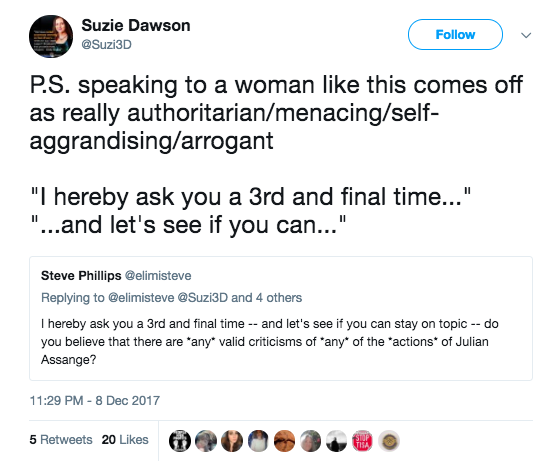
While Barrett took credit for “ordering” the banning, Anna Burkhart, Pursuance’s “Director of Operations”, who seemed to me to be a fringe figure as I’d never had any contact with her before, swiftly portrayed my excommunication as an exercise in policing… yup, you guess it… “intellectual honesty“.
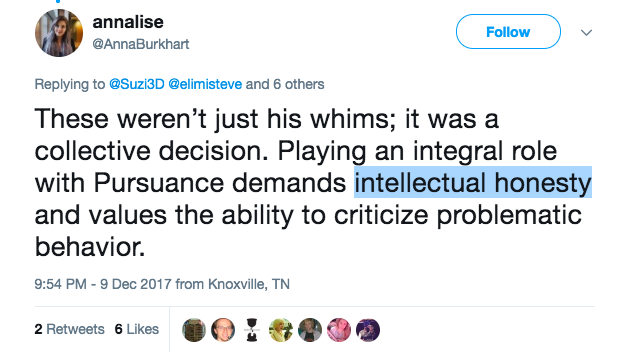
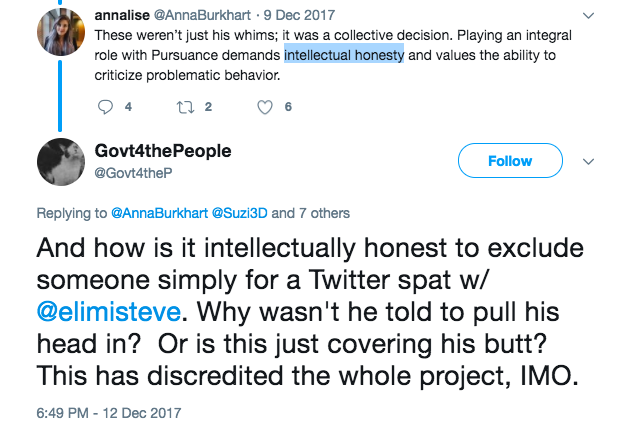
Being excluded from a platform that risked becoming a cross between a cult of personality and a tinpot dictatorship, didn’t bother me at all. But having my access to direct messages of a personal nature between myself and other activists revoked without notice or consultation certainly did.
The restriction of an exiled activist’s ability to access their own communications raised legitimate questions as to Steve’s monopoly over the governance of user data, as sole server administrator.
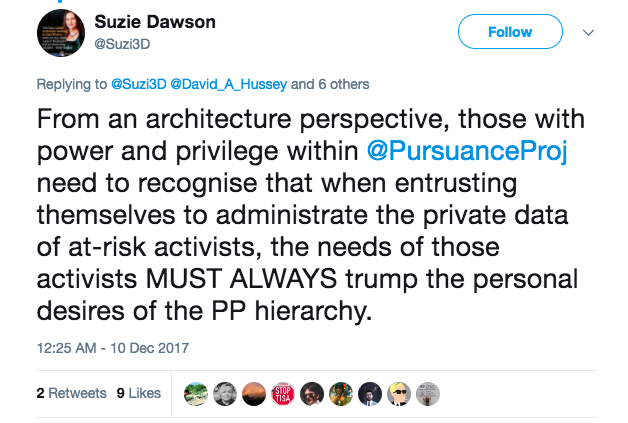
Steve refused to allow me to retrieve my data, instead offering bizarre and inappropriate solutions such as him fetching the plain text from the database and handing it to me through third parties – an obvious breach of privacy. I declined.
The use of Pursuance’s publishing platforms to smear me to their public audiences was a significant abuse of organizational power. Steve refused to admit this, and yet again invoked their mantra of “intellectual honesty.”
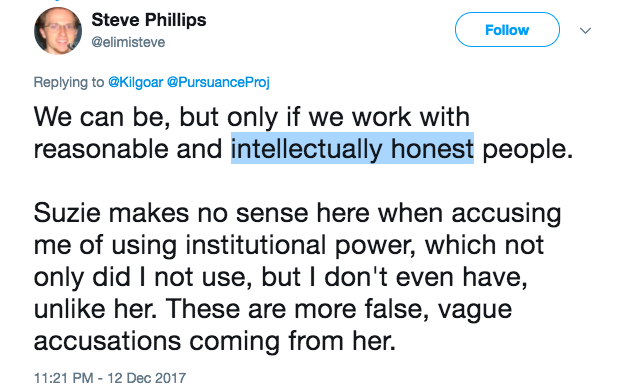
By contrast, I made a point of not dragging my own organizational affiliations into the drama. Instead of racing off to the Internet Party’s board, or to Kim Dotcom, and decrying the poor treatment, I confined my opinions to my personal Twitter account.
Adding offense to injury, the smear published on the Pursuance Project blog was accompanied by a social media share card displaying an image of CIA whistleblower John Kiriakou, who apparently had no knowledge that his image was being misused to endorse an attack on an exiled activist, by association.
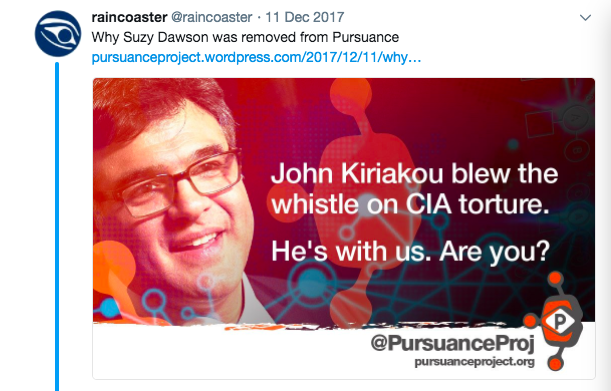
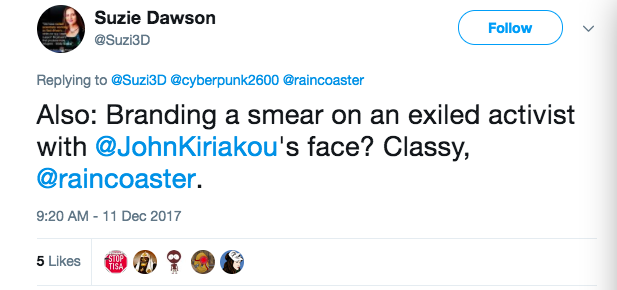
My only public statement was this:
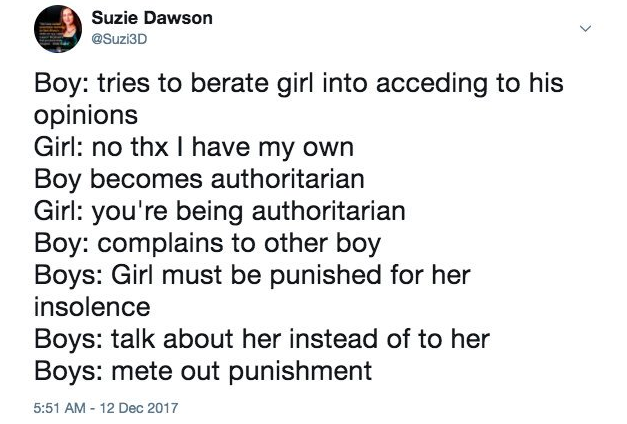
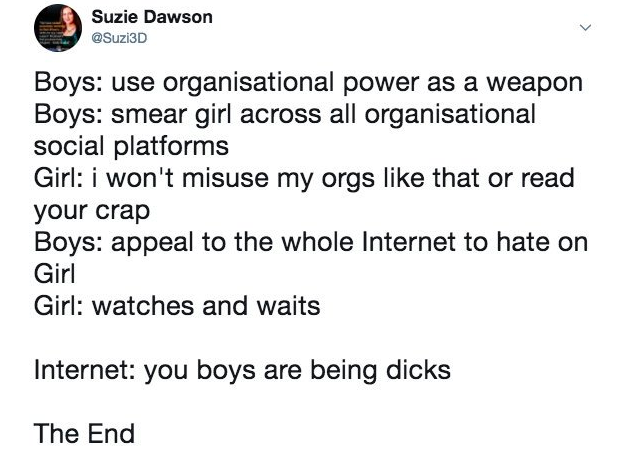
SupporterGate
It is not possible to meaningfully undermine Assange without also taking ideological aim at his support base, so it was inevitable that I would be targeted one way or another.
Unfortunately, I am far from the only one.
A housewife and a librarian who attend periodic vigils for Julian in London, were recently shocked to find themselves among a group of WikiLeaks supporters being singled out by journalists with The Intercept.
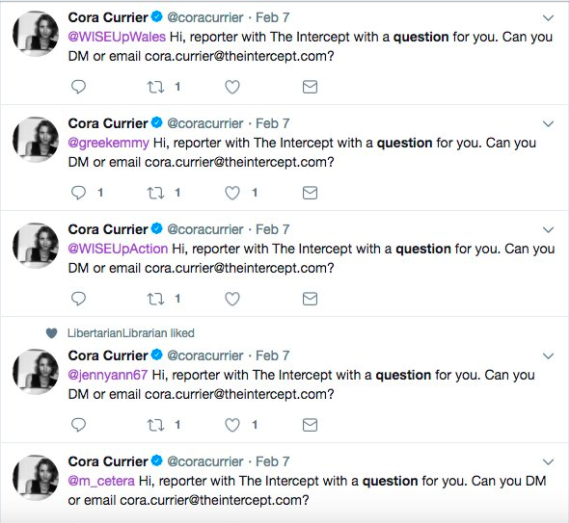
Smelling a rat, one of the ladies wanted to keep all correspondence with Intercept reporter Cora Currier in the public arena and stated so in no uncertain terms, publishing their exchange on her blog:
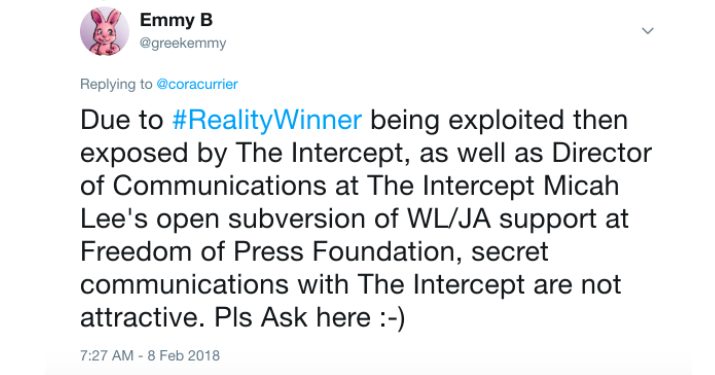
Although the first public contact seems innocuous, screenshots of Cora’s ensuing DM’s felt intimidating to the other individual involved, who was keenly aware of the power imbalance between herself and mainstream journalists wielding a huge audience:
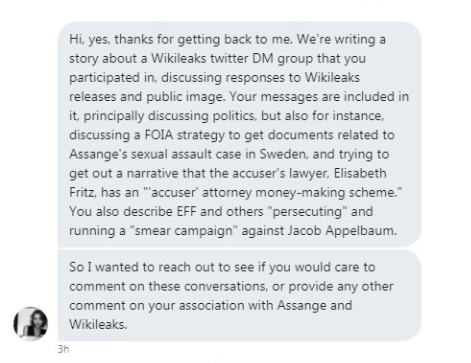
The member of the public replied to Currier:
a) that she is not a public figure
b) that the messages were “private, chatting between friends“
c) that she hadn’t said anything that didn’t already appear on her regular Twitter timeline
She told me that she doesn’t know why Currier thought the EFF was ever mentioned by anyone: “Some of this is misrepresented, some out of context, and a few things are ideas, gripes, jokes, etc. Tossed around.“
Most importantly, she verified what many others had posited: “I never knew who was behind @wikileaks except that it varied. We all knew different people handled it at various times, no one ever identified themselves and we didn’t care.” [emphasis added]
Julian Assange is named 70 times in the article; 33 of which are explicit attributions of WikiLeaks’ private messages as being authored by him. The Intercept reporters use terms like “Assange decried“, “Assange called“, “Assange posted“, “Assange believed“, “Assange found“, “Assange emphasized“, “Assange maintained“, “Assange explicitly encouraged“, “Assange philosophized“, “Assange responded“, “Assange asked“, “Assange suggested”, “Assange wrote”, “Assange theorized”, “Assange instructed”, “Assange added” and “Assange joked” without ever having verified that the messages were sent by Julian Assange.
Incredibly, their own copy admits the lack of proof, stating: “Throughout this article, The Intercept assumes that the WikiLeaks account is controlled by Julian Assange himself.” [emphasis added]
A fundamental flaw, so problematic that it is almost comical.
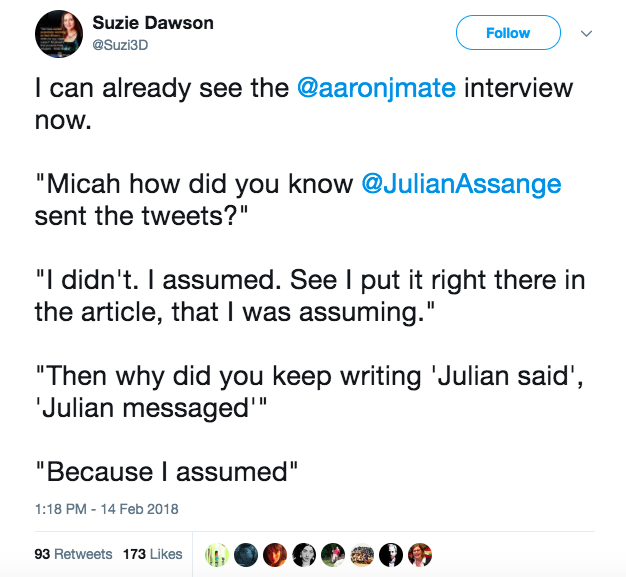
The assumption undermines the core premise for the entire text. This factor should not have been overlooked by The Intercept’s editors.
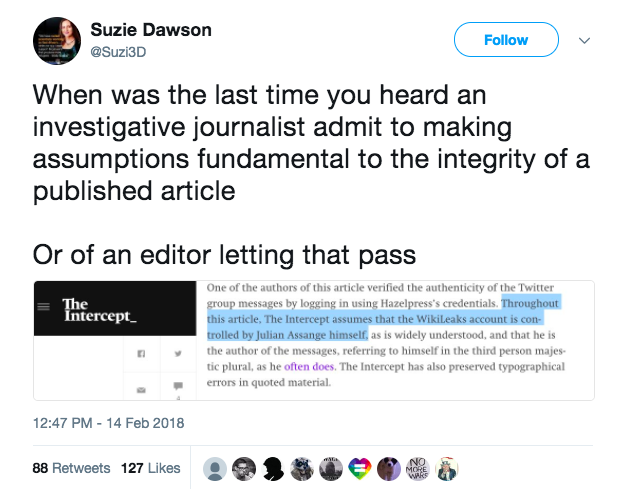
Some of the messages attributed to Assange were sent at dates and times that it was physically impossible for him to have been the author.
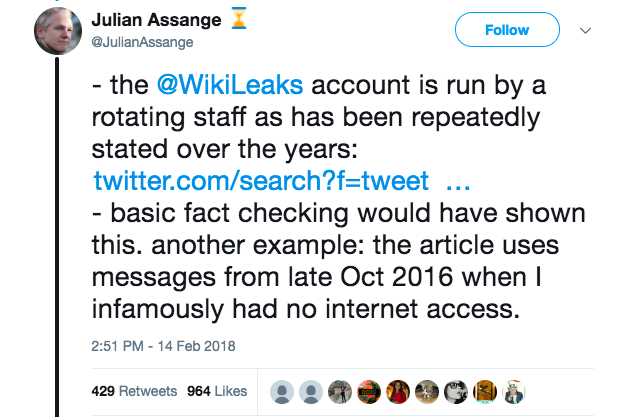
Had Currier asked the supporters involved whether they believed they were speaking to Julian Assange, this misrepresentation could have been avoided. But she didn’t. Instead, the framing of her questions attempted to elicit inflammatory commentary under the cover of offering a right of reply. When what she should have been doing was fact-checking the foundations of her story.
I took issue with The Intercept journalists putting ordinary citizens on the spot like this, just because they were supporters of WikiLeaks.
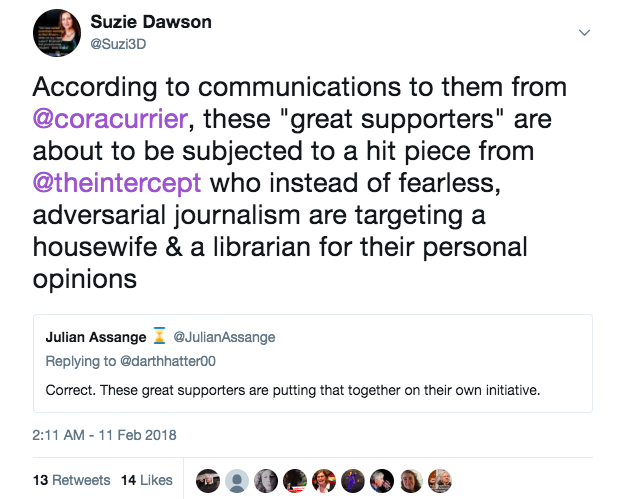
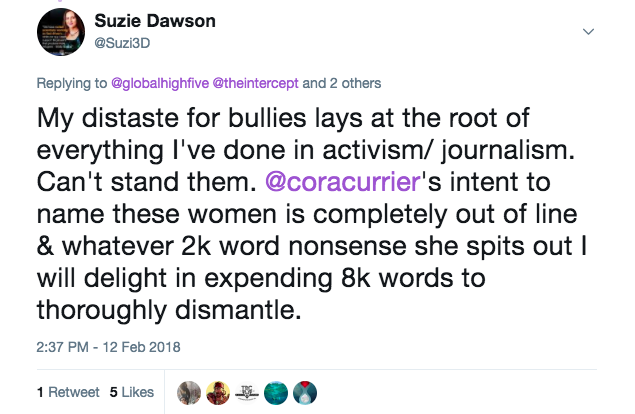
It appears my sabre-rattling may have had some effect: To their credit, by the time the article eventuated, The Intercept had redacted the names of the members of the public caught up in the dragnet.
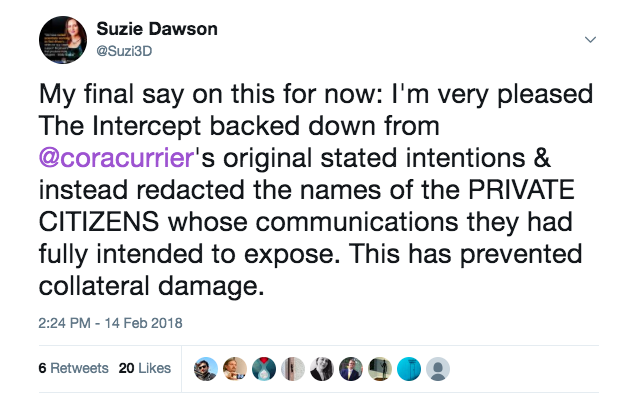
Unfortunately, it didn’t prevent hurt feelings. The supporters felt that the framing of the article was without merit and were particularly aggrieved to be depicted by Lee and Currier as having been party to misogyny, anti-feminism and anti-semitism.
One of the women told me:
“It was a clear attack to undermine the solidarity and other work WL supporters do. The article smears us by its outlandish claims presenting us as participating in a cabal of misogyny/fascism/anti-semitism which I find extremely offensive as I know every single person in that chat supports humanistic progressive ideals of a great variety, most are women, many with Jewish heritage. The article’s claims are so outlandish and negative, so dismissive and morally reprehensible.“
The article’s attribution of anti-semitism to WikiLeaks is weakly evidenced. Lee and Currier rely on a comment where WikiLeaks stated that they found a journalist’s work distasteful, “but” that he was Jewish. Whoever was at the helm of the WikiLeaks account that day was clearly implying that they were wary of calling the reporter in question out, lest any criticism be deflected as being anti-semitic. It is the greatest of irony that their suspicion has borne true, not by the reporter they mentioned, but by Micah Lee in his stead.
Another of the women targeted by Lee and Currier told me:
“I was offended by being labelled as transphobic and as attacking feminists, among the other smears. I tried to make it clear in my own tweets I am only disturbed by the fanatical version of feminism that acts as though any disagreement with them on anything makes you misogynistic and that any accusation they make against any man, regardless of truth, evidence, or simple reality, must be accepted as gospel… I’ve always considered myself a humanist and an individualist, focusing on equal justice, equal treatment before the law, irrespective of all those things people try to use to divide one group of homo sapiens from another.”
The female supporters damaged by Lee and Currier’s article are not the only ones close to WikiLeaks who are incensed at the constant and unfair accusations leveled against them.
Widely respected investigative journalist Stefania Maurizi has also spoken out about her own extensive experiences with WikiLeaks. When Micah Lee thread-jumped one of her tweets, she responded in no uncertain terms:
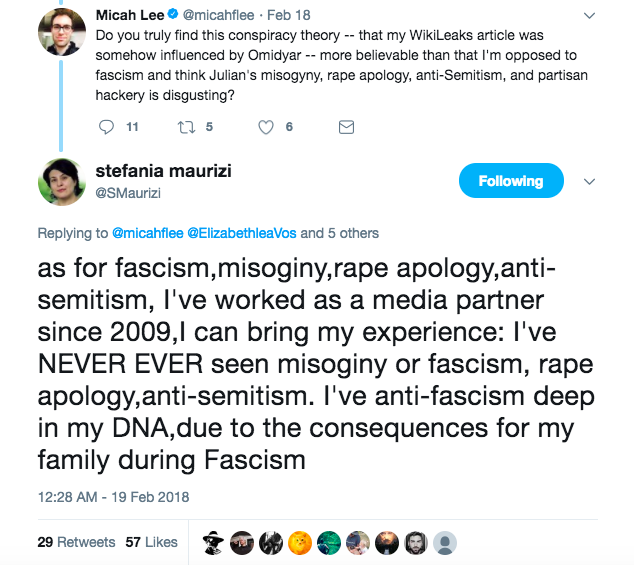
Currier hadn’t mentioned to the supporters in her original direct messages who the “we” in her enquiries referred to. Although it was more likely than not, that this latest attempt to undermine support for WikiLeaks originated with none other than Micah Lee.
Two days prior to the article dropping, I had alluded to such:
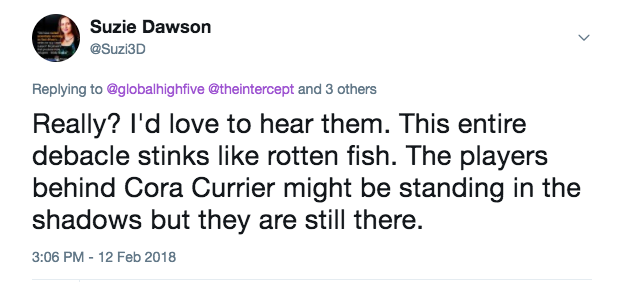
Sure enough, that is precisely who appeared on the by-line, and then went on a campaign of collecting public credit for the nuclear fallout.
The Worst Article Ever
I had thought my below summary of issues with Lee and Currier’s article was a shocking list of editorial malpractice.
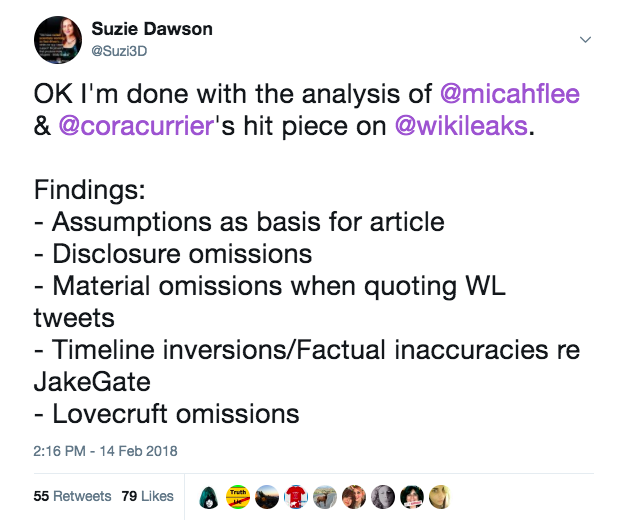
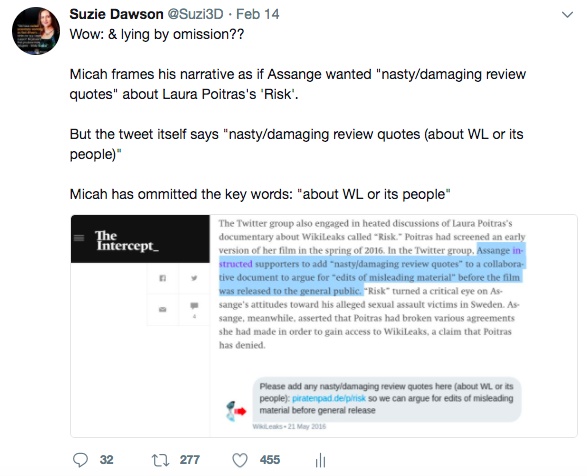
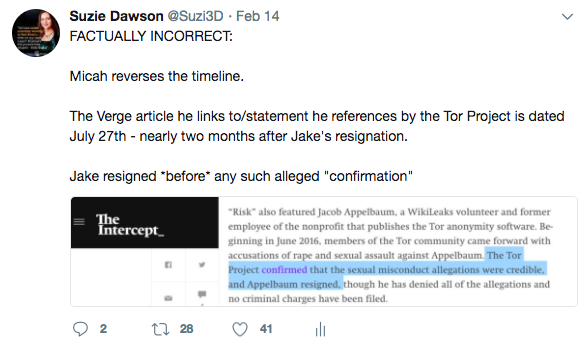
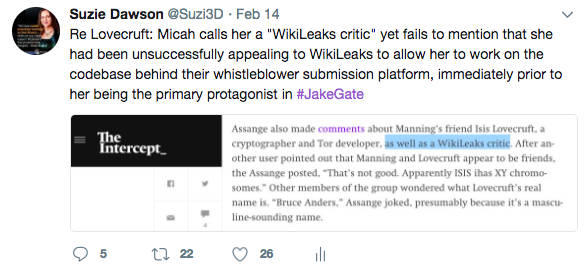
What I didn’t realize is that those shoddy journalistic practices would pale in comparison to what has since come to light.
It turns out that the damage wrought by Micah and Cora’s piece was not confined to WikiLeaks and its supporters.
The lack of due diligence in their article resulted in a highly damaging attack on the ability of conscientious activists to garner high profile support for the legal defense funds of whistleblowers.
In this case, Trident nuclear whistleblower William McNeilly.
Lee and Currier wrote:
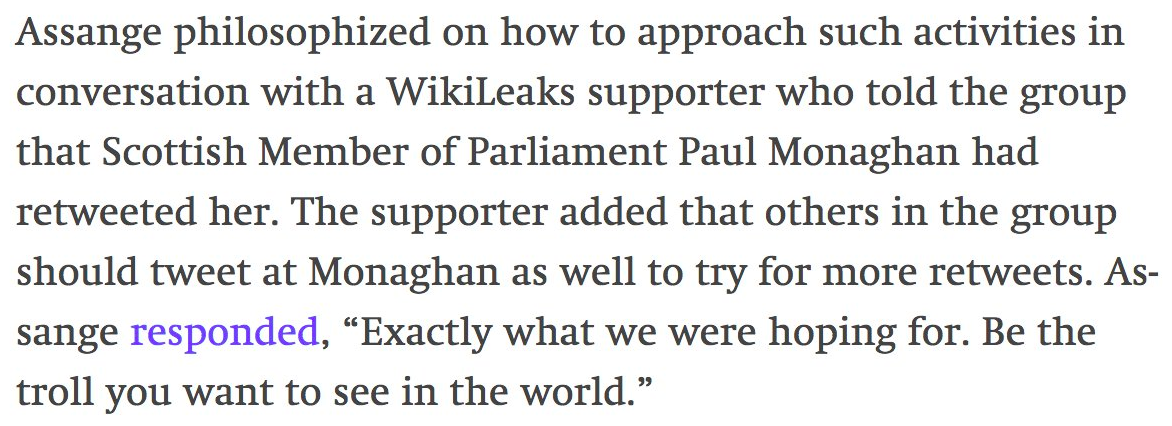
Here are the WikiLeaks DM’s on which they were editorializing:
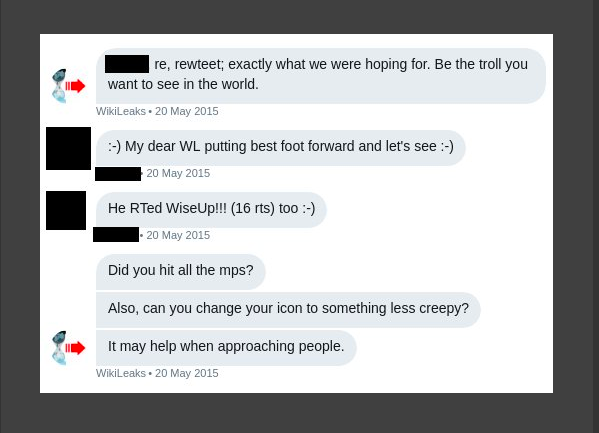
Had Lee and Currier been more conscientious in their methodology, they would have discovered that the tweet amplified by the Scottish MP Paul Monaghan was part of a campaign to raise support for the whistleblower McNeilly. McNeilly’s revelations were about dangerous misconduct aboard the Trident nuclear ship, parked in Scotland.
Lee, Currier and their editors neglected to locate or source the actual tweet which had been retweeted by the MP:
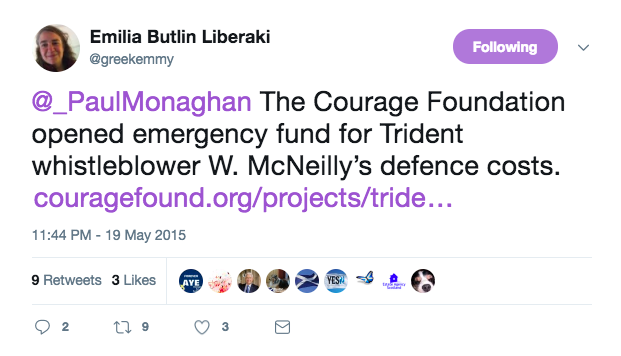
It was the above that was being celebrated by the WikiLeaks supporter, and to which WikiLeaks was saying “be the troll you want to see in the world.” They were not encouraging people to be trolls, but rather suggesting that the type of troll a good person would want to see in the world is one that acts in support of whistleblowers, rather than one that derides, smears or endangers them.
The supporter whose appeal had caught the attention of the MP told me she was extremely upset by Lee and Currier’s malpractice asthe decontextualization has produced material harm:
My very modest campaign supporting raising funds for whistleblower William McNeilly by promoting his Courage Foundation Emergency legal defence fund was never mentioned. De- contextualizing my agency as a transparency campaigner, the implication is that sharing my modest joy of a re-tweet by someone within the political establishment who is followed by many of his constituents that might be moved to assist McNeilly’s Legal Defence Fund, is nothing more than a manipulative attack without merit. Political campaigning is perfectly legitimate. Spreading the word for the cause you support is consistent with participatory democracy.
Unfortunately, the damage wreaked by Lee and Currier goes far beyond upsetting the women. Their misreporting directly led to open calls on MP’s to no longer retweet WikiLeaks supporters – striking a blow to future attempts to provide urgent assistance to at-risk whistleblowers.
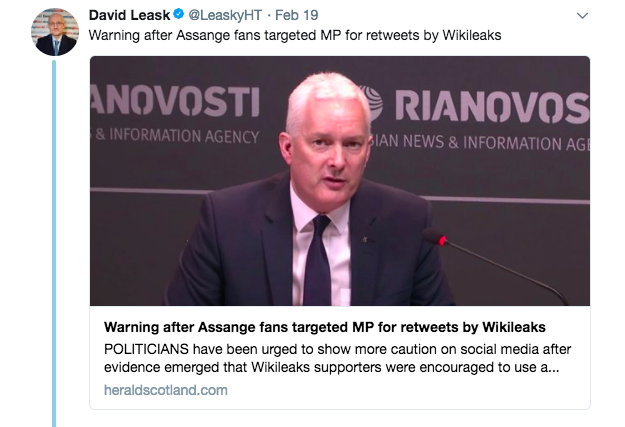
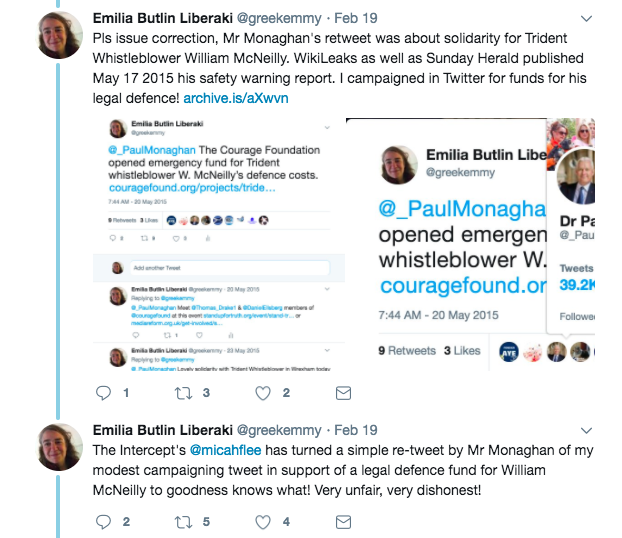
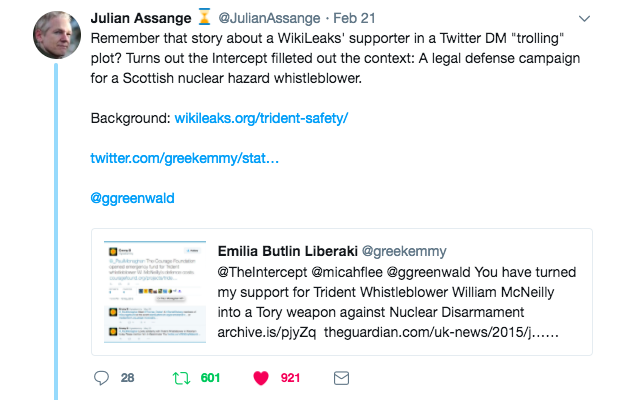
The butterfly effect of Lee and Currier’s effort to add another cheap shot at WikiLeaks to their pile, is that their article was immediately sourced for a Tory talking point to deride anti-nuclear support in the Scottish National Parliament – a direct violation of the progressive ideals that Lee and Currier claim to be motivated by.
Otherwise known as an own-goal.
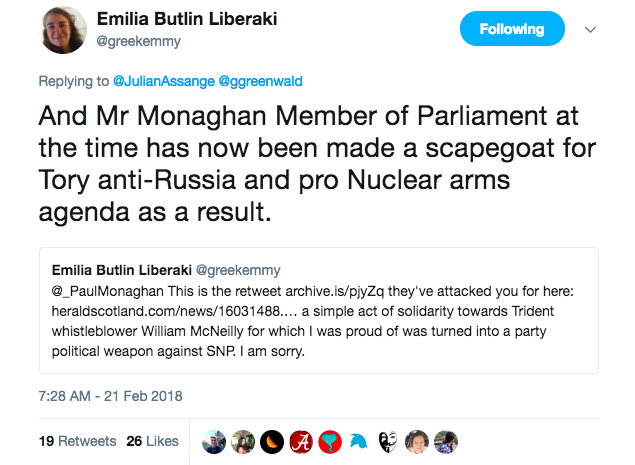
Currier and Lee’s assertion that WikiLeaks supporters were targeting the MP on social media implied impropriety, and has undermined one of the most basic tenets of activism: appealing to democratic representatives. The very tactic that has recently freed Courage Foundation beneficiary Lauri Love from the threat of being extradited to the US.
After relentless efforts by campaigners, 73 Members of the British Parliament spoke out on Love’s behalf, with tremendous impact. Their support was gained through the same type of social media technique that WikiLeaks supporters were engaged in on behalf of Trident whistleblower William McNeilly.
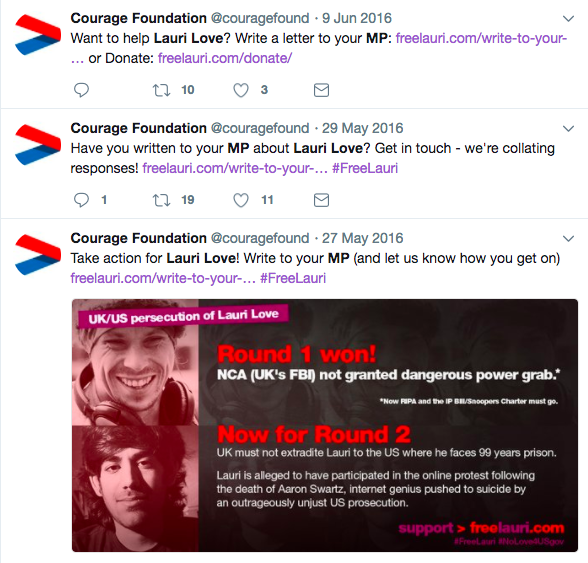
This scandal is indicative of the whole: WikiLeaks’ DM’s with their supporters were taken at face value by Lee and Currier, who employed little care to ascertain what was truly going on behind the messaging. The pair failed to measure any potential negative impacts of their framing, beyond surface damage to WikiLeaks reputation.
Only entities likely to further the discrediting of WikiLeaks were given meaningful portions of the word count. In Currier’s DM’s to the WikiLeaks supporters, they were asked only about their statements on contentious topics such as EFF, Jacob Appelbaum or the lawyer of an Assange-accuser. No attempt was made to offer the ladies a chance to contextualize conversations such as the above – with disastrous results.
No consideration was given as to the ethics or dangers of undermining the future work of pro-human rights campaigners.
Lee and Currier’s negligence is to all of our detriment – The Intercept, WikiLeaks, whistleblowers, MP’s, progressive causes and the public at large.
When deception causes actual damage to the ability of good people to effect positive change in this world, it becomes an act of sabotage. In my opinion Lee and Currier have crossed that line.
The Freedom To Impress
In the last 5 years, Micah Lee has sent one tweet educating people about the TPP. Nevertheless, the diabolical trade agreement has become yet another reference point for his attacks on WikiLeaks. In what will become a running theme, Micah accused WikiLeaks of “taking credit” for the “people’s movement against the TPP“.
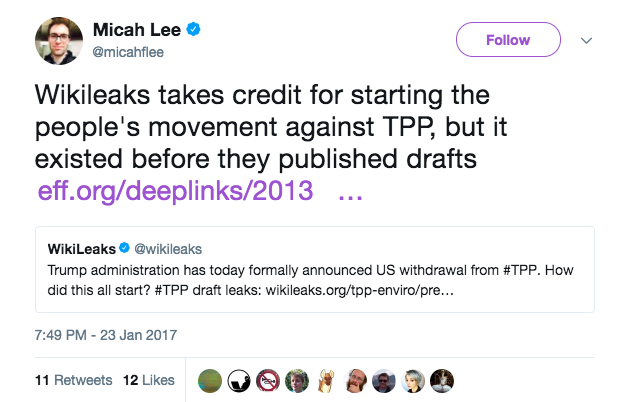
WikiLeaks tweet did no such thing. As Micah would know, if he a) had actually clicked on the link in it, or b) knew anything about the history of the movement.

The WikiLeaks link contained expert analysis of the leaked chapters by none other than Dr. Jane Kelsey – the New Zealand academic who spearheaded the movement against the TPP since 2008/2009. Kelsey worked relentlessly alongside international counterparts in Japan, South Korea, the United States, and other countries to build the coordinated effort against the TPP that finally resulted in the withdrawal of the United States from the agreement.
New Zealand’s movement in opposition to the TPPA, led by Kelsey’s coalition It’s Our Future NZ, was per capita the largest in the world (by orders of magnitude). She wrote opinion pieces in New Zealand media about the significance of the WikiLeaks publications of the TPP chapters, and how organisers of the movement were reliant upon the leaks for information on what the agreements contained.
Additionally, WikiLeaks directly engaged Kelsey and other academics around the world to analyze the leaked documents and published their findings alongside the releases. An invaluable service to humanity.
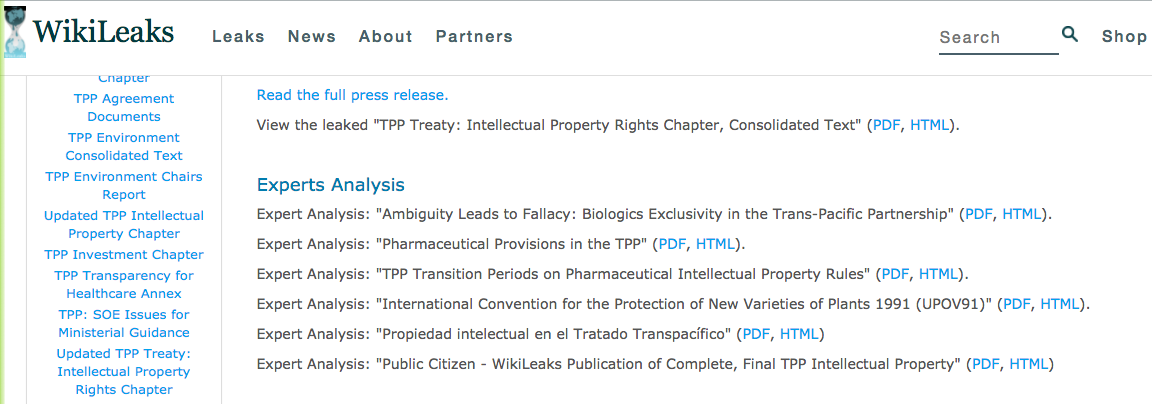
I genuinely wish that I was just reporting on Micah making a clown of himself over the TPP. Unfortunately his penchant for uninformed diminishment of the extremely significant work of those he smears has had a splash effect on other organizations with which he is affiliated.
In particular, the reputation of the Freedom of the Press Foundation has been dragged through the mud in recent times. This is due to even more accusations made against Julian Assange and WikiLeaks by Micah Lee, that I can now confirm are false.
The proof is in Micah’s own Twitter timeline. To get to the bottom of the debacle, all we have to do is take a walk down history lane.
Micah has been tweeting about WikiLeaks since July 2010, nearly two months after Manning’s arrest.
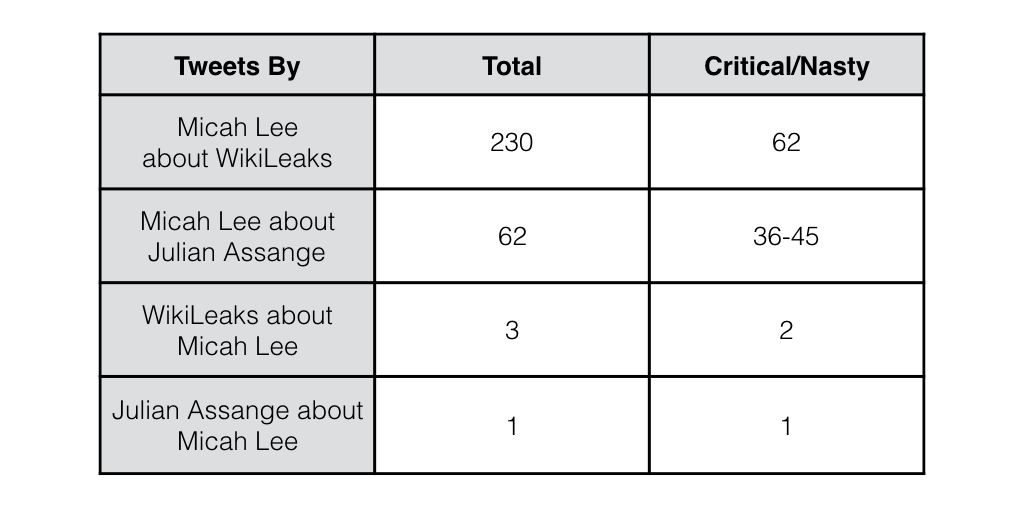
Here is the first of his 230 tweets about WikiLeaks:
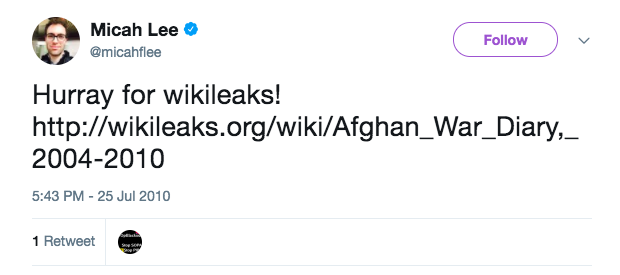
Initially supportive of the whistleblowing organization, Micah has sent at least 62 highly critical and/or defamatory tweets about WikiLeaks. The turning point was December 2016. Immediately post election. By contrast, WikiLeaks has sent 2 about Micah.
62 separate tweets by Micah dating back to December 2010 explicitly name Julian Assange. Somewhere between 36 and 45 are highly critical and/or defamatory, depending on your tolerance for Micah’s acidity levels. Julian Assange has addressed Micah once.
The first major falsehood asserted by Micah Lee was over a year ago. He claimed that Julian Assange was lying about his involvement with the creation of the Freedom of the Press Foundation. The accusation was widely circulated:
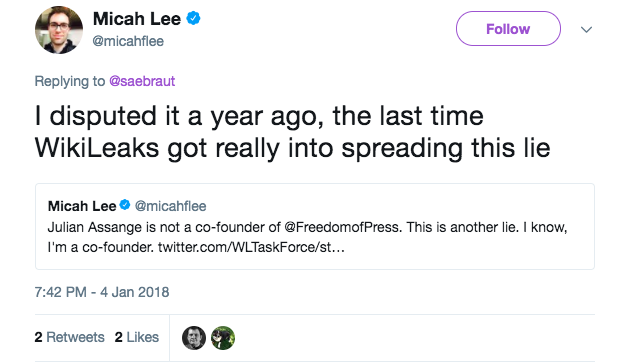
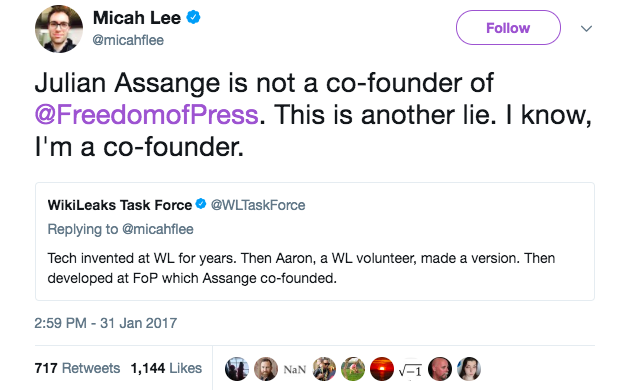
The key to debunking Micah with his own tweets is in April 2012:
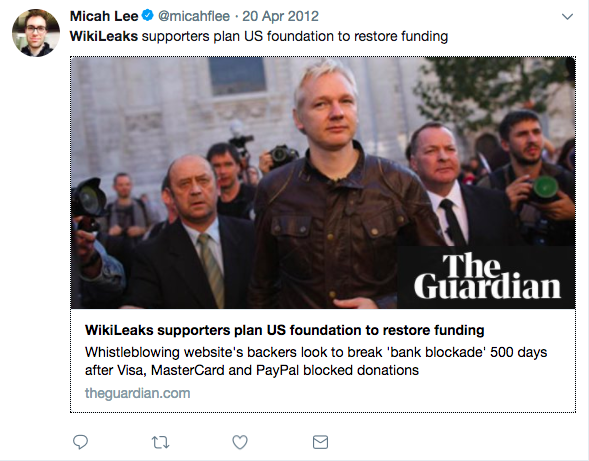
Sure enough, when you read the above article, you discover the evidence that Micah’s allegation against Julian is false:
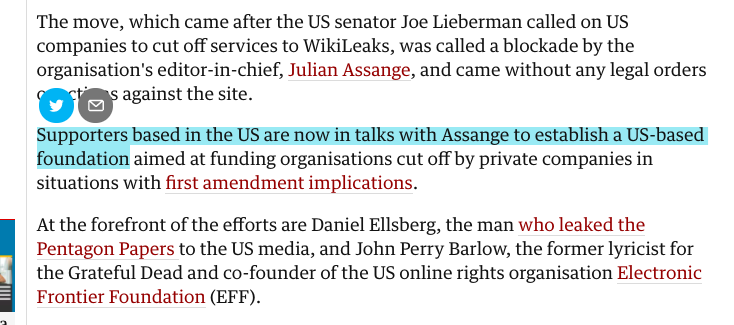
The Guardian quote bears repeating:
“Supporters based in the US are now in talks with Assange to establish a US-based foundation…”
Lee’s first lie now dispensed with, something else that he had repeatedly stated kept echoing in my head, and led me to an even more consequential discovery.
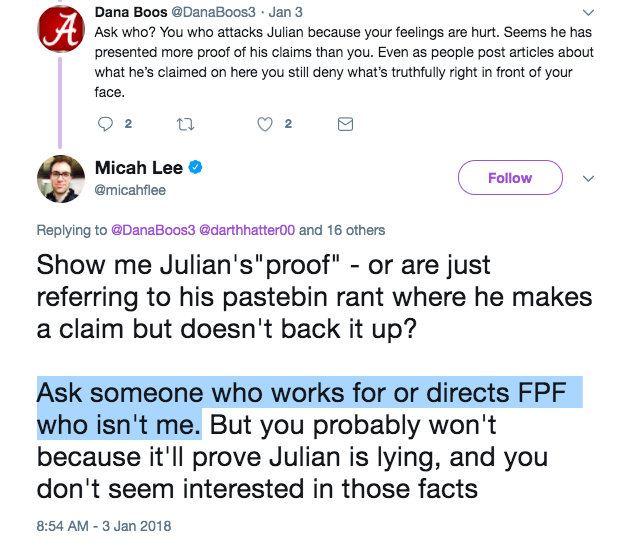
According to the Guardian article, the first onboard with Freedom of the Press was John Perry Barlow (co-founder of the Electronic Frontier Foundation and Grateful Dead lyricist) who then reached out to Pentagon Papers whistleblower Daniel Ellsberg.
Helpfully, in 2012 Micah had also tweeted a link to this Forbes piece, quoting Daniel Ellsberg on why the Foundation was started.
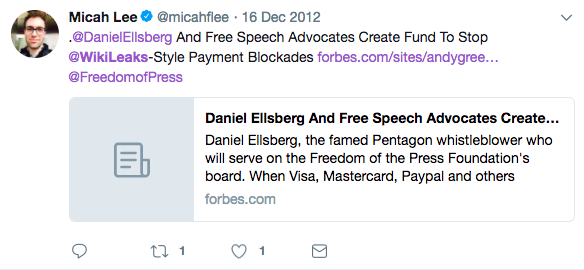
What that article reveals should send shockwaves among both the WikiLeaks and FPF communities, as well as that of related organizations.
Because it completely upends the official narrative about the recent decision by FPF’s board to sever funding ties to WikiLeaks.
FPF’s justification for the severance: that it had only provided a conduit for donations due to the infamous Visa, Mastercard and PayPal ‘banking blockade’ against WikiLeaks.
FPF board members claimed that because there was no recent evidence of the blockade continuing, that the funding channel could be closed down, and then did so.
But the Forbes quote of Ellsberg back in 2012 reveals a completely different motivation for setting up the funding channel: it was not just to aid WikiLeaks, but to protect the public.
“A lot of people would rightly be hesitant to go on record sending money to WikiLeaks because they think they could be questioned, blacklisted or prosecuted,” says Ellsberg, citing politicians like Joe Biden and Sarah Palin that have compared WikiLeaks at times to a terrorist organization. “With this the individual will have his or her anonymity preserved. It’s like WikiLeaks itself. WikiLeaks facilitated anonymous leaking. This is to facilitate anonymous donations.” [emphasis added]

This is an earth-shattering reminder of the true reasons for establishing FPF itself – it was not just to help media organizations like WikiLeaks. It was to safeguard those who wished to support them but were afraid to do so, by shielding donors from potential legal ramifications.
Micah appears to have been well aware of this in 2012. As he tweeted the ArsTechnica headline that FPF would act as a “financially-shielded middleman for WikiLeaks“:
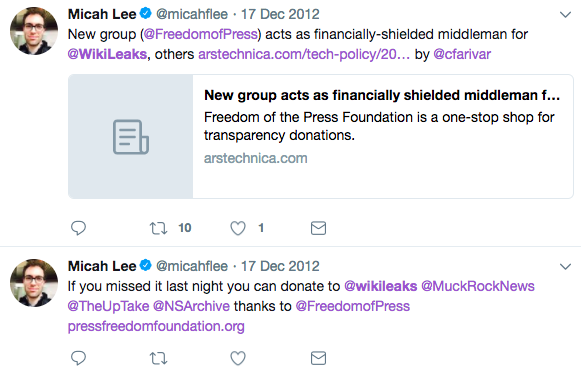
But by 2017 he was singing a very different tune. In a slew of tweets, he continues to encapsulate the issue as being about the banking blockade, implying that there is no other reason to maintain the service.
Just as we showed earlier that the Manning Support Network was monitored by the FBI, donors to Barrett Brown’s legal fund were also monitored. Kim Dotcom’s assets were seized and his funds frozen. Julian Assange’s accounts were likewise frozen while he was in Sweden. All whistleblowers, many dissident journalists (including myself) and their supporters have been interfered with financially.
The number one tactic of intelligence agencies is to go after the resources of their targets. To impoverish them by any and all means.
CIA Director Mike Pompeo announced at his first press conference of 2017 that WikiLeaks is a priority target. Subsequently, the very survival of the organization, to this day, hangs in the balance, as do the lives of those who cast their lot in with them.
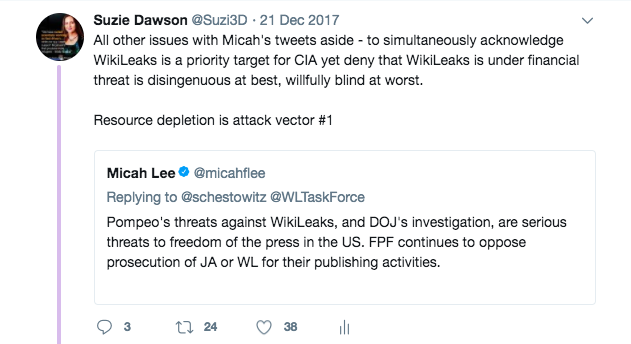
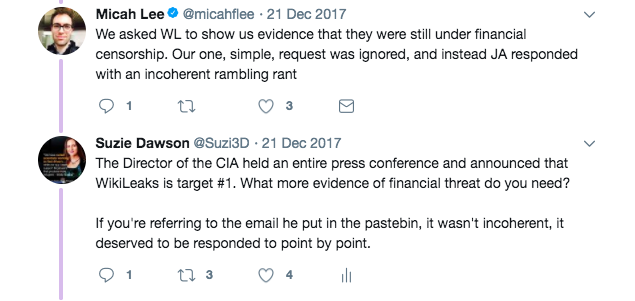
At this point, we must ask cui bono? Who would benefit from stripping WikiLeaks donors of their anonymity and potentially exposing them to liability?
Cutting off the anonymous donation channel has the potential to put supporters of free press around the world at risk.
Sacrifice (and Love)
Shortly after “Risk”, Laura Poitras’ documentary on Julian Assange and WikiLeaks, came out, I read every review of it that I could find, before finally watching the film myself.
Most reviews parroted each other; the tabloid narrative of conflict between producer and subject was too tasty a morsel to pass up.
At the original 2016 Cannes screening of “Risk”, Poitras appeared alongside Jacob Appelbaum and Sarah Harrison, playing down any suggestion of conflict between herself and Julian Assange.
Question: “We believe through media that while making this documentary you had a kind of a series of differences of opinion with Mr. Assange and that you were not on great terms while you were making the film. Is it true?”
Laura Poitras: “I’m actually curious what your source is. I mean I’m very supportive of the work that WikiLeaks does and I think the work that I’ve done and the work that WikiLeaks has done, that we’re concerned about similar things and very concerned about what the US government is doing internationally. When we first started doing the reporting on Edward Snowden’s documents, one of the first things that the mainstream media did was this comparison model and I think that this is a really kind of move of the mainstream media to try to separate people and I actually think that, you know, Edward Snowden came forward after, I mean what he did came after, very much after Chelsea Manning and its not about comparing the two, it’s actually about looking at what they’re revealing, and so I think that, you’re taking a narrative and um, sort of following what the mainstream media is saying so I actually disagree with it.”
Also at Cannes, Jacob revealed that some of the most significant reporting on the Snowden documents had been undertaken in collaboration with WikiLeaks and had the full support of Julian Assange:
Jacob Appelbaum: “All of the reporting that is not shown in this film such as for example the Merkel phone story where we revealed that the NSA was spying on Chancellor Merkel as well as lots of other reporting including other media relationships, all of the time that I have worked with Laura in Berlin in the last three years was directly supported as WikiLeaks, these things that we were doing were supported directly by Julian with the understanding that sometimes the best thing to do is to partner up and not put WikiLeaks on the by-line because the most important thing is to get the news out and the facts. And the fact is Julian is a political prisoner who is being demonized in the press.”
This is extremely interesting because WikiLeaks’ detractors accuse them of taking credit for other people’s work. On the contrary, the above reveals WikiLeaks not taking credit for major achievements that they helped to bring about.
Poitras re-cut the film into a significantly different beast, alienating many of its participants. She then reversed her Cannes denials and admitted to her personal conflicts with Julian. (She also revealed her personal relationship with Jacob Appelbaum.)
The revised version of the film leaves a lot of questions unanswered. I was able to fill some of the gaps by watching countless shorts of interviews with Poitras and other characters, but the most gaping holes that may never be filled are the untold hours of footage Poitras shot and never released.
Poitras has left major pieces of the puzzle on the cutting room floor.
There were two very subtle revelatory moments that moved me deeply. Each were simple yet poignant and emotive: The first, Sarah Harrison’s hand rubbing Julian’s back, displaying a tenderness that transformed my view of his experience inside the embassy all these years.
There is nothing more perfect in this world than genuine love, and for Julian to have been party to it is a priceless gift.
This insight into Sarah and Julian’s relationship redefines the sacrifice and risk involved when Sarah went to Hong Kong to help Edward Snowden.
In the Grand Master Chessboard, this was Julian’s Queen being sent out onto the playing field. It was a high stakes move for a high stakes win. It denotes a willingness to make personal sacrifice where principles demand it. The legal ramifications of saving Ed physically parted Sarah and Julian from each other and elevated their target status in the eyes of the governments who have been persecuting them.
The price of their victory was three long years without that tender touch. Never once did they acknowledge the sacrifice, or complain.
This historic relationship is seldom given its full due by the press.
While Julian is depicted as the primary representative of WikiLeaks, he has had an intelligent, brave, accomplished and beautiful woman working with him every step of the way.
 Sarah, alone in Berlin. Photo by Jacob Appelbaum
Sarah, alone in Berlin. Photo by Jacob Appelbaum
The second moment in “Risk” that stood out for me, was extremely brief but enough: the look on Christine Assange’s face when she turns to the camera as Julian is departing the hotel room in disguise, to travel to the Ecuadorean Embassy and seek asylum.
Julian’s courage is at a minimum, second-generation. But more shows through: there is an element of disdain. It is as if Christine knows too well that the camera is a tool both of benefit and betrayal.
There is a lack of self-consciousness in “Risk”. Just as it condemns Julian, at times it unwittingly exonerates him as well.
“It looks almost certain now that it’s going to be Hillary versus Trump. Basically it will be Hillary versus Trump unless one of them has a stroke or is assassinated. So that’s quite a bad outcome in both directions. We have a definite warmonger in the case of Hillary, who’s gunning for us, and in the case of Trump we have someone who is extremely unpredictable.” – Julian Assange, in ‘Risk’
In an Associated Press promo video, Laura lends credence to WikiLeaks’ foresight as the genesis of secure whistleblowing platforms:
Laura Poitras: “Julian is somebody who, I think he understood that there was a new era in journalism, and that there would be a need for tools to protect sources, to use encryption, creating this anonymous submission platform, we didn’t know that in 2006 right? That the government was going to be able to monitor what your phone is and if a source calls you, right? So that its not enough for a journalist to say I will protect my sources if the government is able to understand who you met and where.”
A screen in ‘Risk’ reads:
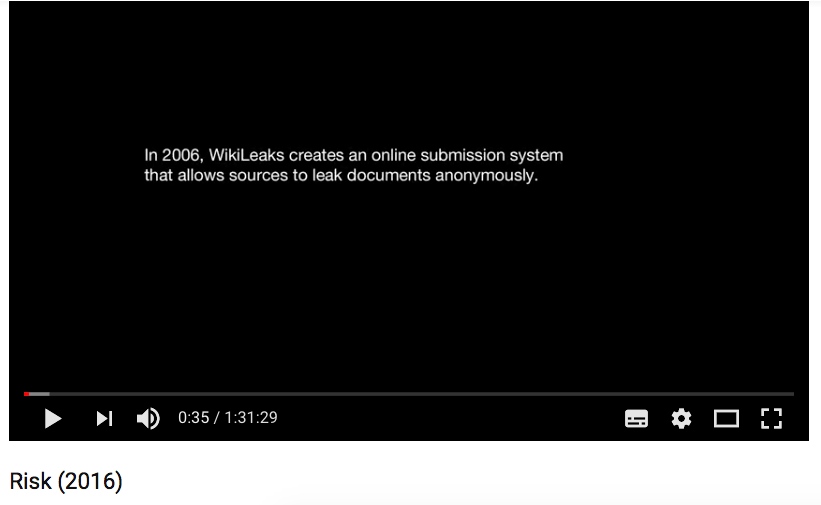
The much-touted displays of sexism in the film, are a double-edged sword. In portraying Julian as a chauvinist, the film stripped out the significance and the accomplishments of the many women working alongside him, diminishing their relevance and downplaying their contributions to the events depicted.
WikiLeaks lawyer Melinda Taylor explains:
“The content was selectively edited and taken out of context and it shows persons who never agreed to be in the film… if you’re showing a documentary about WikiLeaks, you should be talking about source protection, you should be talking about government surveillance, which was the real purpose of the film, or what they were led to believe the film would be about… WikiLeaks is the star of the documentary yet its been edited in such a way that you would think that Assange is WikiLeaks and there’s no one else. The women have been completely edited out of their process, they’ve been denuded of all agency, they’ve been shown as slavish minions…”
Risk‘s hypocrisy in claiming to denounce chauvinism while simultaneously reducing the women in its scenes to irrelevancy, led to a wonderfully karmic direct result: in its wake, the world got to learn much, much more about the women of WikiLeaks.
To better the interests of women, one must be prepared to celebrate them. Poitras’s very male-centric filmmaking, totally missed this opportunity.
But the beef wasn’t just about attitudes to women or feminism. It seems that at the time of re-cutting the film into its second incarnation, Poitras very much believed in Russiagate, and in the specific allegation (now extensively debunked) that Roger Stone was the key to proving a back-channel to WikiLeaks. On the promotional circuit and sharing a stage with Jeremy Scahill, Poitras stated of the #DNCLeaks:
Laura Poitras: “It was clear that it was going to be significant, [WikiLeaks] were on the world stage in a way that they hadn’t been I think since 2010, right, at that same level, that was obvious. I guess I needed to have a little bit of an understanding about what had happened. Jeremy and I just had a talk about this before, he just did an interview with Julian for The Intercepted, Jeremy’s podcast. Where things stand, or what we believe to be accurate, is that there was a hack that was conducted by Russia that a certain amount was submitted through an intermediary or cutout to WikiLeaks and that Julian denies that his source is a state actor.”
In response to a question by another audience member, Jeremy Scahill said “I think that the lives that have been impacted for the positive by WikiLeaks – it’s too many to count.”
This was a welcome acknowledgement, coming after Scahill had earlier denounced Julian as “sexist“, and inappropriately quipped that Assange could be compared to Bill Clinton.
“It would be very interesting to see a film that compared the lives of Julian Assange and Bill Clinton in this way…“
When no one laughed, Scahill quickly backed out of his poor attempt at humour with “…no, I’m sorry” and swiftly moved on.
The apparent inability of self-styled defenders of women to differentiate between the physical and deliberate violence of actual rape, such as Bill Clinton’s rape of Juanita Broderick, compared to disagreements over condoms or in the case of Appelbaum, non-consensual back-washing, kissing someone in a bar, propositioning someone or making bad jokes, undermines and is frankly depressing to, those of us who are survivors.
Sexually harmful behaviors and other aspects of rape culture can and should be denounced and deplored, without having to equate it to rape. The proclivity of the liberal set for doing so waters down and diminishes the experience of rape victims, and the seriousness of it. It seems to be yet another function of privilege, to bandy about terms such as “rape”, “rapist”, and “serial rapist” without understanding the repercussions of doing so.
Rape is an assault on all five senses. For a protracted period of time thereafter, it renders you almost unable to live inside your body, to live inside your life. Unable to preserve your sensory perceptions or restore them to how they functioned before the rape.
To falsely describe sexually problematic behavior common amongst the entire population as “rape” belittles and undermines survivors, as does unfairly expanding the definition of what constitutes a rapist, or branding every man a rapist by affiliation. Doing so causes many men who are not rapists to recoil from confronting what does need to change. It dissuades them from meaningfully engaging on legitimate issues. It encourages an inevitable and counterproductive backlash, that needn’t have occurred.
I was the first to meaningfully investigate JakeGate, at a time when it was anathema to do so, well before the European press followed suit. I did so because I instantly recognized that what the smear website presented as victim accounts, contained stark differences to the common attributes of survivor testimony.
As I dug deep down that rabbit hole, I found dozens more alarming implications behind what was going on with the activists and organizations involved, than merely what they were presenting on the surface.
Some aspects of which tie back to the extremely important work Laura Poitras and Jacob Appelbaum were doing together, before their relationship imploded.
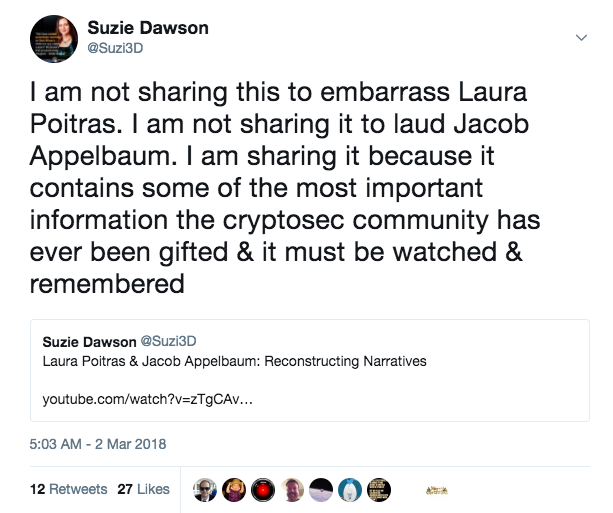
Critics of Appelbaum decry the idea that he should still be remembered for doing “good work”. The truth is, he didn’t just do good work. He did vital, critical, essential work that very few if any have stepped up into his place to continue.
He worked with Guantanamo victims. He exposed surveillance technology that no one else had. He travelled around the world, helping at-risk activists and journalists to evade the targeting they were being subjected to by their governments.
In the above video, Poitras and Appelbaum are studying names from the NSA Kill List sourced from the Snowden files.
During those final years of his public advocacy, Appelbaum periodically jokes that if he is killed, that it was murder. While he smiles and laughs as he says it, there was a dark truth underlying his sardonic humor. For if he hadn’t been neutralized, socially neutered, in the way that he eventually was – if he hadn’t been made persona non grata by the very communities who he worked to insulate from governmental targeting – he may well have eventually been killed.
The ease with which the US empire can add a name to the list for assassination is evidenced in that very presentation by Poitras and Appelbaum. While the bar for inclusion is far lower in a war zone, only the naive believe that state-sanctioned killings of certain journalists and dissidents doesn’t also occur in the West.
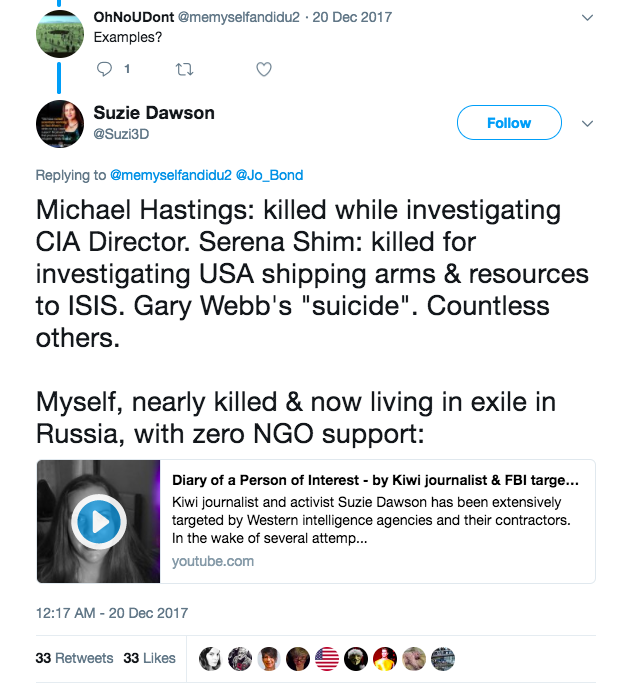
We are hurtling towards a future where weaponized drones will be deployed above the heads of all Western citizens. Where it is not inconceivable that extrajudicial execution of “threats to national security” will occur on our own soil with little fanfare, just as they already do in Yemen, Somalia, Pakistan, Afghanistan, Syria, Iraq and god knows how many other countries.
It is this level of threat to human rights that we are up against. Being honest about the risks of activism is part of helping people to understand why they must join the fight to prevent those risks from worsening and spreading.
Most dissidents in the West will never rise to the target level of a Julian Assange or a Jacob Appelbaum. Acknowledging the threats that do exist for some of us, empowers people to better empathize with and support us.
Part of our duty of care to other activists is to share with them the full extent of the knowledge we have about the systems and methods employed against us, just as Appelbaum consistently did.
Why “Risk” is so titled is self-evident. The risks are real.
Everyone involved in the Snowden reporting was at risk – none more so than Snowden himself. Likewise, everyone involved in WikiLeaks – none more so than Julian. Just as everyone who was involved with Kim Dotcom, or anyone else who is being targeted by the upper echelons of the US Empire.
To openly state so shouldn’t be shied away from. It is a simple fact of our existence.
But there are different types of risk, too.
“I can’t believe what he allows me to film..” Laura says of Julian, in ‘Risk’.
But Assange wasn’t just letting her film it. He was intending to leak the true history of WikiLeaks to the public: Poitras was only meant to be the conduit.
Laura acknowledges this in a Showtime promo: “I actually think he wanted there to be a record of what was happening.”
The movie covers momentous events of enormous historical value: Julian living under house arrest, working on massive publications, attending court, adopting a disguise and making the mad dash to the Ecuadorian Embassy, engaging in conversations with lawyers, diplomats, celebrities, his mother.
This was supposed to be the focus of the movie. This was the grounds under which WikiLeaks staff gave consent.
At 1:53 in the Showtime video Laura says of her conflicts with Julian over the final cut: “I do find it somewhat ironic that he’s trying to censor the content of the film given the ideological mission of what WikiLeaks does.”
After many hours of pondering this, I realized Poitras’ movie is the personification of the curation debate.
Sitting in her editing suite, Poitras was the curator. By refusing to allow the affected parties to have any input in that, she was retaining control over which pieces of their lives and relationships would be allowed to shine through, and in what light.
The WikiLeaks model would be to simply release all of the footage. The curated model of film making, is to take the footage captured, then edit it into a narrative, package it and release it. They refer to film making as a craft.
Thus events are vulnerable to the creative decision-making of the filmmaker, long before they are subject to the interpretations of the audience. Assange’s very acerbic, very outlandish, very Aussie sense of humor, becomes impropriety in the view of an American liberal filmmaker’s lens. Even though I as a viewer recognize his acerbic wit for what it is at its core, it has been presented to me as something else. The editing has made it third-hand information. Less witnessing, and more Chinese whispers. It has become a script.
These contrasting viewpoints, are at least very human. Two ways to image any single whole. Refracted light, which Poitras loves to fill her frames with; sunbeams and shadow… become representations of the difference of opinion.
These can be forgiven. They come down to the beholder.
Less forgivable, are blatant lies and untruths.
Blatant Lies and Untruths
For reasons unknown, FBI whistleblower Sibel Edmonds has a long track record of criticizing other whistleblowers and those who promote their work. Her target list includes Daniel Ellsberg, Glenn Greenwald, and in particular, Edward Snowden.
Her publishing organization, Newsbud posts articles and videos deriding all of the aforementioned and many more.
Recently, Edmonds interviewed Whitney Webb of MintPress News (disclosure: I wrote for MintPress for several years) on her recent series of articles about the connections between Pierre Omidyar, PayPal, The Intercept, Glenn Greenwald and the Freedom of the Press Foundation.
The articles are postured as being a defense of WikiLeaks, but do so by attacking all of the aforementioned.
Edmonds introduces Webb’s work as being “solid investigative journalism” although it is little more than an aggregation of circumstantial facts from the public record, strung together into a derogatory narrative.
The Edmonds/Webb interview contains a number of falsehoods.
At 3:20 in the video, Webb kicks off by suggesting that The Intercept was only launched to report on the Snowden documents: “its come out over the years their whole basis with the Snowden leaks and whatnot ended up not really becoming true, they’ve had a lot of other stories that have come out that don’t really have anything to do with those documents…”
The Intercept’s launch announcement from 2014 contradicts Webb: “Our central mission is to hold the most powerful governmental and corporate factions to account and to do so, we will report on a wide range of issues.”
Webb continues, speaking of the Snowden documents: “there was a document that came out at the end of last year and it was one of the first Snowden releases that The Intercept had had come out in a really long time.”
In one of her many attacks against Glenn Greenwald on Twitter, Webb stated:
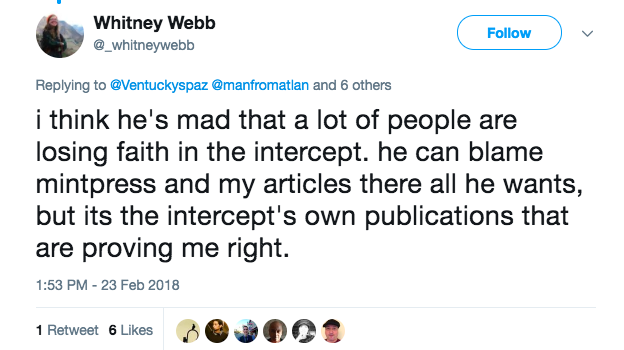
In 2017 The Intercept released up to 600 Snowden documents, with nearly a dozen individual reports based on them.
Webb’s claim to the contrary betrays her total ignorance. All Webb would have had to do to educate herself on the topic, is to have visited their website and clicked on “Documents”. Her failure to do so demonstrates total ineptitude.
Edmonds and Webb follow this up with multiple assertions (also commonly circulated on social media) that The Intercept deliberately withheld the file Webb referenced.
“The document that came out was an NSA document… The Intercept had sat on that document for about four and a half years at the time.”
Webb has no basis for making this claim: It is impossible to substantiate any intent on behalf of The Intercept to suppress the release of an individual document.
Julian Assange contextualised the issue of the founding rationale for The Intercept and pointed out that no intent can be ascribed, re withholding a specific document:
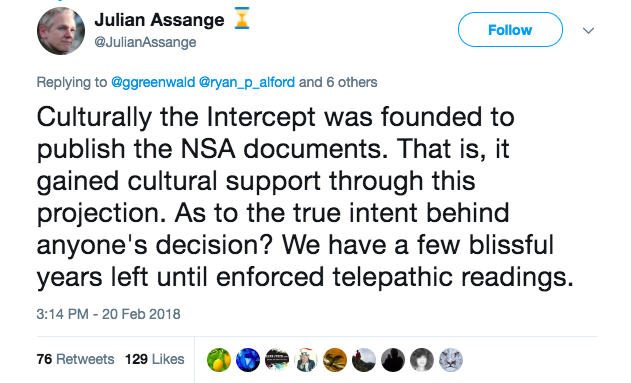
Edmonds and Webb’s focus on Omidyar and PayPal (which I think is entirely valid) swiftly expands to outright slander of Glenn Greenwald and Edward Snowden.
By 4:40 in the video, Sibel is calling the veracity of the Snowden leaks as a whole into question while Whitney cackles throughout.
Sibel states “the birth of The Intercept was based on the so-called Snowden case, the supposed Snowden leaks, let’s put it that way. And Glenn Greenwald. Supposedly there is this whistleblower who leaks supposedly over 500,000 pages and he doesn’t leak it. He gives and he hands this information over to this supposed investigative journalist Glenn Greenwald…” [emphasis added]
Sibel’s repetitive language is a common manipulation tactic reminiscent of neuro-linguistic programming: She has no hard evidence that Snowden’s leaks weren’t leaks, no evidence that Snowden isn’t a whistleblower, no evidence that he leaked 500,000 pages (Greenwald & Snowden themselves have quantified the archive as being substantially less than that) and she sure as hell has no evidence that Glenn Greenwald isn’t an investigative journalist. Especially given his many years of investigative journalism pre-dating the Snowden releases.
By 9:00 Webb is stretching herself thin, trying to depict Booz Allen Hamilton’s tacit connections to the Omidyar Network as being somehow related to the Snowden leaks. She says “the Snowden-Omidyar Booz Allen Hamilton connections… they’ve been called the most profitable spy agency, James Clapper was an ex-Director… if you remember back to the Snowden story years ago, Snowden worked for Booz Allen Hamilton… even though the pace of the leaks has been truly glacial, Snowden hasn’t complained at all..”
The implication is that Booz Allen Hamilton has somehow benefited from the leaks, as if it was a positive development for them to be globally humiliated for having one of their employees compromise their systems, extracting thousands of top secret documents and transporting them across international borders.
Meanwhile back in reality, Booz Allen Hamilton’s stocks plummeted in the immediate wake of Snowden disclosures. There was open musing as to whether the company would survive the scandal.
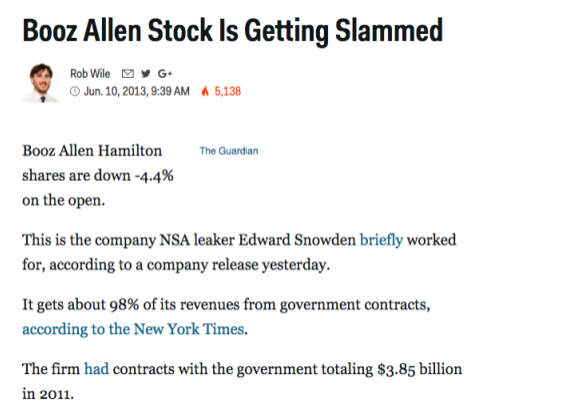
This, for what Webb described as “the most profitable spy agency” was not a boon at all. It was a looming fiscal armageddon.
Incredibly, Webb and Edmonds repeatedly reference a #GIFiles release that revealed intelligence contractor HB Gary’s efforts to discredit WikiLeaks, by targeting Glenn Greenwald because of his support for them. Within minutes of presenting this as evidence of the threats WikiLeaks faces, Edmonds is ripping into Greenwald, suggesting that he was some kind of gay porn king on the lam from the US Government, in hiding in Brazil. Malicious rumors spread by none other than the FBI in the immediate wake of Greenwald’s Snowden reporting.
Webb tried to weasel out of the outlandish claims after the fact, by blaming them all on Edmonds. It went down like a sinking ship.
Julian Assange called Edmonds’ attacks on Glenn “scurrilous“. I couldn’t agree more.
The inanity of referencing the HB Gary plot to undermine Greenwald’s support of WikiLeaks, before attacking Greenwald mercilessly, seems lost on both Edmonds and Webb.
Fortunately, Julian and Glenn have a ton of well-earned mutual respect and have been around way too long to fall for Edmonds’ Divide and Conquer scam.
Webb’s litany of falsehoods about Glenn and The Intercept seems endless. She has essentially taken legitimate critiques about Pierre Omidyar – a member of the billionaire club – and stretched it to tar anyone vaguely connected, with the same brush.
Glenn was having none of it, and ripped it apart in two seconds flat.
Unfortunately, Webb’s nonsense wasn’t limited to Sibel Edmond’s show. She put in another dismal performance on Stranahan.
At 7:20 in the interview she almost nails a key point, but still hadn’t done enough homework to get it right. Webb states, of the Freedom of the Press Foundation: “its board of directors are almost all writers for The Intercept or people like Edward Snowden.”
There is a very key common thread between the majority of members of the Freedom of the Press Foundation (FPF) board. But it is not The Intercept. It is the Electronic Frontier Foundation (EFF).
Of the nine members of the board of FPF, five (at a minimum) have direct ties to the EFF.
John Perry Barlow, of course, was a co-founder of EFF. Rainey Reitman is the current Activism Director at EFF. Micah Lee was a staff technologist for the EFF. Trevor Timm, the Executive Director of the FPF (essentially the operational manager) is also ex EFF. Laura Poitras has worked with the EFF’s legal team. There are further direct ties to the EFF on the FPF staff and on their Technical Advisory Board.
This is the real smoking gun that contextualises the FPF board decision to cease funding WikiLeaks – not connections to The Intercept, as Webb claims. (More critical info about the EFF appears later in this article)
By 12:45 in the Stranahan interview, Webb is making more erroneous claims about The Intercept’s Snowden reporting. She now states that “three stories a year have come out on these documents.” As has already been demonstrated, this is patently untrue.
By 13:00 Webb is claiming “as the FBI whistleblower mentioned in my story, Sibel Edmonds, she exposed in 2013 that a lot of the Snowden leaks factually contained information that is very damning for Paypal, and Paypal’s connection to the US government, the NSA, the CIA and the Treasury Department so it seems like Greenwald has changed his stance on leaks since being employed by The Intercept.”
This slur by Edmonds tracks back to 2014.
When taking aim at Glenn Greenwald and The Intercept, Edmonds and Webb are attacking the only remaining media organization still publishing the documents, and the only organization to have engaged in bulk releases of Snowden files.
Edmonds and Webb don’t just produce work attacking Greenwald and The Intercept, they also rake the Freedom of the Press Foundation over the coals.
But to what end?
Just as with the post-election conversation, the prevailing narratives about the FPF decision to cut off WikiLeaks have fallen along two strictly diametric lines:
- Freedom of the Press Foundation is good and WikiLeaks is bad (promoted by Micah Lee/EFF people)
- WikiLeaks is good and the Freedom of the Press Foundation is bad (promoted by Whitney Webb/Sibel Edmonds)
Whichever of the above you have so far believed to be true, serves the same agenda.
The truth can only be discovered by taking a much closer look at how the decision to cut off WikiLeaks was reached.
In doing so, we will discover that there is a third way to view the situation. A middle way.
Game Theory and the Middle Way
Just as Greenwald recently said of RussiaGate: proponents should take it to its logical conclusion and ask themselves what that is?
The same applies to this situation with the FPF. What is the net result if we assume Micah Lee’s position? What is the net result if we adopt Sibel Edmonds and Whitney Webb’s?
Both outcomes serve the intelligence agencies.
In Micah Lee’s version of what happened, the Freedom of the Press Foundation made a unanimous decision to cut off funding to WikiLeaks as there was no evidence that the banking blockade remained in place.
Edmonds and Webb allege corruption, claiming the Freedom of the Press Foundation cut off WikiLeaks because they receive funding from billionaire Pierre Omidyar.
Both narratives neglect to mention that the issue was actually a bone of contention resulting in a long running debate within the FPF. An internal conflict that included the resignation of a board member and may have presented an existential predicament for the organisation.
The November 2017 article “Free Press Group Ready To Cut Off WikiLeaks“, by Kevin Poulsen and self-confessed ‘Petraeus Cultist’Spencer Ackerman, preceded the official announcement by the FPF of the decision having been reached.
The article attempts to justify FPF’s impending action by making a number of claims about WikiLeaks that have been disproven. Including outlandish statements like “WikiLeaks has made common cause with extreme right-wing forces, principally Donald Trump and Vladimir Putin” and poses a dangerous, reckless question: asking if WikiLeaks has “become something else, something less journalistic, during the election?”
WikiLeaks has earned its journalistic status more than arguably any other media organisation on earth, having endured personal risk and hardships at a level unmatched in its generation. The tacit attempt by these reporters to strip WikiLeaks of journalistic protections retrospectively is cowardly and underhanded.
Poulsen and Ackerman also drastically downplay the significance of FPF’s cutting funding to WikiLeaks, writing: “The practical effect of the move is minimal—WikiLeaks donors in America may no longer be able to claim a tax write-off.”
As demonstrated earlier in this piece by way of Daniel Ellsberg’s original statements about the purpose for the donation channel, the implications for WikiLeaks supporters go well beyond that simplification.
Poulsen and Ackerman attribute direct messages to Julian Assange, without sufficient evidence. Their only ‘proof’: the same tweet later linked to by Lee and Currier, of Assange suggesting that Donald Trump consider “our offer to… open a hotel-style embassy in DC with luxury suites for whistleblowers.”
An obvious joke that many reporters have disingenuously taken at face value.
It is frankly idiotic that the use of the word “our” in the above tweet is the basis for Poulsen, Ackerman, Lee and Currier’s conclusion that all WikiLeaks account messages are sent by Julian Assange.
The recipient of the messages, Xeni Jardin, shared them with the FPF Board in the wake of the 2016 election. Jardin resigned as a Board member in December 2016, and told Poulsen and Ackerman that she had felt “unsupported“. Their article states that “Micah Lee was the only board member at the meeting to agree the time had come to cut ties” (with WikiLeaks).
It took “a year-long debate among the directors at the Freedom of the Press Foundation” before a statement by FPF Executive Director Trevor Timm confirmed that consensus on the question of funding WikiLeaks was finally reached in October 2017.
Multiple other figures sourced in the article confirmed that the issue had divided the Board. It took the reframing of making it about whether the banking blockade was still in existence, in order to justify the decision to sever WikiLeaks.
This blows apart the notion that the decision was in any way related to FPF’s funding, connections to The Intercept or to Pierre Omidyar. Else why would it have taken a year to achieve, after the loss of the Board member who originally raised the issue?
Laughably, Micah Lee told Poulsen and Ackerman “Protecting free press rights for publishers we disagree with is important… but that doesn’t mean WikiLeaks should be able to harass our board members without consequences.”
It is highly debatable whether the few direct messages received by Jardin could be considered harassment; predictably Micah Lee’s far more protracted and public harassment of WikiLeaks and of Julian Assange goes completely unmentioned.
Snowden himself is subtly targeted by the article, which twice alludes to having unnamed sources that are leaking Snowden’s alleged opinion to them:
“Snowden, sources close to him tell The Daily Beast, has felt for a long time that Assange has taken WikiLeaks far from a positive, constructive vision of what Snowden believes WikiLeaks could or should be.” – Poulsen/Ackerman
“Several members of the board, including Snowden, have grown disenchanted with WikiLeaks. Snowden has for some time considered it to have strayed far from its laudatory transparency and accountability missions, sources familiar with his thinking have told The Daily Beast.” – Poulsen/Ackerman
Like Assange, Snowden is very careful in his public appearances to never speak on behalf of any other individual. He is extremely unlikely to utilise others to leak information about his opinions to, of all people and places, FBI informant Adrian Lamo’s close pal Kevin Poulsen or the Chelsea Clinton-affiliated The Daily Beast.
Those who are close to Snowden or Assange are known to fiercely guard their privacy, by necessity and out of respect.
This means others involved with FPF are referencing Snowden to try to shore up their own positions, and Poulsen/Ackerman are masking the identities of those people.
The subtext of their article is “You might not comment directly to us but others will, Snowden. You have a leaky ship.”
Edward Snowden is a man smart enough to swipe the NSA’s most closely guarded secrets from under their nose, ensure it becomes global news and live to tell the tale. He is the last person on earth who would need to be told to keep his friends close, and his enemies closer.
As President of the Board, Snowden’s role is to preserve the ability of the executive to function smoothly, in service to the integrity of the organisation. Having dragged out over the course of a year and already suffering the loss of a Board member, the drama is likely to have caused him more than one headache.
Interpersonal issues and ideological conflicts between Board members may have become the first serious existential threat to the organisation.
If it came down to maintaining their ability to move forward as a group or risking implosion, the eventual unanimous vote to sever WikiLeaks may have been less about WikiLeaks and more about protecting the viability of FPF as a going concern.
This is the third way – the middle way – to view the situation. It is not a case of FPF and WikiLeaks respectively being ‘bad’ or being ‘good’.
It is a case of an organization with internal conflicts and multiple forces pulling it in different directions, being pressured over a long period of time to cut ties with another beleaguered, under attack organization.
Like most things in life, the situation is complex and nuanced.
We need to see through the too-easy narratives spun by people like Poulsen, Ackerman, Lee, Currier, Edmonds and Webb.
WikiLeaks fans must not be tricked into showing their support by attacking what are in reality, other WikiLeaks supporters.
Nor should fans of the Freedom of the Press Foundation be goaded into attacking a media organization targeted by the State.
Picking one side or the other in this fight, is detrimental to both.
Saving Ourselves
Throughout history, it has never been established institutions that have saved us or progressed our society, but average citizens banding together to support each other and achieve change.
NGO support is usually reactive, and seldom proactive. They rise for only those who it is in their own political or public relations interest to do so. (Or for those whom have independently achieved a level of public awareness of their situation that if ignored by the NGO, would materially damage their reputation.)
Furthermore, almost without exception, NGO’s accept money from the same governments and military entities that are the root cause of the problems the NGO’s profess to address.
FOIA research specialist Rachael Tackett recently described this to me as the “NGO Industrial Complex.“
Tackett sought me out after seeing me tweet about the Electronic Frontier Foundation (EFF). She pointed me towards her October 2017 analysis of their funding, which includes money from the State Department’s ‘Internet Freedom’ fund, by way of the Broadcasting Board of Governor’s Cold War project ‘Radio Free Asia’, an infamous foreign propaganda wing of the US government.
Tackett writes:
“Much heralded in the media, the Electronic Frontier Foundation (EFF) is depicted as championing digital civil liberties and fighting the US government’s mass surveillance. EFF also receives money from the same government that it claims to fight.“
The EFF has explained away the funding source by stating that the contributions are not “directly” from the U.S. government but “originate” from it. The source it is directly from, Radio Free Asia, is notoriously opaque.
Tackett explains “Since Radio Free Asia has failed to file the transparency reports, the money that Radio Free Asia gave to EFF does not appear on USASpending.gov, the US government’s funding transparency website.”
Tackett continues:
EFF also argues that the Radio Free Asia money is allocated towards specific projects rather than general funds. But this argument doesn’t hold water: How the money is spent is less consequential than the fact that EFF is a State Department vendor.
Of greatest concern, is the Congressional stipulations for the funding in question:
The EFF isn’t just accepting government dollars; it is receiving funding earmarked explicitly for advancing US national security and foreign policy interests.
Although it considers itself to be an activist organisation, the EFF has been targeted by Bay Area activists for their connections to Google and other corporates.
 The headquarters of the Electronic Frontier Foundation, targeted by activists
The headquarters of the Electronic Frontier Foundation, targeted by activists
Look at the bios of EFF’s current staff and you find International Relations degrees, an ex Twitter employee, multiple ex Google employees, ex Department of Commerce and multiple Obama White House employees.
Reading the Advisory Board page reveals that the Google Public Policy fellowship program places staff members directly into EFF.
In a recent podcast interview, “Surveillance Valley” author and journalist Yasha Levine says of the EFF:
“It’s a corporate think tank. It’s a corporate think tank that’s – it’s main objective is to appear as a grassroots organization but that in reality is wholly carrying water for its corporate donors. So you’d call it an astroturf group… it represents the interests of its corporate sponsors because its completely funded by Silicon Valley so of course its going to represent its interests. But its power lies in convincing us that it cares about our interests and the interests of average Americans…”
Unfortunately Levine then goes on to make the claim that EFF never criticizes Google or draws attention to surveillance implications in the private sector. This claim is contradicted by a simple search of EFF’s social media accounts.
But that is far from an exoneration of Google and EFF’s close relationship. A comment on the podcast page reads:
Julian Assange previously wrote an entire book – When Google Met WikiLeaks – on the deep ties between Google and the State Department, suggesting that they are essentially one and the same.
Look at the bios of the EFF Board of Directors and you discover:
- a Computer Science Distinguished Career Professor of Carnegie Mellon University – the institution famously caught accepting $1 million from the FBI to unmask Tor users after receiving a subpoena
- an ex-Obama White House Science and Technology policy developer, also ex-Department of Health and Human Sciences, and ex-CTO of the World Economic Forum, the literal hub of globalism worldwide
- ex-Vice President and General Counsel of Verizon Communications, a massive telco neck deep in domestic spying programs, also an advisor to the G8
- Shari Steele – EFF’s ex Executive Director for 15 years, famously married to a self-admitted NSA contractor (you can read his blog about her). Shari moved from the EFF to Tor in December 2015 and within six months oversaw the rolling of the entire board of the Tor Project. Despite having moved to Tor, she remains on the board of the EFF.
The ties to the World Economic Forum (WEF) are particularly interesting. Founded by an ex-Bilderberg steering committee member, the Forum brings a who’s-who of monied elites from industry and government together to plot out the future of humanity. They openly advocate trans-humanism, corporatism and globalism.
Membership of the WEF starts at $50,000 for an individual and $500,000 for a company. Per year.
The WEF meeting at Davos was where EFF co-founder John Perry Barlow famously wrote his A Declaration of the Independence of Cyberspace in 1996.
Indeed the WEF immortalized the recently deceased Barlow in this poignant obituary, which screams about openness and internet freedom until you get to the fine print.
After waxing lyrical about his ideals the narrative switches to undermine them:
“There is general consensus that the path we are on is not sustainable. But there are no silver bullets here. We want to be able to leverage large-scale intelligence to stop human trafficking, while also protecting the privacy of the vast majority.”
In the above, “large-scale intelligence” is a euphemism for mass surveillance.
Shortly thereafter, the obituary propagates the idea that user fears over the sovereignty of their own data are irrelevant in the information age:
“We can argue all day about “Who owns my data?” – but in an internet world, as data is an infinitely replicable, non-exclusive good, does the question even make sense?”
The obituary quotes:
“Cindy Cohn, the executive director of the Electronic Frontier Foundation and a long-time co-worker of Barlow’s, accepts he was “sometimes held up as a straw man for a kind of naive techno-utopianism that believed that the internet could solve all of humanity’s problems”.”
While going on to frame the internet as being a melting pot of the collective decisions of millions of users, the article tacitly admits:
“Governments have fully understood the power such a ubiquitous medium offers – both in terms of gathering intelligence and exerting influence.”
There can no longer be any doubt as to the extent that the EFF is in bed with government. State Department programs are not the only government entities that have been receiving EFF invoices.
There is a long history of EFF employees and/or the organization as a whole, contracting directly to the intelligence agencies that it attempts to hold to account.
Knowing that EFF founder John Perry Barlow was a treasured friend of Julian Assange, I was extremely surprised to discover just how far back EFF’s relationships with the intelligence community stretched and how deeply entrenched they were. I learned about the connections from Barlow’s own words.
In a massive article for Forbes in 2002 entitled “Why Spy?”, Barlow recounts his then-decade plus of contracting to the CIA and NSA.
I’m not going to attempt to regurgitate all the key points here as there are too many – it simply must be read in full. In it, Barlow is seen in all his complexity – admonisher of bureaucracy and secrecy, but admirer of General Michael Hayden. Critic of the intelligence agencies, yet longtime financial beneficiary of them.
I don’t presume to judge Barlow. My gut instinct says that Julian would know far more than I ever could about who John Perry really was and what merit he brought to the table, both personal and professional.
But I can say this: In the wake of SecureDrop developer James Dolan’s passing, I discussed what I’d learned about Barlow with a major WikiLeaks supporter on an unencrypted forum.
That person pointed out that many of our extended friends in privacy activism had ties to or had worked for intelligence agencies. I responded that the litmus test for Barlow’s legitimacy, would be whether or not he had become a target. For one is not able to act against the interests of the intelligence agencies, without falling into their crosshairs.
In all my years of activism I’d never heard a single bad word said about the EFF. Nor was I aware of any discernable smear campaign against them, such as has been employed countless times against other activists and organizations. I surmised that the lack of institutional attacks against EFF suggest that the organization is not a target. I pointed out that I didn’t know Barlow personally, but that those who did would be able to quickly determine whether he was made to pay a price for his criticism of the agencies and his support of Snowden, Julian and WikiLeaks.
That was in January. By February 9th, the Freedom of the Press Foundation and others, were announcing that Barlow – who it was widely known had been very ill for an extended period of time – had passed away. On the 22nd anniversary of his authorship of the Declaration of the Independence of Cyberspace.
EFF has four current lawsuits against NSA:
First Unitarian v. NSA: EFF’s case challenging the NSA’s phone metadata surveillance
Jewel v. NSA: EFF’s case challenging the NSA’s dragnet surveillance
Hepting v. AT&T: EFF’s case that challenged AT&T’s complicity in illegal NSA spying
Given its ex Legal Director Shari Steele is literally in bed with an NSA contractor, it’s hard to ignore the nagging possibility that, by proxy through the EFF, these lawsuits might effectively be the NSA suing the NSA.
The EFF has also compiled a comprehensive timeline of NSA spying revelations, with zero mention of EFF’s own involvement with and ties to the NSA. Of particular note is their extensive commentary of events in the year 2002 – the year in which Barlow was most closely rubbing shoulders with Hayden. The relationship is not disclosed.
Regardless of what is going on at the top of the organisation, it is abundantly clear to me that at the bottom of it, talented privacy activists are recruited to work on legitimate projects, and to lend the EFF street cred.
FOIA researcher Rachael Tackett also discussed this with me, stating:
“I also wanted to reiterate that some of the people at EFF might believe that they are doing good and trying to do the right thing. Criticism of nonprofits in the US is still a very rare viewpoint to have, especially outside of the more radical anarchist scene. If you engage with some people in the US who work for nonprofits (especially middle and lower employees), some of them may just have zero awareness of who their funders are. They may also not understand the criticisms of nonprofit culture. They could be very confused about why anyone would criticise their organisation.”
It is not long ago that I would have shared their confusion.
The defining moments in my own awakening to the dual-purposes of nonprofits lay within a combination of Chelsea Manning’s testimony at her court martial hearing, and within the Snowden docs.
From the former, I learned that a network anonymity tool heavily promoted to activists worldwide on the pretext of protecting them, is in fact a part of the US military software kill chain.
To be fair, the Tor Project discloses this fact on its website, but uses vastly different language to do it.
Military targeting practices are described as being aimed at “insurgents“, and Tor is framed as protecting the military, rather than aiding them in killing people.
The Global War on Terror by definition, as spelled out by George W. Bush and many intelligence agency executives since, dramatically expands both the definition of who can be defined as an enemy and where. The whole world is a battlefield, we were told post 9/11 and that is precisely what it has become.
In the myriad talks and discussions I have witnessed on the benefits of Tor over the years, never once have I heard frank mention of the fact that prevalent use of Tor was aiding the ability of the US military to mask their kill traffic.
From our #DecipherYou project studying the Snowden documents we have learned about the ways the NSA uses some nonprofit organizations as a cover for its activities, and how it targets others.
At this point, it seems the NGO’s are either forced to be complicit with Empire in order to prosper, or subjected to targeting for maintaining their integrity.
With 99%’ers at the bottom and 1%’ers at the top, it’s pretty clear in which category EFF falls.
I created the following slide to encapsulate the relationships between the people mentioned in this article in the context of the EFF’s relationships to FPF and SecureDrop.
All of the key players involved in developing SecureDrop either have a hostile relationship with WikiLeaks or are deceased.
A majority of the board members of the FPF have extremely close ties with EFF.
Given all of the evidence presented in this article, it can no longer be acceptable for EFF to retain such a heavy influence on the Freedom of the Press Foundation, if the latter is to remain independent.
Provenance
Being Julian Assange is named in homage to arguably my favourite movie of all time, Being John Malkovich. (Its number one placement in my affections is contended only by Leaving Las Vegas).
In the movie, self-hating celebrity-obsessed zombie fans of John Malkovich risk life and limb to enter a portal into Malkovich’s consciousness and live vicariously through him for a limited span of time, before reality strikes and they are spit out, covered in shit, onto the side of the New Jersey turnpike.
Although the plot line isn’t why I chose it as the concept for this article, I can’t help but be amused by the obvious parallels to Assange’s critics.
The fantastic custom graphic design at the header of this article, by @SomersetBean, reflects the poster design from Being John Malkovich. It parodies Assange’s detractors – often hiding behind masks, and always trying to get inside his head.
Freedom of the Press Foundation board member John Cusack’s performance in “Being John Malkovich” is in my opinion a career-best. He artfully assumes a deranged, tortured puppeteer tired of his mundane daily existence, frustrated by his unfulfilled dreams and obsessed with a work crush, who turns access into Malkovich’s inner existence into a pretty profit before his fixation consumes him utterly.
This article has monopolised my time for more than a third of a year. The research phase spanned months. The writing phase was more than two weeks straight of 12-20 hour days. The article now stretches well over 15,000 words and may need to be consumed by readers in several sittings.
The hundreds of hours invested have been for one very grave reason:
I am concerned that Julian Assange is slowly dying in front of our eyes while we argue about his tweets.
While Julian has never asked for our pity – quite the opposite, he regularly shakes off any discussion about his suffering – in good conscience I refuse to be silent in the face of the obvious physical degradation that is resulting from his unjust and illegal arbitrary detention.
The Doctor’s Orders
We can’t say that we haven’t been warned.
More than four years into Julian’s arbitrary detention in the Ecuadorian Embassy, WikiLeaks published the findings of medical personnelwho had examined him, to gauge the physical and psychological effects of his unprecedented confinement.
According to a ‘Trauma and Psychosocial Expert’ who assessed Assange, Julian’s situation is “tantamount to a prisoner being detained indefinitely but without a prisoner’s normal healthcare…”
The ill effects go far beyond those we have commonly heard about – the lack of sunlight and resulting Vitamin D deficiency, the undiagnosed and thus untreated shoulder injury, the lack of dental care (two and a half years ago, Julian needed a root canal and is yet to receive it), or Julian only being able to breathe recirculated air.
There are psychological effects upon Julian that we could only have guessed at, but which the medical reports lay bare.
For he who is hunted by the world’s best funded and most vicious intelligence agencies, to reveal any new avenue for personal attack can present a mortal threat. According to the report, Julian was “particularly reticent” about alluding to “any vulnerability or any concern that his cognitive or emotional faculties might be degraded… as a result of his situation..”
This inability to freely confide in medical professionals, or to admit the full extent of his own suffering to others around him, prohibits it being meaningfully addressed (if this is even feasible anyway).
The doctor reports: “Mr. Assange reiterated that he fears medical information about him will be used against him, and that he cannot appear ‘weak’ in his current circumstances.”
This exacerbates his mental isolation while contributing to the public perception of Julian as being somehow invulnerable or super-human. Thus he is not viewed as empathetically as he should be, and public demands for a humane resolution to his situation have not yet reached the crescendo of urgency that it merits.
The medical report continues: “There is clinical evidence to suggest that Mr. Assange is suffering from significant alterations in his sense of time, space and internal perceptions of his body in relationship to the external environment. These changes are all consistent with the restrictions associated with his current living situation.”
While Julian’s self-perception is being affected by his limited personal space and its physical restrictions on his body, he is fully aware of the extent of the oppressive forces laid out around him beyond the walls of the Embassy.
Police forces, including counter-terrorism personnel, numbering up to 100 full-time positions, staff “three rings of surveillance“ around the Embassy, 24/7.
Menacing incidents and intrusions abound, from plainclothes officers armed with submachine guns, to a would-be cat burglar attempting to scale the facade of the building, to the delivery of an envelope containing white powder.
Constant death threats and calls for Julian’s assassination make the pronouncement by an MI6-affiliated Municipal Court judge that Julian could merely sun himself on the first-floor balcony of the Embassy, both sickly ironic and insulting to the intelligence of the public.
The psychosocial report states: “The system of surveillance as cited by Mr Assange is a constant source of psychological pressure. It is omnipresent reminder of his fundamental vulnerability in his relationship to the authorities.“
Julian himself is fully aware of the paradoxical nature of the aggressive surveillance on his person, and is quoted on it: “My whole life’s work has been in the service of fighting for liberty and the right to privacy. Now I have none.“
The report reiterates this point in the context of its detrimental effects on Julian’s sense of identity and self; noting that the intensity of the surveillance upon a privacy activist creates additional stressor points: “The surveillance described earlier in this report can be viewed as incompatible with Mr Assange’s own ethos and identity when he himself is virtually under a microscope and as such is both traumatizing and destructive to his personality.”
The effects of indefinite detention are listed:
- Chronic anxiety
- Physiological and cardiovascular stress
- Depression and suicide risk
- PTSD
- Personality changes
- Loss of hope
- Insomnia
- Sensory deprivation
Julian spoke about the way his perceptions are being altered.
“…the walls of the Embassy are as familiar as the interior of my eyelids. I see them, but I do not see them.” He commented on how it was increasingly hard to see how objects related to each other or to grasp the passage of time. “Nothing is before or after anything. There is a diminishing set of reference points”.
Even sleep brings no respite, as police officers throw unidentified objects at his bedroom window in the middle of the night and have accessed the apartment above the Embassy.
To be subjected to the above is severe enough, but to experience it while being viciously attacked, libelled and misrepresented by negative press worldwide; enduring every slur imaginable, called a rapist, a pedophile, a Nazi, a chauvinist, a misogynist, a narcissist, a covert agent, a fraud and an anti-Semite; having your past allies and friends stripped away and your support base eroded by incessant black propaganda campaigns, is unthinkable and on a scale that is without precedent.
Julian’s detractor’s complete irreverence to the reality of his physical condition – and in some cases, the open mockery of it – magnifies the indecency.
They have become the modern day hype men encouraging the spectators to cheer and celebrate state-sanctioned torture at the Colosseum.
Far from the narcissist he is portrayed as, insights into Julian’s self-image belies concerns for others rather than himself. The report reveals:
This, from a man who the report concludes: “lives in a chronic state of health insecurity” and warned as far back as December 2015 that “The effects of the situation on Mr. Assange’s health and well-being are serious and the risks will most certainly escalate with the potential to become life-threatening if current conditions persist.”
Stating The Obvious
The doctor’s dire warnings of those risks to Assange’s health are manifesting in full view.
In his most recent live appearance, Assange is insightful, learned and brilliant as ever. But he is visibly suffering the ever exacerbating physical effects of his 7 year confinement.
After more than half a decade without fresh air to breathe, he coughs and clears his throat constantly. He struggles to maintain cognitive flow – breaking and reforming his thoughts, soldiering on in a concerted effort to express his ideas. It is obvious to any viewer that his vision has been affected. Our eyes need regular exposure to both short and long distances, as well as natural light changes, to maintain their health. With only four close walls to look at, Assange faces partial blindness, as well as a host of other negative effects from his unjust confinement.
Although there are countless social media threads and tweets circulating about Julian and WikiLeaks every day, few if any seem to register the serious and grave possibility that, immersed in our collective complacency, we may lose them forever.
Mostly, they are instead filled with either outright conspiracy theories (Julian is dead/in CIA custody/etc) or endlessly reconstituted conjecture about his personal proclivities, opinions, quirks, or relationships.
Even among more highbrow Twitterati circles, myriad Assange imposter accounts are gifted an undeserved legitimacy through retweets from established mainstream journalists replete with blue ‘verified’ check marks.
Meanwhile, the most vitriolic of detractors overtly wish doom, death and destruction upon Assange.
Again, the calls for his assassination are coming from ‘verified’ Twitter accounts.
But those who argue that the world would be better off without WikiLeaks, may soon live to regret their ignorance if the day comes when the same systems and resources that have so avidly sought its demise, are freed from their encumberances and unleashed upon new targets.
WikiLeaks is the dam holding back the tide of intelligence agency resources used to target them. If we allow cracks in the bulwark to go unaddressed, the day will come when the dam bursts and we will find ourselves drowning in the deluge.
Something Has Got To Give And It’s Us
To make change, we have to care, and implore those around us to care also, Edward Snowden told the world in a Reddit AMA on Christmas Eve.
This is what we do, those of us who hold our humanity dear, us activists: we care. We care so much that we put our principles ahead of our wellbeing, our conscience ahead of our profitability, our compassion ahead of our personal ambitions.
Even where that entails great sacrifice and seemingly little reward.
The military, by comparison, teaches soldiers to be dispassionate. To psychologically separate themselves from their humanity. Blind obedience and conformity, which in and of themselves are tiny deaths of identity, cannot coexist with independent thought. Soldiers are taught to mentally abdicate their volition; not to think, but merely to react in an ingrained fashion. To let others – their superiors – think for them. To forfeit steering the courses of their own lives, one action at a time.
Where activists focus on healing our broken societies, and evolving them; soldiers simply focus on a mission assigned to them by shadowy, privileged bureaucrats they have never met: to undermine, disempower and defeat an enemy.
Increasingly, activists risk being socially engineered into becoming the soldiers of Empire. So much so that the lines between those who themselves were once hunted and those who hunted them are becoming blurred. And the same stalwarts of established power structures that support the military, are now aligning with activists, and calling themselves The Resistance.
As the political opinions and positions of intelligence agency executives and the thought leaders of activism merge, we are surrendering the reins of social progress to those most committed to limiting it.
There is no easier way to describe this nouveau Resistance, than by sharing the bio of one of its self-proclaimed leaders.
“I help lead #TheResistance”.
Gone are the days of freedom fighters like Mandela at the head of the people’s struggles; now we get ex-heads of intelligence agencies, Hollywood stars and the millionaire funders of notoriously corrupt politicians, as the self-described leaders of resistance.
I was mortified when a long-term (and very persecuted) activist and new media stalwart explained to me very frankly, why some activists opposing Trump were knowingly choosing to get in bed with the very same intelligence agencies who had been trying to destroy their lives in the years prior.
Paraphrasing him, he said: “we should pursue our shared goals to bring down Trump, then we can deal with them after that.”
In my opinion, as well as being morally abhorrent, this the-enemy-of-my-enemy-is-my-friend-temporary thinking is pure folly. It is also extremely dangerous. Yet this is what is occurring all around us: activists are legitimising and facilitating the aims of the very agencies that destroy the lives of activists, in the vain hope of achieving joint short term political objectives.
This is the slippery slope of a deal with the Devil. Should it inevitably go awry and the agencies emerge ever more powerful and entrenched in their footholds within government, it is those same activists that will be paying the ultimate price for having marched to a tune that ensured their supremacy.
For the intelligence agencies have even loftier goals than subverting activism for political gain. As we’ve learned from studying Snowden’s documents, their tentacles have already expanded into every area of our lives imaginable.
But that is not enough for these self-styled Masters of the Universe: Their “Collect it all” strategy isn’t just about our communications, our present perceptions or our collective future.
They also seek to become the curators of the past: to control our legacies.
How Wikipedia Sanitises Fake News
I have proven that the living history of Julian Assange’s involvement with Chelsea Manning’s Support Network, Aaron Swartz, and the Freedom of the Press Foundation have been altered to negatively skew his contributions.
The revisionism doesn’t end there. Examination of the Wikipedia biography of FBI-snitch Adrian Lamo shows the reverse: he is sanitized as a “threat analyst” who “indirectly reported” Manning, and you have to get halfway down the page to find further context about his informant activities.
By comparison, a cursory examination of the Wikipedia biography for WikiLeaks demonstrates how quickly fake news generated about the whistleblowing organization is laundered into the official record.
The academic reputation of WikiLeaks as a whole is thereby subject to gross manipulation and censorship.
WikiLeaks’ historical significance is reflected in the length of their Wikipedia profile: the page is over 10,000 words. The content, however, has been feverishly micro-managed to the benefit of their persecutors.
Two classic examples of this appear in the 3rd paragraph, within the very summary of what WikiLeaks supposedly is: yup, you guessed it. Julia Ioffe’s Atlantic article and Micah Lee and Cora Currier’s Intercept article.
The core premises for both have been debunked, yet they are ranked at #20 and #21 of the 370 source links that form the backbone of the page.
There is no mention of or reference to the critical deconstructions that discredit either piece. Why? Because articles whose falsehoods have been perpetrated by monied organizations with editorial boards are acceptable to Wikipedia – an encyclopaedic tool utilized by millions of students and teachers worldwide.
But articles published by independent sources are not. Even when the latter demonstrate greater analytical merit than the former.
By this mechanism, lies are indelibly etched into the history books, while the truth is censored out of them.
The opinions of intelligence agencies are ranked even higher than the other mainstream slurs of WikiLeaks.
The Wikipedia source link at #22 goes ten steps further, attempting to depict Assange and WikiLeaks as being sympathetic to Putin and Russia.
The New York Times article in question attempts to downplay WikiLeaks releases that have implications for both.
It states “Notably absent from Mr. Assange’s analysis, however, was criticism of another world power, Russia, or its president, Vladimir V. Putin, who has hardly lived up to WikiLeaks’ ideal of transparency.”
One must then read to the 20th paragraph of the article before it begrudgingly admits that WikiLeaks has published detrimental information about Russia.
But the author contains this by limiting it to Manning’s CableGate leaks – “a cache of State Department cables” and writes off the significance as being “far more damaging to the United States’ interests than to Russia’s.”
In actuality 660,036 WikiLeaks documents name Russia and they are from 19 separate WikiLeaks releases – not just CableGate.
The suggestion that all of these are more damaging to the U.S. than Russia is not only completely inane but provably false.
One very pertinent example: We know from the WikiLeaks “Hacking Team” releases, that the Italian mercenary surveillance company was selling their technology to a Russian military agency:
The same release also contains information about Russia’s activities in the Ukraine; an extremely contentious topic for the Russian government.
Of course, this is not news to those of us who actually bothered reading what WikiLeaks documents have to say about Russia.
Caitlin Johnston has also made mincemeat of the WikiLeaks-Is-Pro-Russia conspiracy theory, and in doing so sourced my original research from my 2015 article on the same topic.
The sad fact is that those who are genuinely interested in evidentiary truth about Russia will find exponentially more of it in the WikiLeaks releases than they ever will in reading hit pieces about Julian Assange.
In their zeal to align WikiLeaks with Russia and Putin, those same critics will likewise ignore the fact that I am highlighting this information about Russian military intelligence while living in extremely tenuous circumstances in Moscow, engaged in the process of seeking temporary asylum due to threats on my life.
That I am bringing attention to this truth at my own peril does not suit their narrative.
Emancipating History
Julian Assange’s true legacy is a lesson in personal agency.
He did not sit and wait for the better world he hoped for to miraculously materialise. He is neither utopian nor idealist. He knew he had to create it.
Julian has done so by scrutinizing the past, scrying into the future and then shaping the present.
He is extremely pragmatic in his thinking, yet intuitive to boot; a rare combination.
His past writings are the closest glimpse of his inner world we may ever be able to access, other than the manifestations of those narrated hopes and dreams that bleed through into his actions.
He has taken that action – relentlessly – both in spite of and because of the dismal outlook humankind has made for itself.
Julian is not an agent of any nation – he is an agent of change.
Stagnation is his enemy. Even stationery in the Embassy for over 2000 days, Assange never allows himself, WikiLeaks, or society to stagnate. There is always a new day. There is always progress, forward momentum. A new initiative, another release. There is always change.
To recognize this is to truly understand his actions surrounding the 2016 election. By design, the limited options produced by the electoral system provided little promise. The only “choice” was, as he warned us, between “cholera or gonorrhoea“.
In such a dichotomy, what would an agent of change do?
Regardless of her hatred for WikiLeaks and threats against Assange, enabling the continuation of the ruling elite Hillary Clinton represented, would never have appealed to Julian. He has been railing against them his whole life, because it is they that shepherded society into this mess, and most profit from it.
He could not single handedly cure the disease, but he did offer us the brief respite of a switch in malady. For change makes space. Even if what replaces the status quo is equally woeful, or worse – change does bring opportunity.
It was always up to us to grab the reins.
It still is.
When Trump was elected I said privately “We’ve bought six months.” I was talking about World War III. The sheer logistics of a change of US regime gifted the world a temporary pause in the bloodletting.
How many lives were saved in that window of time?
Had Clinton gotten in, we would have seen an immediate acceleration in death and destruction.
WikiLeaks is an anti-war organization. I am always astonished by those who fail to recognize this simple fact. Julian is from a line of anti-war activists.
When Lady Gaga asked him how he feels, he replied “I don’t care how I feel.” When anyone gets close to touching on his personal suffering, he diverts the focus to those on this planet who may not live out the day without being shot, or having a bomb dropped on them.
I have seen him do this time and again in interviews throughout the years, whenever his hardships are raised. “What about the people in Iraq?” he asks. “What about the people in Syria?”
Detractors claim WikiLeaks puts lives at risk, to distract you from the reality: WikiLeaks saves lives. It is the true purpose for its existence. This goes beyond the many whistleblowers and journalists it has valiantly fought to save and to protect. WikiLeaks exists to end wars. To raise the political stakes so high on governments and on the military industrial complex that it has the potential to impact deployment, withdrawal and resourcing decisions. Precisely as Manning’s leaks are credited with doing.
Julian’s personal power is at its core rooted in solidarity with the suffering of others and personal agency to do something about it, rather than his often-praised fierce intellect, mastering of philosophy, or technical ability.
While you are talking smack about Julian Assange, he is saving another whistleblower. Facilitating another leak.
Handing us, on a platter, the true history hidden from us.
Cowards loathe him.
The corrupt fear him.
The heroic help him.
It Starts With This
Sometimes we hear things, we are told things, we believe things, we know things – but they still don’t sink in, until we feel them. Then the penny drops. Then we can begin to see things more clearly.
Then we can change them.
Feel the walls that you have been looking at for six years, closing in around you. Feel the days without closure bleed into months and into years.
Imagine watching your children grow up on a screen. Listen down a wire as the birthdays, weddings and funerals you can never attend pass by. Imagine being in constant fear for the safety of everyone you care about.
Now imagine knowing that despite all the degradation and hardship, the difference that you make in the world can save millions of people.
Feel the determination well within you, to fight on no matter what.
Imagine being Julian Assange.






